

How to Write a Tourism Business Plan
by Bryan Reynolds | Jul 10, 2023 | Destination Marketing

Starting a tourism business can be an exciting venture, but it’s vital to have a solid business plan in place. Your business plan will serve as a blueprint for your business, outlining your goals, strategies, and financial projections. Here’s a step-by-step guide on how to write a tourism business plan.
Step 1: Executive Summary
- Start with an executive summary, which provides a snapshot of your business.
- It should include your business name, location, and a brief description of the services you offer.
- This section should also highlight your unique selling proposition – what sets your tourism business apart from the competition.

Step 2: Business Description
- Provide detailed information about your tourism business.
- Describe your target market, the types of tours or services you’ll offer, and your business structure (e.g., sole proprietorship, partnership, corporation).
- Also, discuss any partnerships with local businesses or organizations that will enhance your offerings.
Next up is the market analysis.
Step 3: Market Analysis
- This section requires research into the tourism industry in your area.
- Identify your competitors and analyze their strengths and weaknesses.
- Understand your target customers – their preferences, behaviors, and what they value in a tourism experience.
After understanding your market, it’s time to outline your organization and management structure.
Step 4: Organization and Management
Outline your team structure..
- Include the roles and responsibilities of each team member, and provide brief bios if possible.
- If you’re a sole proprietor, describe any outsourced roles (like accounting or marketing).

Step 5: Services or Products
- Detail the services or products your tourism business will offer.
- Whether you’re offering guided tours, travel planning, or other tourism-related services, make sure to describe each offering clearly.
- Explain the benefits of your services and how they meet the needs of your target market.
Finally, let’s talk numbers in your financial projections.
Step 6: Financial Projections
- This section should provide a clear picture of your business’s financial outlook.
- Include sales and revenue projections, a budget, a break-even analysis, and a projection of your cash flow.
- These figures will be crucial when seeking funding or investment for your tourism business.

Why do I need a business plan for my tourism business? A business plan helps you understand your business better, assists in securing funding, and serves as a roadmap for your business’s growth. A company overview is important in the travel and tourism industry. How long should my business plan be? The length of a business plan can vary significantly depending on the size and complexity of the business. However, typically, a business plan ranges from 20 to 50 pages. Who should write the business plan? As the successful business owner, you are the best person to write the business plan. However, you can also hire a professional business plan writer or use business plan software. How often should I update my business plan? It’s a good idea to update your business plan at least once a year or whenever significant changes occur in your business or industry. What if I’m starting a small tourism business and don’t have a team yet? That’s perfectly fine. In your organization and management section, simply focus on your role and any outsourced functions. Do I need to include all these sections in my business plan? Yes, each section plays a critical role in providing a comprehensive view of your business. However, the depth of detail in each section can vary based on your specific business. Can I use my business plan to secure funding? Absolutely. Investors and lenders will often request to see a business plan to understand the viability and potential of your business. A well-crafted business plan is crucial for the success of your tourism business. By following this guide, you’ll be well on your way to creating a comprehensive and effective business plan.
Best Practices when Writing a Tourism Business Plan Template
Writing a business plan for a tourism business involves several best practices that can increase the likelihood of your venture’s success. Here are some key points to consider:
1. Be Clear About Your Business Idea:
- Define your tourism business concept clearly.
- Specify the type of services you will provide, such as guided tours, travel planning, or accommodation booking.
2. Conduct Thorough Market Analysis:
- Identify your target audience and understand their needs and preferences.
- Analyze your competitors, their offerings, strengths, and weaknesses.
3. Create a Unique Selling Proposition (USP):
- Determine what sets your tourism business apart from competitors.
- Your USP could be unique tour packages, superior customer service, or partnerships with local businesses.
4. Detail Your Marketing Strategy:
- Develop a marketing and sales strategy to attract and retain customers.
- This could involve online advertising, social media promotion, collaborations with local businesses, or special offers for repeat customers.
5. Plan Your Operations:
- Outline how your business will operate on a day-to-day basis.
- Include details about logistics, staff requirements, equipment needed, and any regulatory compliance issues.
6. Develop a Financial Plan:
- Prepare a detailed financial plan, including revenue projections, budget, and break-even analysis.
- This section is crucial if you’re seeking investment or loans.
7. Review and Revise Regularly:
- A business plan should not be a static document. Review and update it regularly to keep it aligned with your current business situation and future goals.
Remember, your business plan is not just a document for potential investors or lenders; it’s also a roadmap for your business, guiding your decisions and strategies. By adhering to these best practices, you can create a robust business plan that sets your tourism business up for success.
- Company Updates
- Customer Spotlight
- Destination Marketing
- Digital Signage
- Employee Engagement
- Internal Communications
- New Features
- Newsletters
- Product Updates
- Touch Kiosks
- Visitor Information
Recent Posts
Are you underestimating the impact of upgrading your visitor center, improve lobby experience: your visitors deserve more, is there an app to help you navigate indoors yes, and here’s how it works.
- How to Start a Profitable Media Business: Leveraging Kiosk Advertising
- What are Destination Experiences? How to Boost Tourist Engagement and the Local Economy Through Experience Booking Kiosks?
- Knowledge Base
- Setup a Demo
- Privacy Policy
- Terms of Use
Related Posts
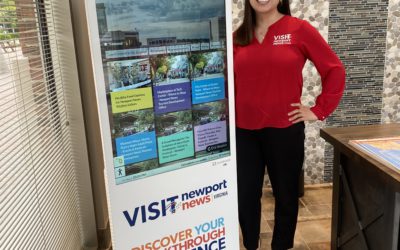
by Mannat Sharma | Destination Marketing
Have you ever thought about the real impact your visitor center has on guests? But are you still relying on outdated...
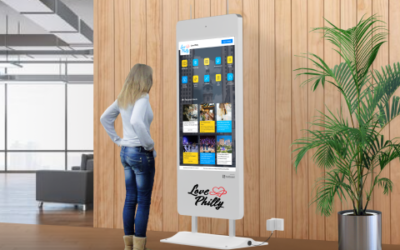
In today’s fast-paced world, public spaces like lobbies play a crucial role in shaping the first impressions of...
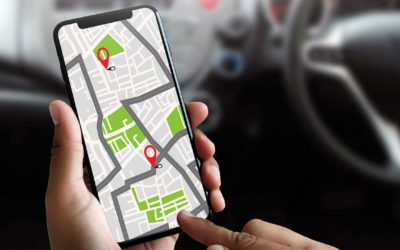
by Bryan Reynolds | Destination Marketing , Digital Signage , Wayfinding
Ever found yourself lost in a large building, desperately searching for an exit or the right room? Indoor wayfinding...
Thank you! Your Download Should Begin Automatically.
Email Address
Organisation
Phone Number
Industry Industry Travel & Tourism Smart City Education Workplaces Industry Agnostic Others
Travel Agency Business Plan Template
Written by Dave Lavinsky
Travel Agency Business Plan
You’ve come to the right place to create your Travel Agency business plan.
We have helped over 10,000 entrepreneurs and business owners create business plans and many have used them to start or grow their travel agencies.
Below is a template to help you create each section of your Travel Agency business plan.
Executive Summary
Business overview.
My Itinerary Travel Agency is a new travel agency located in Boca Raton, Florida. The company is founded by Sandra Rodriguez, an experienced travel agent who has gained valuable knowledge on how to run a travel agency during the past ten years while working at Fun Destinations Travel Agency. Now that Sandra has experienced managing a travel agency, she is ready to start her own company, My Itinerary Travel Agency. Sandra is confident that her organizational and communication skills, combined with her understanding of business management, will enable her to run a profitable travel agency of her own. Sandra is recruiting a team of highly qualified professionals to help manage the day-to-day complexities of running a travel agency – sales and marketing, vendor relationships, customer relationship management, budgeting, and financial reporting.
My Itinerary Travel Agency will provide a full suite of travel planning services for individuals nationwide through its sophisticated online platform and accompanying customer app. My Itinerary Travel Agency will be the go-to travel agency for personalized service, convenience, and expertise of its travel agents. The company will be the ultimate choice for customer service while offering the best travel accommodations available.
Product Offering
The following are the services that My Itinerary Travel Agency will provide:
- Airline travel bookings
- Tour and travel package sales
- Accommodation reservations and bookings
- Cruise bookings
- Car rental reservations
- Travel ticket sales and reservations
- Tour ticket sales and reservations
Customer Focus
My Itinerary Travel Agency will target individuals nationwide who are looking for personalized and convenient travel planning services. The company will target vacationers, tourists, and business travelers who are seeking the best deals on premium accommodations. No matter the customer, My Itinerary Travel Agency will deliver the best communication, service, and the best prices.
Management Team
My Itinerary Travel Agency will be owned and operated by Sandra Rodriguez. Sandra is a graduate of Florida University with a degree in business. She has over ten years of experience working as a travel agent for another local agency. Sandra will be the company’s chief executive officer. She will oversee the travel agency staff, manage customer relationships, and build vendor relationships.
Sandra has recruited sales and marketing expert, Sara Anderson, to be the company’s chief marketing officer and help oversee travel agency’s sales and marketing activities. Sara will handle all branding, marketing, advertising, and outreach for the company. She will also create and maintain the company’s online and social media presence. Sara has a Master’s degree in Marketing and has nearly ten years of experience working as a marketing director for a leading travel industry corporation.
Success Factors
My Itinerary Travel Agency will be able to achieve success by offering the following competitive advantages:
- Skilled team of travel agents combined with the latest technology in the industry will allow the company to provide its clients with personalized service and modern convenience to make planning their trip easy and efficient.
- The members of the leadership team have long standing relationships with a large pool of vendors, allowing them to provide clients with the best deals possible on premium accommodations.
- The company offers a variety of modes of communication to better serve more clients’ preferences. Customers can speak with a travel agent in person, via telephone, video call, email, or chat through the website or app. Support is available 24/7 to ensure all clients’ questions and concerns are promptly attended to.
Financial Highlights
My Itinerary Travel Agency is seeking $290,000 in debt financing to launch its travel agency. The funding will be dedicated towards securing the office space, and purchasing office equipment and supplies. Funding will also be dedicated towards three months of overhead costs to include payroll of the staff and marketing expenses. The breakout of the funding is below:
- Office build-out: $110,000
- Office equipment, supplies, and materials: $70,000
- Three months of overhead expenses (payroll, utilities): $90,000
- Marketing costs: $10,000
- Working capital: $10,000
The following graph below outlines the pro forma financial projections for My Itinerary Travel Agency.
Company Overview
Who is my itinerary travel agency.
My Itinerary Travel Agency is a newly established travel agency in Boca Raton, Florida. My Itinerary Travel Agency will be the first choice for anyone seeking a personalized approach, 24/7 support, and streamlined technology to make trip planning easy. The company will serve customers nationwide from their headquarters in Florida.
My Itinerary Travel Agency will be able to guarantee the best deals possible thanks to the leadership team members’ long standing relationships with a large network of vendors in the hospitality, transportation, and entertainment markets. The company’s team of highly qualified travel agents will provide personalized service to each client, removing the uncertainty and hassles associated with finding and booking the right accommodations.
My Itinerary Travel Agency History
My Itinerary Travel Agency is owned and operated by Sandra Rodriguez, an experienced travel agent who has gained valuable knowledge on how to run a travel agency during the past ten years while working at Fun Destinations Travel Agency. Now that Sandra has experienced managing a travel agency, she is ready to start her own company, My Itinerary Travel Agency. Sandra is confident that her organizational and communication skills, combined with her understanding of business management, will enable her to run a profitable travel agency of her own. Sandra is recruiting a team of highly qualified professionals to help manage the day-to-day complexities of running a travel agency – sales and marketing, vendor relationships, customer relationship management, budgeting, and financial reporting.
Since incorporation, My Itinerary Travel Agency has achieved the following milestones:
- Registered My Itinerary Travel Agency, LLC to transact business in the state of Florida
- Has identified the ideal location for the company’s office and is in the process of securing a lease
- Reached out to numerous contacts to include transportation, hospitality, and entertainment companies to begin securing vendor contracts
- Began recruiting a staff of accountants, travel agents, and other office personnel to work at My Itinerary Travel Agency
My Itinerary Travel Agency Services
- Airline travel comparisons and bookings
Industry Analysis
The U.S. travel agency industry is valued at $48.5B with more than 90,600 businesses in operation and over 318,600 employees nationwide. Factors currently driving industry growth include an increase in domestic tourism and travel for overnight trips, vacations, and business purposes. More domestic travel typically results in more consumers using travel agencies to book their trips. The travel agency industry can be segmented by brick-and-mortar establishments or online businesses. The global market size for the online travel agency segment reached $432B last year and is expected to rise as more people use the internet to book their trips. The travel agency industry relies heavily on the use of technology. Industry operators must stay up-to-date on the latest travel technology in order to remain competitive in the market.
One of the most significant hurdles for travel agency operators is attracting customers in the age of do-it-yourself booking. Now that customers are able to book many of their travel accommodations themselves, travel agents must be able to demonstrate why booking with them is a better option. Some ways industry operators can add value are by providing personalized services, promotional discounts, and helpful information about accommodation options.
Customer Analysis
Demographic profile of target market.
My Itinerary Travel Agency will target individuals nationwide who are looking for personalized and convenient travel planning services. The company will target vacationers, tourists, and business travelers who are seeking the best deals on premium accommodations. No matter the customer, My Itinerary Travel Agency will deliver professional communication, service, and the best prices.
The precise demographics for Boca Raton, Florida are:
| Zip Code: | 78712 | 78718 |
|---|---|---|
| Total Population | 13,059 | 26,896 |
| Male | 52.6% | 48.5% |
| Female | 47.4% | 51.5% |
| 15 to 19 years | 3.6% | 3.6% |
| 20 to 24 years | 61.4% | 62.2% |
| 25 to 29 years | 21.0% | 20.5% |
| 30 to 34 years | 14.0% | 13.7% |
| Household income $50,000 to $74,999 | 1.2% | 2.3% |
| Household income $75,000 to $99,999 | 9.8% | 10.2% |
| Household income $100,000 to $124,999 | 3.6% | 3.2% |
| Household income $125,000 to $149,999 | 10.8% | 8.9% |
| Household income $150,000 to $199,999 | 27.4% | 27.2% |
| Household income $200,000 or more | 47.2% | 49.0% |
Customer Segmentation
My Itinerary Travel Agency will primarily target the following customer profiles:
- Individuals and families planning a vacation
- Business travelers
- Individuals and families in need of accommodations for events such as weddings, reunions, or conventions
Competitive Analysis
Direct and indirect competitors.
My Itinerary Travel Agency will face competition from other companies with similar business profiles. A description of each competitor company is below.
Fun Destinations Travel Agency
Fun Destinations Travel Agency is one of the largest and oldest travel agencies in Florida. The company was founded in 1958 in Boca Raton with one small office location. Now, the company has over 50 locations throughout multiple states. Fun Destinations specializes in booking accommodations for family vacationers. The company books accommodations near key family destinations such as theme parks, resorts, and tourist attractions. Fun Destinations is family owned and operated so the founders are familiar with the hassles associated with planning a family vacation. For this reason, Fun Destinations focuses on booking the best family-friendly accommodations so its clients can relax and enjoy the family fun.
Best Fit Vacations Travel Agency
Best Fit Vacations Travel Agency is a small travel agency catering to Boca Raton locals from its central office and nationwide clients via its online booking platform. The company was established in 1995 with the mission of providing vacation accommodations that will be “the best fit” for every client. Best Fit Vacations is owned and operated by industry professionals that have extensive experience working with vendors to negotiate the best deals for clients. The company strives to get the lowest prices for every booking and regularly finds additional savings and discounts other agencies might not know about.
Trustworthy Travel Agency
Trustworthy Travel Agency is a Boca Raton, Florida-based travel agency that provides superior service to its consumers. The company is able to provide a wide variety of travel accommodation bookings for customers in the area. Trustworthy Travel Agency has three locations throughout the state and operates an online booking platform for nationwide travelers. Customers can book online or over the phone at their convenience. The company uses an algorithm that finds the lowest prices on travel, lodging, and other accommodations across the country.
Competitive Advantage
My Itinerary Travel Agency will be able to offer the following advantages over their competition:
Marketing Plan
Brand & value proposition.
My Itinerary Travel Agency will offer the unique value proposition to its clientele:
- My Itinerary Travel Agency offers the best deals through its extensive vendor network.
- The company offers personalized customer service, a variety of communication modes, and 24/7 support.
Promotions Strategy
The promotions strategy for My Itinerary Travel Agency is as follows:
Social Media Marketing
The company’s chief marketing officer will create accounts on social media platforms such as LinkedIn, Twitter, Instagram, Facebook, TikTok, and YouTube. She will ensure My Itinerary Travel Agency maintains an active social media presence with regular updates and fun content to get customers excited about traveling.
Professional Associations and Networking
My Itinerary Travel Agency will become a member of professional associations such as the Travel Agency Association, American Travel Agents Society, and the Florida Travel Industry Association. The leadership team will focus their networking efforts on expanding the company’s vendor network.
Print Advertising
My Itinerary Travel Agency will invest in professionally designed print ads to display in programs or flyers at industry networking events. The company will also invest in professional ads to place in travel magazines and local publications.
Website/SEO Marketing
My Itinerary Travel Agency’s chief marketing officer will design the company website. The website will be well organized, informative, and list all the services that My Itinerary Travel Agency is able to provide. The website will also list testimonials from happy customers.
The chief marketing officer will also manage My Itinerary Travel Agency’s website presence with SEO marketing tactics so that when someone types in a search engine “best travel agency” or “travel agency near me”, My Itinerary Travel Agency will be listed at the top of the search results.
The pricing of My Itinerary Travel Agency will be on par with (and often lower than) competitors so customers feel they receive value when purchasing the company’s services.
Operations Plan
The following will be the operations plan for My Itinerary Travel Agency.
Operation Functions:
- Sandra Rodriguez will be the chief executive officer for the company. She will oversee the travel agents, vendor relationships, and customer relations. Sandra has spent the past year recruiting the following staff:
- Sara Anderson – chief marketing officer who will oversee all marketing strategies for the company and manage the website, social media, and outreach
- Tom Brown – accountant who will provide all accounting, tax payments, and monthly financial reporting for the company
- Christopher Jones – lead customer support manager who will directly oversee all customer support activities
Milestones:
My Itinerary Travel Agency will have the following milestones complete in the next six months.
12/1/2022 – Finalize contract to lease the office
12/15/2022 – Finalize personnel and staff employment contracts for the My Itinerary Travel Agency management team
1/1/2023 – Begin build-out/renovation of the office, and purchase office equipment and supplies
1/15/2023 – Begin networking at industry events and implement the marketing plan
2/15/2023 – Finalize contracts for initial vendors
3/15/2023 – My Itinerary Travel Agency officially opens for business
Financial Plan Business Plan FAQs
Key revenue & costs.
The revenue drivers for My Itinerary Travel Agency are the commissions earned as a percentage of bookings from vendors and fees charged to customers for consultations and services.
The cost drivers will be the overhead costs required in order to staff a travel agency firm. The expenses will be the payroll cost, utilities, greenhouse equipment and supplies, and marketing materials.
Funding Requirements and Use of Funds
Key assumptions.
The following outlines the key assumptions required in order to achieve the revenue and cost numbers in the financials and in order to pay off the startup business loan.
- Average accommodations booked per month: 9,000
- Average commissions per month: $15,000
- Overhead costs per year: $640,000
Financial Projections
Income statement.
| FY 1 | FY 2 | FY 3 | FY 4 | FY 5 | ||
|---|---|---|---|---|---|---|
| Revenues | ||||||
| Total Revenues | $360,000 | $793,728 | $875,006 | $964,606 | $1,063,382 | |
| Expenses & Costs | ||||||
| Cost of goods sold | $64,800 | $142,871 | $157,501 | $173,629 | $191,409 | |
| Lease | $50,000 | $51,250 | $52,531 | $53,845 | $55,191 | |
| Marketing | $10,000 | $8,000 | $8,000 | $8,000 | $8,000 | |
| Salaries | $157,015 | $214,030 | $235,968 | $247,766 | $260,155 | |
| Initial expenditure | $10,000 | $0 | $0 | $0 | $0 | |
| Total Expenses & Costs | $291,815 | $416,151 | $454,000 | $483,240 | $514,754 | |
| EBITDA | $68,185 | $377,577 | $421,005 | $481,366 | $548,628 | |
| Depreciation | $27,160 | $27,160 | $27,160 | $27,160 | $27,160 | |
| EBIT | $41,025 | $350,417 | $393,845 | $454,206 | $521,468 | |
| Interest | $23,462 | $20,529 | $17,596 | $14,664 | $11,731 | |
| PRETAX INCOME | $17,563 | $329,888 | $376,249 | $439,543 | $509,737 | |
| Net Operating Loss | $0 | $0 | $0 | $0 | $0 | |
| Use of Net Operating Loss | $0 | $0 | $0 | $0 | $0 | |
| Taxable Income | $17,563 | $329,888 | $376,249 | $439,543 | $509,737 | |
| Income Tax Expense | $6,147 | $115,461 | $131,687 | $153,840 | $178,408 | |
| NET INCOME | $11,416 | $214,427 | $244,562 | $285,703 | $331,329 |
Balance Sheet
| FY 1 | FY 2 | FY 3 | FY 4 | FY 5 | ||
|---|---|---|---|---|---|---|
| ASSETS | ||||||
| Cash | $154,257 | $348,760 | $573,195 | $838,550 | $1,149,286 | |
| Accounts receivable | $0 | $0 | $0 | $0 | $0 | |
| Inventory | $30,000 | $33,072 | $36,459 | $40,192 | $44,308 | |
| Total Current Assets | $184,257 | $381,832 | $609,654 | $878,742 | $1,193,594 | |
| Fixed assets | $180,950 | $180,950 | $180,950 | $180,950 | $180,950 | |
| Depreciation | $27,160 | $54,320 | $81,480 | $108,640 | $135,800 | |
| Net fixed assets | $153,790 | $126,630 | $99,470 | $72,310 | $45,150 | |
| TOTAL ASSETS | $338,047 | $508,462 | $709,124 | $951,052 | $1,238,744 | |
| LIABILITIES & EQUITY | ||||||
| Debt | $315,831 | $270,713 | $225,594 | $180,475 | $135,356 | |
| Accounts payable | $10,800 | $11,906 | $13,125 | $14,469 | $15,951 | |
| Total Liability | $326,631 | $282,618 | $238,719 | $194,944 | $151,307 | |
| Share Capital | $0 | $0 | $0 | $0 | $0 | |
| Retained earnings | $11,416 | $225,843 | $470,405 | $756,108 | $1,087,437 | |
| Total Equity | $11,416 | $225,843 | $470,405 | $756,108 | $1,087,437 | |
| TOTAL LIABILITIES & EQUITY | $338,047 | $508,462 | $709,124 | $951,052 | $1,238,744 |
Cash Flow Statement
| FY 1 | FY 2 | FY 3 | FY 4 | FY 5 | ||
|---|---|---|---|---|---|---|
| CASH FLOW FROM OPERATIONS | ||||||
| Net Income (Loss) | $11,416 | $214,427 | $244,562 | $285,703 | $331,329 | |
| Change in working capital | ($19,200) | ($1,966) | ($2,167) | ($2,389) | ($2,634) | |
| Depreciation | $27,160 | $27,160 | $27,160 | $27,160 | $27,160 | |
| Net Cash Flow from Operations | $19,376 | $239,621 | $269,554 | $310,473 | $355,855 | |
| CASH FLOW FROM INVESTMENTS | ||||||
| Investment | ($180,950) | $0 | $0 | $0 | $0 | |
| Net Cash Flow from Investments | ($180,950) | $0 | $0 | $0 | $0 | |
| CASH FLOW FROM FINANCING | ||||||
| Cash from equity | $0 | $0 | $0 | $0 | $0 | |
| Cash from debt | $315,831 | ($45,119) | ($45,119) | ($45,119) | ($45,119) | |
| Net Cash Flow from Financing | $315,831 | ($45,119) | ($45,119) | ($45,119) | ($45,119) | |
| Net Cash Flow | $154,257 | $194,502 | $224,436 | $265,355 | $310,736 | |
| Cash at Beginning of Period | $0 | $154,257 | $348,760 | $573,195 | $838,550 | |
| Cash at End of Period | $154,257 | $348,760 | $573,195 | $838,550 | $1,149,286 |
What Is a Travel Agency Business Plan?
A travel agency business plan is a plan to start and/or grow your travel agency business. Among other things, it outlines your business concept, identifies your target customers, presents your marketing plan and details your financial projections.
You can easily complete your travel agency business plan using our travel agency Business Plan Template here .
What are the Main Types of Travel Agencies?
There are a number of different kinds of travel agencies , some examples include: independent agency, host agency or franchise.
How Do You Get Funding for Your Travel Agent Business Plan?
Travel agencies are often funded through small business loans. Personal savings, credit card financing and angel investors are also popular forms of funding. This is true for a travel agent business plan and a tour and travel business plan.
What are the Steps To Start a Travel Agency Business?
Starting a travel agency business can be an exciting endeavor. Having a clear roadmap of the steps to start a business will help you stay focused on your goals and get started faster.
1. Develop A Travel Agent Business Plan - The first step in starting a business is to create a detailed business plan for your travel agency that outlines all aspects of the venture. This should include potential market size and target customers, the services or products you will offer, pricing strategies and a detailed financial forecast.
2. Choose Your Legal Structure - It's important to select an appropriate legal entity for your travel agency business. This could be a limited liability company (LLC), corporation, partnership, or sole proprietorship. Each type has its own benefits and drawbacks so it’s important to do research and choose wisely so that your travel agency business is in compliance with local laws.
3. Register Your Travel Agency Business - Once you have chosen a legal structure, the next step is to register your travel agency business with the government or state where you’re operating from. This includes obtaining licenses and permits as required by federal, state, and local laws.
4. Identify Financing Options - It’s likely that you’ll need some capital to start your travel agency business, so take some time to identify what financing options are available such as bank loans, investor funding, grants, or crowdfunding platforms.
5. Choose a Location - Whether you plan on operating out of a physical location or not, you should always have an idea of where you’ll be based should it become necessary in the future as well as what kind of space would be suitable for your operations.
6. Hire Employees - There are several ways to find qualified employees including job boards like LinkedIn or Indeed as well as hiring agencies if needed – depending on what type of employees you need it might also be more effective to reach out directly through networking events.
7. Acquire Necessary Travel Agency Equipment & Supplies - In order to start your travel agency business, you'll need to purchase all of the necessary equipment and supplies to run a successful operation.
8. Market & Promote Your Business - Once you have all the necessary pieces in place, it’s time to start promoting and marketing your travel agency business. This includes creating a website, utilizing social media platforms like Facebook or Twitter, and having an effective Search Engine Optimization (SEO) strategy. You should also consider traditional marketing techniques such as radio or print advertising.
Learn more about how to start a successful travel agency business:
- How to Start a Travel Agency Business

How To Start A Tourism Business: Actionable Insights For 2021 & Beyond
- Business Management
Are you researching how to start a tourism business?
Since COVID, there are considerations that didn’t exist previously for travel businesses looking to enter the market. For example, you will have to put careful thought into how you approach safety, insurance, branding, and marketing for your company.
To take some of the unknown out of the process, we have gathered some helpful insights for you. As with any start-up, there are many moving parts to bring together before you reach the point of lift-off.
Overall, you need to have a clear strategy, a good business idea, and be willing to put in the work.

How To Start A Tourism Business: Step-By-Step Instructions
1. formulate a plan for your business.
First, you need to develop a clear business plan .
Before setting the entity up, you’ll need a concise vision and understanding of what the business will look like and the direction it is going in. Here are some important aspects to cover:
Consider Your Unique Selling Proposition (USP)
Why will people sign-up with your company? What makes you great and stands you out from the competition? Is there something that you are going to do differently that travelers should know about?
Consider the answers to these questions and proudly claim them in your marketing materials to attract your ideal customers.
Mull Over Your Target Audience
You have a passion that is driving you to start a travel business.
It's this passion that is going to shine through and attract your ideal clients. Walk in knowing precisely who these clients are and what drives them to you, in particular.
From there, you can work on creating marketing messaging to reach them and draw them to your company.
Design Your Tours For Post COVID-19 Travel

As we emerge from the pandemic, safety while traveling will be top of mind for your clients.
Reconnection is going to be another aspect that travelers will be chasing. After months apart, there is lost time with family and friends to make up for.
When designing your tours, keep these two factors top of mind. Travelers will want reassurance that they can travel with peace of mind while having a great experience with their loved ones. As a travel company or tour operator, they will be looking to your expertise to guide them through the unknown terrain of traveling post-COVID.
Work Out Details For The Day-To-Day Operations
It’s essential to figure out the small print around how you will operate day-to-day.
Establish things like your operating hours, who you need to appoint to your team, and where you will work from. Also, consider your asset and equipment requirements and when and how you plan to go to market.
Estimate Your Costs
Naturally, you want your operation to be viable so that you can make a living off doing what you love. To get an idea of where you will be money-wise, you need to draw up a financial plan.

Work out exactly what your business costs will be. Keep in mind that you might have start-up and day-to-day running expenses, as well as costs related to suppliers and vendors once you're operating.
With this information, you can establish how much you need to charge clients for your service or offering.
Take a minute to check whether this is relative to what your competitors charge and suited to the market you are targeting?
As you will likely have start-up costs initially, you may not make a profit right away. See if you can put a number on how many tours or how much revenue it will take to get you to this point. Make a note of this and allow a little wiggle room for the unexpected.
2. Sort Out The Legal Stuff
The next big step in how to start a tourism business is to set up your operation to trade legally.
Register Your Business
First, you need to pin down a name and register your company.
Some of the different legal business structures include sole proprietors, partnerships, limited liability companies (LLC), and corporations. Select a suitable one based on your expected annual turnover, whether you are operating alone or with a partner, and whether you wish to carry liability personally.
Open A Bank Account

Open up a dedicated company bank account so that you can keep your personal and business finances separate.
Complete Your Tax Registration
The next step is to register your business for state and federal tax.
The type of taxes and date you’re liable to pay will depend on what legal entity you operate as. Business tax returns can get pretty complicated. So, it’s a good idea to appoint a professional tax practitioner who can ensure that you are registered correctly and prepare your returns.
Get Liability Insurance
All companies face unknown risks. To operate legally, lawfully, and safely, you need to get liability insurance at a minimum. This will protect you in the case a guest or employee has an accident.
Other insurance types to look into include Workman’s Compensation, Accounts Receivable, Property, and Errors and Omissions insurance.
Apply For Your Local Permits and Licenses
Depending on what kind of company you are starting, you may need local permits or licenses to operate, for example, a tour operator license.
Check in with your local tourism body or nearest government office to see what the requirements are.
Note that these can differ from state to state, so if you work in a state other than the one you are registered in, you may need to factor this into the equation too.

3. Develop Your Branding and Marketing
When researching how to start a tourism business, you’ll hear how critical it is to establish a brand image. It should represent who you are and speak to your audience.
On top of that, you need a clear marketing strategy to grow your customer base and get your brand online. Some of the first things to focus on are to:
- Put up a website
- Sign up to a bookings and payment platform provider, like WeTravel
- Design a company logo
- Start an online blog
- Set up social media accounts
- Claim your Google My Business profile
- Create profiles on review platforms
- Sign up with OTAs, travel agents, or vendor partners
- List on local directories
From there, it helps to know how to really sell your tours . Also, take a look at how your competitors market and sell their products. You can use the information to do even better.
4. Get The Right Tools, Technology, Team, and Equipment
Before you launch your business, be fully prepared with everything you need on the ground and to make things happen behind the scenes.

We’ve just mentioned some of the most important digital and technological considerations, including having a website, payment platform, social media accounts, and more.
Of course, you need computers, phones, and to furnish an office. You’ll need software and apps, like social media management or remote working tools.
You might also require equipment to host your tours or carry out your service, such as vehicles, radios, bicycles, and so on.
The last thing here is to hire a top-notch team. The people who work for you make or break your client experience, so choose them wisely.
5. Square Up Your Accounting
Finally, put your accounting systems in place. Keeping track of finances is vital to your business’s success, so having a formal process from the get-go is a must.
You’re Now Ready To Launch
From your research on how to start a tourism business, you'll know that it's no easy feat. But, after running through the points above, you’re now ready to launch and set up for success. Congratulations and good luck; let the real work begin.
Are you interested in finding out more about WeTravel’s booking and payment platform for your business? Watch the short clip below, or get in touch with us for a demo .
New resources, straight to your inbox
We’re committed to your privacy. WeTravel uses the information you provide to us to contact you about our relevant content, products, and services. You may unsubscribe at any time.
About the author

Related Posts
How to improve your tour operator website and get more bookings, best online travel marketplaces to promote your tours, tips and tricks: things to consider before you embark on an adventure.
Your Passport to Success: A Comprehensive Guide to Launching a Tourism Business
- Published: July 13, 2023
- By: Yellowbrick
Setting foot into the vast landscape of the tourism industry might seem like attempting to scale Mount Everest. However , bear in mind , just like any mountain , t his behemoth can be conquered step by step . Wrapped in this guide is your trusty sherpa, ready to guide you through the precipitous path of launching a tourism business. Brace yourself for an exhilarating expedition, interspersed with pearls of wisdom, as we unfold the blueprint for your entrepreneurial success.
Resting on our laurels isn’t an option when there’s an entire landscape to be explored. The tourism industry, much like an uncharted terrain, necessitates a thorough exploration. Having a comprehensive game plan will prevent you from losing your bearings amid the wilderness . So, fasten your seatbelts and put on your thinking caps; it’s time to traverse the exciting topography of creating a successful tourism business.
Spotting the Opportunity
In the buzzing beehive of business , identifying a distinctive honeycomb – or rather , a unique opportunity – is the cornerstone of entrepreneurial success . Now, don’t get caught with your pants down thinking it’s a cakewalk; it demands a discerning eye for detail and a pulse on what consumers are hankering for. Initiate your quest by examining your surroundings. What seems absent? What exclusive offering can you bring to the table that others haven’t?
Once the spark of an idea ignites, it’s crucial to fan its flames to ensure its sustainability . The flash-in-the-pan ideas might create an initial buzz but they’re like shooting stars, fading away as quickly as they appear. To avoid this pitfall, conduct an in-depth market validation. It’s akin to checking the depth of the river before taking the plunge – you wouldn’t want your business to flounder due to a lack of demand . So, roll up your sleeves and dive headfirst into market research to substantiate your idea’s feasibility.
Carving Your Unique Niche
Now that you’ve got a winning idea in your arsenal, it’s time to etch out your unique niche . While it’s easy to get lost in the crowd in an industry as broad as tourism, having a distinct identity can help your venture stand out. It’s about not just being another face in the crowd , but the one that turns heads and commands attention .
Tailoring a unique business proposition is like threading a needle – it requires precision and a clear understanding of what you’re capable of delivering. Consider your strengths and how they can be leveraged to provide a unique experience for your customers. Remember, t he aim is to create a service that’s as unique as a fingerprint , an offering that’s distinctly yours and resonates with your target audience . This is your golden ticket to carve out a successful space in the tourism industry.
Constructing a Comprehensive Business Plan
A solid business plan is akin to a well-crafted blueprint ; it lays down a firm foundation and guides your venture’s growth. Think of it as the ‘master plan,’ containing the DNA of your business – everything from your mission and objectives to financial forecasts and marketing strategies.
First off, you’ll need to define your business model . In other words, decide how you’ll earn your bread and butter. Will you focus on luxury travel, budget packages, adventure tourism, or cultural experiences? Furthermore, pin down your target audience . Who will be lining up to avail of your services? Young globetrotters, retired explorers, corporate clients, or thrill-seekers? Understanding your clientele is half the battle won.
Arranging the Financial Framework
Finance is the lifeblood of any business. Ensuring you have your ducks in a row when it comes to funding is absolutely vital . Whether you’re bootstrapping, seeking investors, or applying for loans, having a robust financial plan is crucial.
Start by determining your startup costs – the price tag for getting your venture off the ground. Then, l ay out a clear projection of your revenue and expenses for the first few years . By doing so, you’re not just shooting in the dark but are well-prepared for the financial challenges ahead. Remember, it’s always better to be safe than sorry.
Jumping Through Legal Hoops
The legal aspect of setting up a business might seem like a minefield, but don’t fret. It’s simply about understanding what’s required and ensuring all the t’s are crossed and the i’s are dotted. You’ll need to select a business structure , r egister your business name , and obtain necessary licenses and permits .
While it might seem like you’re climbing a legal mountain, taking it one step at a time can make it manageable. It’s worth considering seeking professional help to navigate this complex terrain. A misstep here could cost you heavily, so proceed with caution.
Crafting a Magnetic Brand
Creating a compelling brand is akin to crafting a magnet ; it should attract your target audience and resonate with them on a deeper level. Your brand is more than just a logo or a tagline; it’s the embodiment of your business’s personality, values, and promises.
To create a brand that turns heads, you must understand what makes your business tick . What’s your story? What are your core values? How do you want to be perceived by your audience? By answering these questions, you can shape a brand that is both authentic and appealing.
Building a Strong Online Presence
In the digital age, having an online presence is not a luxury but a necessity . It’s like your open-for-business sign that’s visible globally. A captivating website, active social media profiles, and a strategic SEO plan are vital components of your online presence.
A website is your digital storefront , and social media platforms are your public forums . They offer an opportunity to engage with your audience, showcase your services, and build trust. On the other hand, SEO can help your business get discovered by potential customers. It’s like having a well-lit billboard on the internet highway.
Launching and Marketing Your Venture
Finally, it’s time for the curtain-raiser – the launch of your venture . However, simply opening your doors won’t get the cash registers ringing; you’ll need a robust marketing strategy to put your business on the map .
A successful marketing plan isn’t just about big-budget advertising campaigns. It’s about identifying the most effective channels to reach your audience, creating engaging content, and fostering relationships with your customers. Remember, word of mouth is a powerful tool in the tourism industry . A satisfied customer can be your most effective marketing agent.
Splash Your Unique Colors Onto the Vast Canvas of the Tourism Industry
Embarking on the trail of the tourism business, as you’ve journeyed through this guide, is undoubtedly more marathon than sprint. Yet, w ith the perfect blend of preparation , vision , and undying tenacity , this intricate maze can be traversed to emerge as a beacon of entrepreneurial success . This guide has endeavored to be your trusty torchbearer, illuminating the vital steps to morph your fledgling business idea from an abstract thought to a concrete, profitable venture.
From identifying golden opportunities to that euphoric moment of launching your venture, it’s paramount to remember: the journey carves the entrepreneur just as much as the destination . It’s the blend of grit, the relentless grind, those fleeting moments of despair punctuated by exhilarating peaks of triumph, that crafts the entrepreneurial spirit.
But here’s the best part: your journey doesn’t have to end with this guide . Oh, no. Picture this; an opportunity to splash your unique colors onto the vast canvas of the tourism industry, guided by expert hands. Exciting, right? Well, that’s not just a dream anymore.
Cue the drumroll, please… Enter the world of tourism from the comfort of your living room. Yes, you read that right! In this era of high-speed digital connectivity, your journey of learning and discovery is just beginning.
A treasure trove of knowledge and expertise lies within your reach, awaiting exploration. We’re talking about navigating unique paths in the tourism sector, all without leaving your home. It’s a game-changer!
To top it off, Yellowbrick , in collaboration with the renowned New York University ( NYU ), presents an online Hospitality and Tourism Industry Essentials Course . Guided by seasoned faculty from NYU and industry insiders, this program is designed to steer you through the winding corridors of establishing a successful tourism business.
This all-encompassing program, delivered entirely online, dives deep into the ocean of the hospitality and tourism industry. The program features six online course modules , with each course taking approximately 3-5 hours. It’s thoughtfully broken down into digestible lessons that students can complete at their own pace. The cherry on top? A non-credit certificate of completion from the globally-recognized NYU to amplify your professional portfolio upon successful completion .
With this guide as your compass and the opportunity to enroll in an insightful online course, you’re primed to carve your path to success in the tourism industry. It’s an exciting vista waiting to be adorned with your unique imprint.
So, what are you waiting for? The clock is ticking , and the stage is set for you to dive in and bring your dream tourism business to life . Remember, the essence of success lies not just in reaching the summit but in relishing the climb and embracing growth. So, here’s to your future success as a thriving tourism tycoon. Godspeed!
Enter your email to learn more and get a full course catalog!
- Hidden hide names
- Hidden First Name
- Hidden Last Name
- Phone This field is for validation purposes and should be left unchanged.
More from Yellowbrick

Yellowbrick Recognized as Top EdTech Company in North America by TIME and Statista
We are thrilled to announce that Yellowbrick has been named the leading EdTech company in North America and sixth globally in the prestigious “World’s Top

How to Become a Film Festival Programmer: Tips and Insights
Discover how to become a film festival programmer. Learn the essential skills, networking tips, and steps to break into this exciting cinema industry.

Fashion & Architecture: Exploring the Influence in Design
Explore how architecture shapes fashion from structural designs to materials, colors, and sustainability. Immerse in the intersection of these creative realms.
ABOUT YELLOWBRICK
- Work at Yellowbrick
- Privacy Policy
- Terms of Use
STUDENT RESOURCES
- Scholarships
- Student Login
- Beauty Business Essentials
- Beauty Industry Essentials
- Ecommerce Essentials
- Fashion Business Essentials
- Fashion Industry Essentials
- Footwear Business Essentials
- Gaming & Esports Industry Essentials
- Global Sports Management
- Hospitality Industry Essentials
- Music Industry Essentials
- Performing Arts Industry Essentials
- Product Design Essentials
- Sneaker Essentials
- Streetwear Essentials
- TV/Film Industry Essentials
- UX Design Essentials
©2024 Yellowbrick · All Rights Reserved · All Logos & Trademarks Belong to Their Respective Owners
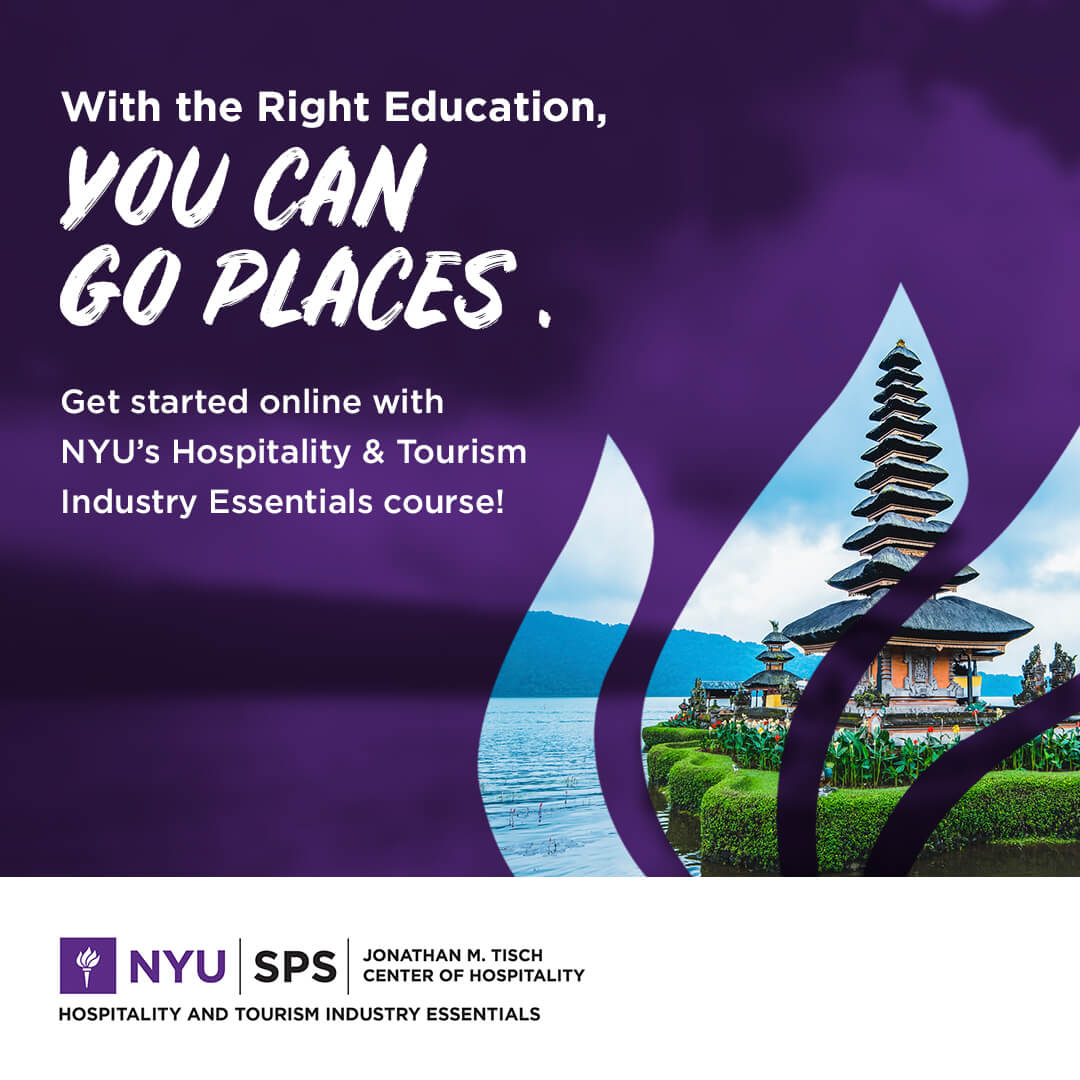
- Comments This field is for validation purposes and should be left unchanged.

Travel Agency Business Plan Template
Written by Dave Lavinsky

Over the past 20+ years, we have helped over 10,000 entrepreneurs and business owners create business plans to start and grow their travel agencies. On this page, we will first give you some background information with regards to the importance of business planning. We will then go through a travel agency business plan template step-by-step so you can create your plan today.
Download our Ultimate Business Plan Template here >
What is a Travel Agency Business Plan?
A business plan provides a snapshot of your travel agency as it stands today, and lays out your growth plan for the next five years. It explains your business goals and your strategy for reaching them. It also includes market research to support your plans.
Why You Need a Business Plan for a Travel Agency
If you’re looking to start a travel agency or grow your existing travel agency you need a business plan. A business plan will help you raise funding, if needed, and plan out the growth of your travel agency in order to improve your chances of success. Your travel agency business plan is a living document that should be updated annually as your company grows and changes.
Source of Funding for Travel Agencies
With regards to funding, the main sources of funding for a travel agency are personal savings, credit cards, bank loans and angel investors. With regards to bank loans, banks will want to review your business plan and gain confidence that you will be able to repay your loan and interest. To acquire this confidence, the loan officer will not only want to confirm that your financials are reasonable. But they will want to see a professional plan. Such a plan will give them the confidence that you can successfully and professionally operate a business.
The second most common form of funding for a travel agency is angel investors. Angel investors are wealthy individuals who will write you a check. They will either take equity in return for their funding, or, like a bank, they will give you a loan.
Finish Your Business Plan Today!
Your travel agency business plan should include 10 sections as follows:
Executive Summary
Your executive summary provides an introduction to your business plan, but it is normally the last section you write because it provides a summary of each key section of your plan.
The goal of your Executive Summary is to quickly engage the reader. Explain to them the type of travel agency business you are operating and the status; for example, are you a startup, do you have a travel agency that you would like to grow, or are you operating a chain of travel agencies.
Next, provide an overview of each of the subsequent sections of your plan. For example, give a brief overview of the travel agency industry. Discuss the type of travel agency you are operating. Detail your direct competitors. Give an overview of your target customers. Provide a snapshot of your marketing plan. Identify the key members of your team. And offer an overview of your financial plan.
Company Analysis
In your company analysis, you will detail the type of travel agency you are operating.
For example, you might operate one of the following types:
- Commercial Travel Agencies : this type of travel agency caters to business travelers. These agencies specialize in tracking down deals for business travelers to help companies manage travel costs.
- Online Travel Agencies : this type of travel agency exists only in cyberspace. They provide clients with the convenience of online booking and discounts that are available only to professional travel agencies.
- Niche Travel Agencies : this type of travel agency provides clients with specialized knowledge of a region.
- Membership Associations : Memberships associations give travelers access to the organization’s travel planning services for the cost of an annual membership rather than charging per transaction. This type of agency offers the most benefit to frequent travelers.
In addition to explaining the type of travel agency you operate, the Company Analysis section of your business plan needs to provide background on the business.
Include answers to question such as:
- When and why did you start the business?
- What milestones have you achieved to date? Milestones could include sales goals you’ve reached, new location openings, etc.
- Your legal structure. Are you incorporated as an S-Corp? An LLC? A sole proprietorship? Explain your legal structure here.
Industry Analysis
In your industry analysis, you need to provide an overview of the travel agency business.
While this may seem unnecessary, it serves multiple purposes.
First, researching the travel agency industry educates you. It helps you understand the market in which you are operating.
Secondly, market research can improve your strategy particularly if your research identifies market trends. For example, if there was a trend towards glamping, it would be helpful to ensure your plan calls for plenty of luxury camping packages.
The third reason for market research is to prove to readers that you are an expert in your industry. By conducting the research and presenting it in your plan, you achieve just that.
The following questions should be answered in the industry analysis section of your travel agency business plan:
- How big is the travel agency business (in dollars)?
- Is the market declining or increasing?
- Who are the key competitors in the market?
- Who are the key suppliers in the market?
- What trends are affecting the industry?
- What is the industry’s growth forecast over the next 5 – 10 years?
- What is the relevant market size? That is, how big is the potential market for your travel agency. You can extrapolate such a figure by assessing the size of the market in the entire country and then applying that figure to your local population.
Customer Analysis
The customer analysis section of your travel agency business plan must detail the customers you serve and/or expect to serve.
The following are examples of customer segments: sports enthusiasts, soccer moms, baby boomers, businesses, etc.
As you can imagine, the customer segment(s) you choose will have a great impact on the type of travel agency you operate. Clearly baby boomers would want a different atmosphere, pricing and product options, and would respond to different marketing promotions than businesses.
Try to break out your target customers in terms of their demographic and psychographic profiles. With regards to demographics, include a discussion of the ages, genders, locations and income levels of the customers you seek to serve. Because most travel agencies primarily serve customers living in their same city or town, such demographic information is easy to find on government websites.
Psychographic profiles explain the wants and needs of your target customers. The more you can understand and define these needs, the better you will do in attracting and retaining your customers.
Finish Your Travel Agency Business Plan in 1 Day!
Don’t you wish there was a faster, easier way to finish your business plan?
With Growthink’s Ultimate Business Plan Template you can finish your plan in just 8 hours or less!
Competitive Analysis
Your competitive analysis should identify the indirect and direct competitors your business faces and then focus on the latter.
Direct competitors are other travel agencies.
Indirect competitors are other options that customers have to purchase from that aren’t direct competitors. This includes customers making travel arrangements themselves at home. You need to mention such competition to show you understand that not everyone who travels uses travel agency services.
With regards to direct competition, you want to detail the other travel agencies with which you compete. Most likely, your direct competitors will be travel agencies located very close to your location.
For each such competitor, provide an overview of their businesses and document their strengths and weaknesses. Unless you once worked at your competitors’ businesses, it will be impossible to know everything about them. But you should be able to find out key things about them such as:
- What types of customers do they serve?
- What products do they offer?
- What is their pricing (premium, low, etc.)?
- What are they good at?
- What are their weaknesses?
With regards to the last two questions, think about your answers from the customers’ perspective. And don’t be afraid to ask your competitors’ customers what they like most and least about them.
The final part of your competitive analysis section is to document your areas of competitive advantage. For example:
- Will you provide better travel packages?
- Will you provide products or services that your competitors don’t offer?
- Will you make it easier or faster for customers to book your offerings?
- Will you provide better customer service?
- Will you offer better pricing?
Think about ways you will outperform your competition and document them in this section of your plan.
Marketing Plan
Traditionally, a marketing plan includes the four P’s: Product, Price, Place, and Promotion. For a travel agency business plan, your marketing plan should include the following:
Product : in the product section you should reiterate the type of travel agency that you documented in your Company Analysis. Then, detail the specific products you will be offering. For example, in addition to regular accommodation and transportation booking, will you offer items such as tour packages and excursions?
Price : Document the prices you will offer and how they compare to your competitors. Essentially in the product and price sub-sections of your marketing plan, you are presenting the packages you offer and their prices.
Place : Place refers to the location of your travel agency. Document your location and mention how the location will impact your success. For example, is your travel agency located next to a heavily populated office building, or highly trafficked retail area, etc. Discuss how your location might provide a steady stream of customers.
Promotions : the final part of your travel agency marketing plan is the promotions section. Here you will document how you will drive customers to your location(s). The following are some promotional methods you might consider:
- Making your travel agency’s storefront extra appealing to attract passing customers
- Distributing travel brochures outside the travel agency
- Advertising in local papers and magazines
- Reaching out to local bloggers and websites
- Social media advertising
- Local radio advertising
- Banner ads at local venues
Operations Plan
While the earlier sections of your business plan explained your goals, your operations plan describes how you will meet them. Your operations plan should have two distinct sections as follows.
Everyday short-term processes include all of the tasks involved in running your travel agency such as serving customers, procuring supplies, keeping the office clean, etc.
Long-term goals are the milestones you hope to achieve. These could include the dates when you expect to serve your 1,000th customer, or when you hope to reach $X in sales. It could also be when you expect to hire your Xth employee or launch a new location.
Management Team
To demonstrate your travel agency’s ability to succeed as a business, a strong management team is essential. Highlight your key players’ backgrounds, emphasizing those skills and experiences that prove their ability to grow a company.
Ideally you and/or your team members have direct experience in the travel agency business. If so, highlight this experience and expertise. But also highlight any experience that you think will help your business succeed.
If your team is lacking, consider assembling an advisory board. An advisory board would include 2 to 8 individuals who would act like mentors to your business. They would help answer questions and provide strategic guidance. If needed, look for advisory board members with experience in travel agencies and/or successfully running retail and small businesses.
Financial Plan
Your financial plan should include your 5-year financial statement broken out both monthly or quarterly for the first year and then annually. Your financial statements include your income statement, balance sheet and cash flow statements.
Income Statement : an income statement is more commonly called a Profit and Loss statement or P&L. It shows your revenues and then subtracts your costs to show whether you turned a profit or not.
In developing your income statement, you need to devise assumptions. For example, will you serve 50 customers per week or 100? And will sales grow by 2% or 10% per year? As you can imagine, your choice of assumptions will greatly impact the financial forecasts for your business. As much as possible, conduct research to try to root your assumptions in reality.
Balance Sheets : While balance sheets include much information, to simplify them to the key items you need to know about, balance sheets show your assets and liabilities. For instance, if you spend $100,000 on building out your travel agency, that will not give you immediate profits. Rather it is an asset that will hopefully help you generate profits for years to come. Likewise, if a bank writes you a check for $100.000, you don’t need to pay it back immediately. Rather, that is a liability you will pay back over time.
Cash Flow Statement : Your cash flow statement will help determine how much money you need to start or grow your business, and make sure you never run out of money. What most entrepreneurs and business owners don’t realize is that you can turn a profit but run out of money and go bankrupt.
In developing your Income Statement and Balance Sheets be sure to include several of the key costs needed in starting or growing a travel agency:
- Location build-out including design fees, construction, etc.
- Cost of equipment like computers, website/platform, and software
- Cost of marketing materials and maintaining an adequate amount of supplies
- Payroll or salaries paid to staff
- Business insurance
- Taxes and permits
- Legal expenses
Attach your full financial projections in the appendix of your plan along with any supporting documents that make your plan more compelling. For example, you might include your store design blueprint or location lease.
Travel Agency Business Plan Summary
Putting together a business plan for your travel agency is a worthwhile endeavor. If you follow the template above, by the time you are done, you will truly be an expert. You will really understand the travel agency business, your competition and your customers. You will have developed a marketing plan and will really understand what it takes to launch and grow a successful travel agency.
Travel Agency Business Plan FAQs
What is the easiest way to complete my travel agency business plan.
Growthink's Ultimate Business Plan Template allows you to quickly and easily complete your Travel Agency Business Plan.
Where Can I Download a Travel Agent Business Plan PDF?
You can download our travel agent business plan PDF template here. This is a business plan template you can use in PDF format.
What is the Goal of a Business Plan's Executive Summary?
Don’t you wish there was a faster, easier way to finish your Travel Agency business plan?
OR, Let Us Develop Your Plan For You
Since 1999, Growthink has developed business plans for thousands of companies who have gone on to achieve tremendous success.
Click here to see how Growthink’s business plan consulting services can create your business plan for you.
Other Helpful Business Plan Articles & Templates

- Sample Business Plans
- Transportation, Logistics & Travel
Travel Agency Business Plan

Are you a travel enthusiast and want to establish your own travel agency?
Well, if yes, then it’s an exhilarating journey of stepping into a world brimming with adventure and discovery.
But in the midst of this excitement, it’s necessary to lay the groundwork for a successful business out of a hobby. It demands a strategic roadmap – writing a proper travel agency business plan .
So, our travel agency business plan serves as the compass that directs you through all the intricacies of the industry and helps you pay attention to every detail of the business plan.
As you delve into this step-by-step guide, you can explore how to write your own business plan that sets the stage for sustainable growth and leaves a mark on potential investors or readers.
Without further ado; let’s dive into the art of crafting your travel agency business plan.
Key Takeaways
- Create a compelling executive summary for your travel agency’s identity, vision, mission statement, and core values.
- Showcase your business goals, market opportunities, and marketing plan to attract potential investors or partners.
- Highlight the range of travel services you’ll provide, including specialized offerings that place your agency ahead of competitors.
- Give valuable insights into everyday business operations, from booking management to customer service protocols.
- Provide a detailed financial plan to illustrate a clear understanding of your travel agency’s financial health and expected growth trajectory.
- Thoroughly analyze the industry and competitive landscape to uncover the latest trends and customer preferences.
- Utilize modern and cost-effective business plan software for writing and maintaining business plans.
Why do you need a travel agency business plan?
In reality, every established or emerging business requires a well-written business plan. It is not just a document; it’s a strategic blueprint, offering you a roadmap to make informed business decisions.So, starting your travel agency business greatly benefits from having a well-thought-out business plan like any other business.
Attracting Investors
Whether you’re looking to secure a loan or attract potential investors, a detailed business plan is truly helpful. It shows your agency’s capital cost & revenue potential and summarizes the profitability for angel investors.
Strategic Direction
An actionable plan provides a comprehensive view of your travel agency’s goals, offered services, and strategic steps you will take to achieve success. Also, it indicates a thorough understanding of your target audience and top competitors.
Risk Mitigation
Drafting a professional business plan serves as a foundation for a successful business and helps you identify potential risks & challenges in the market. Through careful planning, you can create effective strategies to overcome obstacles.
Operational Guidance
A well-crafted business plan offers an internal guide that ensures your team understands and aligns with the overarching business objectives, encouraging a cohesive and immersed work environment.
Now, let’s move forward to write a successful business plan for a travel agency.
How to write a business plan for a travel agency?
1. get a business plan template.
Before you start writing a travel agency business plan, it’s highly advisable to get a business plan template first!
It’s like having a valuable toolkit for your business planning endeavors. It not only streamlines the business plan writing but also ensures that you describe all the essential sections.
It offers a structured framework that helps you organize your thoughts effectively to draft a strategically sound business document according to your specific needs and preferences.
Beyond that, a quality business plan template lays the foundation for a comprehensive, professional business plan that highlights your business idea and vision to attract potential investors.
If you’re in search of a polished template, consider Upmetrics’ sample business plan template and ensure that you won’t overlook any essential points in your plan.

Free Business Plan Template
Download our free travel agency business plan template now and pave the way to success. Let’s turn your vision into an actionable strategy!
- Fill in the blanks – Outline
- Financial Tables
2. Draft an Executive Summary
An executive summary is the first and foremost section of any business plan. It offers a quick overview of your entire travel agency business plan.
If your first few pages are compelling enough, potential investors or loan officers will find the document intriguing and delve further into your plan.
Your executive summary should be clear, concise, and engaging if you’re looking for investors or loan sanctions, as it will grab their attention and make a strong impression.
To draft an effective summary, start with a concise description of your travel agency business, covering its name, concept, location, objectives, and unique aspects. Refer to the below example:
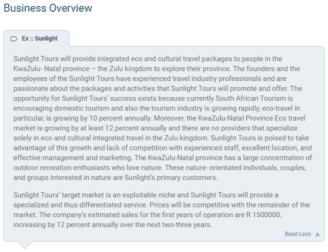
Next, explain what sets you apart and share insights about your service offerings, target market, and ideal customer base. Also, highlight marketing materials, current trends, and potential growth opportunities.
Lastly, give a summary of critical financial figures in terms of projected revenues, profits, and cash flows for the initial 3-5 years. From that, you can address funding needs and resources.
A business plan is a professional, living document that you should update regularly to reflect changes in your business.
3. Provide a Company Overview
Now, it’s time to draft a company overview section that provides a more detailed description of your travel agency.
It could be commercial travel agencies or online travel agencies. Share your agency’s founding story and the individuals behind its inception.
Try to explain your business legal structure(S-Corp, Limited Liability Company, or sole proprietorship), and describe the physical location of your travel agency.
Subsequently, highlight your vision and mission statement in this section to define your identity and core values. This serves as a brand story that your customers can connect to.
Take reference from the below example describing the mission statement of the travel agency:
- Internally we intend to create and nurture a healthy, exuberant, respectful, and enjoyable environment, in which our employees are fairly compensated and encouraged to respect the customer and the quality of the service we intend to provide.
- In addition, follow-up will be mandatory to ensure customer satisfaction and make any improvements as recommended by the customers in the future.
- We seek fair and responsible profit, enough to keep the company financially healthy for the short and long term and to fairly remunerate employees for their work and effort.
Discuss a little bit more about your business background information and how your travel agency works. Try to give answers for when you start your business and how you have set your office space.
In addition, highlight any milestones you have accomplished, such as the number of clients served, positive reviews, new travel agency openings, etc.
4. Conduct an Industry and Market Analysis
An industry and market analysis section is one of the most important ones in your travel agent business plan. It explores your specific niche within the industry and the geographic background where you wish to operate.
So, take some time to go further and find more accurate information, such as who are your target customers & top competitors, what are the current trends, and whether the tourism market is increasing or decreasing.
Market Size and Growth Potential
Conduct a complete market analysis to study the market size and explore growth potential areas for travel agencies. Assess the total revenue generated within the travel industry and identify the emerging trends.
Customer Analysis
Examine your target market in detail, including demographics, travel behaviors, and customer preferences. Understand your ideal clients and tailor your services to satisfy their specific needs.
Do thorough customer research and understand how your target audience plans and experiences trips. This can help better customize packages and offerings to meet your clients’ needs.
Want help writing a target customer segmentation for your travel agency business? Use Upmetrics AI writing assistant now and easily draft your business plan sections:
Competitor Analysis
As a travel agent, assemble a list of direct and indirect competitors in the travel agency industry. You can consider both classic brick-and-mortar travel agencies and online travel agencies.
Evaluate the strengths and weaknesses of each competitor, including service offerings, tour packages & quality, customer reviews, and marketing strategies.
Understanding these competitor factors will help you determine areas where your travel agency can differentiate itself and stand out in the competitive landscape.
Execute a SWOT analysis to find internal strengths & weaknesses of your travel company and external opportunities & threats in the travel industry.
Take reference from the below example showing a SWOT analysis for an XYZ travel agency business:
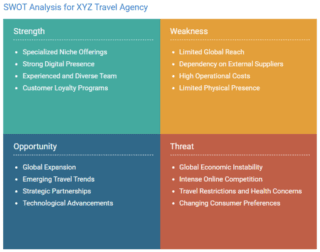
Based on SWOT analysis, formulate strategies to capitalize on opportunities and mitigate threats to outline competitive advantage.
Some extra tips for drafting this section of your travel company business plan:
- Use reputable sources to gather data, including industry reports, market research studies, and surveys.
- Be specific and provide detailed info wherever possible.
- Include charts and graphs to demonstrate your key points.
- Keep your target audience in mind while documenting the business plan.
5. Propose Your Service Offerings
Next, define the scope of your service offerings and clarify how they meet the diverse needs of your clients.
It must be informative, precise, and client-focused, as it is a detailed breakdown of different services that your travel company offers your customers.
As a travel agency, detail your service offerings, such as bookings, accommodations, vacation packages, international/domestic trips, custom-made business trips, or any cruise bookings.
Effectively disseminate your travel services with a detailed description of what it entails, service specifications, precise pricing plans, or any client reviews.
Here, you can take a reference from the below example to illustrate travel agency services:
1 . Guided Tours
Our guided tours are led by knowledgeable local guides who provide valuable insights into the culture and history of each destination.
Price: Varies by destination, starting at [$50] per person
Specifications: Group sizes are limited to 15 people, and tours typically last 2-3 hours.
2. Accommodation Booking
We offer a range of accommodation options, from luxury hotels to charming bed and breakfasts, ensuring our clients have a comfortable stay.
Price: Varies by location and accommodation type, starting at [$100] per night
Specifications: Accommodations are vetted for quality, safety, and comfort.
Not only that, describe any specialized services in your travel agency business plan template that set your travel agency apart so investors can quickly understand your business scope.
In addition to planning & booking, highlight additional services (trip consultations, wedding planning, speaking at industry events, providing training to other travel agents) and mention third-party partners(if any).
6. Outline a Sales and Marketing Plan
Comprehensive sales & marketing efforts can help your business grow by leaps and bounds. Carry out market analysis and develop clear sales and marketing strategies for reaching your target customers.
For travel agency businesses, explain your preliminary approach and promotion tactics to acquiring either local or international customers.
Also, discuss affordable/high-quality travel packages you provide, their prices, and hassle-free transactions at the point of sale. Here are some of the sales and marketing strategies for travel agencies:
Unique selling proposition
Emphasize the agency’s capability to offer personalized customer service, a variety of communication modes, and 24/7 customer support. Present exclusive access to unique destinations, experiences, and special perks.
Pricing Strategy
Implement a flexible and competitive pricing plan that caters to a diverse client base. It allows the agency to adapt to market dynamics, provide value to customers, and uphold a profitable business.
Take reference from the below example written using Upmetrics’ travel agency business plan template:
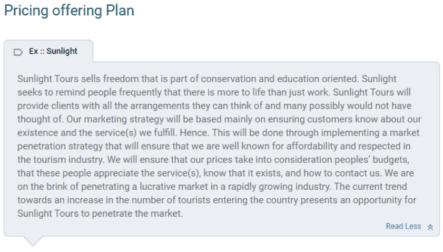
Offline strategies
Create visually appealing brochures and distribute print materials to local businesses, travel agencies, and strategic locations. Implement a referral program and try to provide discounts or exclusive festive offers.
Social Media Marketing
Utilize social media platforms(Facebook, Instagram, Twitter) to highlight travel packages, engage with the target audience, and build a community around travel enthusiasts.
Content Marketing
Create a content marketing strategy comprising blog posts, travel guides, and visually appealing content to encourage potential customers to consider your agency for their travel needs.
Collaborations
Partner with local businesses, hotels, and travel-related service providers to promote your service offerings. Attend travel fairs, trade shows, or community events to network with potential clients.
7. Introduce Your Team
The management team section offers an opportunity to showcase your strength as a travel agent. It should include a thorough plan for your travel agency’s key managers, employees, or sub-travel agents.
Mention their roles & responsibilities or relevant experience in the related fields or travel agency industry. Also, highlight their expertise that contributes to your agency’s success.
Try to break down overall payroll expenses, such as how much their compensation, commission split, base salary, or whether you will give any bonuses or benefits to your employees.
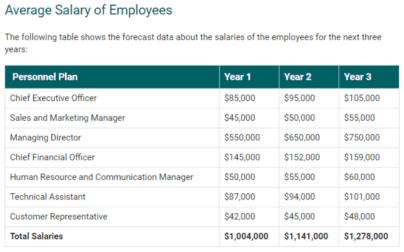
If you need to hire employees or a travel agent, emphasize how many individuals you will need and how much you will pay them.
This can provide brief details to the investors and help them understand what exactly you plan to staff your agency and pay your employees.
If applicable, you can also design an organizational chart for your travel agency. This can help you demonstrate who your key members are and what roles they serve in your travel agency.
8. Outline Business Operations
Now, it’s time to develop an in-depth look into the day-to-day functions of your travel agency. Paint a picture of seamless operations and ensure that your business runs smoothly.
Describe the entire operational cycle of the tour business, including staffing, how bookings are managed, customer service procedures, technology used, and safety measures for handling unforeseen circumstances.
Include the below subsections in your travel agent business plan operations section:
Highlight the number of employees required, and opening hours, and briefly outline the responsibilities of each team member and training programs. Refer to the below example written using Upmetrics AI assistant :
Customer Service Procedures
From pre-travel assistance to emergency response, prioritize customer satisfaction, efficient techniques, and effective client communication to ensure a positive and stress-free travel journey.
Equipment & Technology
Explain what kind of equipment & technology you will need to run your travel agency. Include a brief idea of how you will reach some travel agency milestones and look forward as your business grows.
You might consider below things:
- Office equipment(Telephone, fax, or scanner)
- Travel agency website
- Booking tools
- Itinerary builders
- Customer Relationship Management(CRM)
- Invoicing and payment processing tools
9. Prepare Financial Plan
Currently, you are in a business planning stage, but dedicating some time to putting together the most realistic financial projections is very crucial.
Having a well-structured and in-depth travel agency financial plan will help you show the tentative spending as well as the revenue forecasts and budgets if your travel company is seeking funding from investors.
In this section, you will need to make a few assumptions that will greatly affect the financial statements of your agency. Take a look at the below table to make important assumptions:
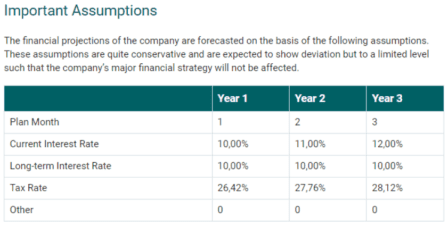
Mention all the below financial aspects in your travel agency business plan:
- Income statement (Profit and loss statement)
- Cash flow statement
- Balance sheet
- Sales forecast
- Break-even analysis
- Business ratios
- Investment strategies
- Exit strategy
From the above financial statements, you can identify the startup funding needs and evaluate the funding resources for your agency, such as bank loans, angel investors, crowdfunding, or personal savings.
Well, keeping a realistic financial report in your hand not only helps you demonstrate your agency’s fiscal health but also emphasizes its sustainability.
However, calculating all the financial elements from scratch can be overwhelming. But don’t worry; consider Upmetrics’ financial forecasting tool .
All you have to do is fill in all the details you have and let the tool calculate financial factors, and create visual reports for you. No manual data entry, placing Excel formulas, or designing graphs—nothing.
Here’s an example of a projected balance sheet for the next 3 years using Upmetrics:
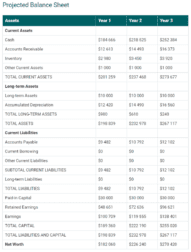
Download a travel agency business plan template
Need help writing your travel agency business plan from scratch? Well, here you go; download our free travel agency business plan template now and get started.
This modern, user-friendly business plan template is specifically designed for travel agencies. With a step-by-step guide and example, it helps you write a professional plan without missing any crucial steps.
Simply import data into your preferred editor and start writing!
The Quickest Way to turn a Business Idea into a Business Plan
Fill-in-the-blanks and automatic financials make it easy.
Start preparing your business plan with AI
Finally! With the help of our sample business plan template, you know how to write a travel agency business plan. So, you are one step closer to starting your travel agency business confidently- pretty exciting, right?
But you know what else is more exciting? Your business planning process can be even smoother than this. Yes, you heard it right; it’s possible with the help of Upmetrics AI Assistant.
So, don’t wait, and start planning now !
Related Posts
RV Park Business Plan
Airline Business Plan
Business Plan Writing Guide
Successful Business Plan Examples
Car Rental Business Plan
Airbnb Business Plan
Frequently asked questions, where can i find a free travel agency business plan template.
There are various online platforms where you can find free travel agency business plan templates. Consider a reputable business planning website—Upmetrics, which offers free templates to help you get started.
What should be included in a travel agency business plan?
A comprehensive travel agency business plan should include below key components:
- Executive summary
- Company overview
- Market research and industry analysis
- Services offered
- Sales and marketing strategy
- Management team
- Operational plan
- Financial plan
How often should i update my travel agency business plan?
It is advised to regularly update your travel agency business plan to reflect changes in the market, industry trends, and business growth. Review and update your plan at least once a year or more often if there are significant changes in your business.
What financial projections are necessary for a travel agency business plan?
Make sure that you include the following financial factors in your travel agency business plan:
- Startup costs
- Revenue projections
- income statement (Profit and loss statement)
- Projected cash flow
About the Author
Upmetrics Team
Upmetrics is the #1 business planning software that helps entrepreneurs and business owners create investment-ready business plans using AI. We regularly share business planning insights on our blog. Check out the Upmetrics blog for such interesting reads. Read more
Plan your business in the shortest time possible
No Risk – Cancel at Any Time – 15 Day Money Back Guarantee

Create a great Business Plan with great price.
- 400+ Business plan templates & examples
- AI Assistance & step by step guidance
- 4.8 Star rating on Trustpilot
Streamline your business planning process with Upmetrics .

How to create a tour operator business plan in 8 steps
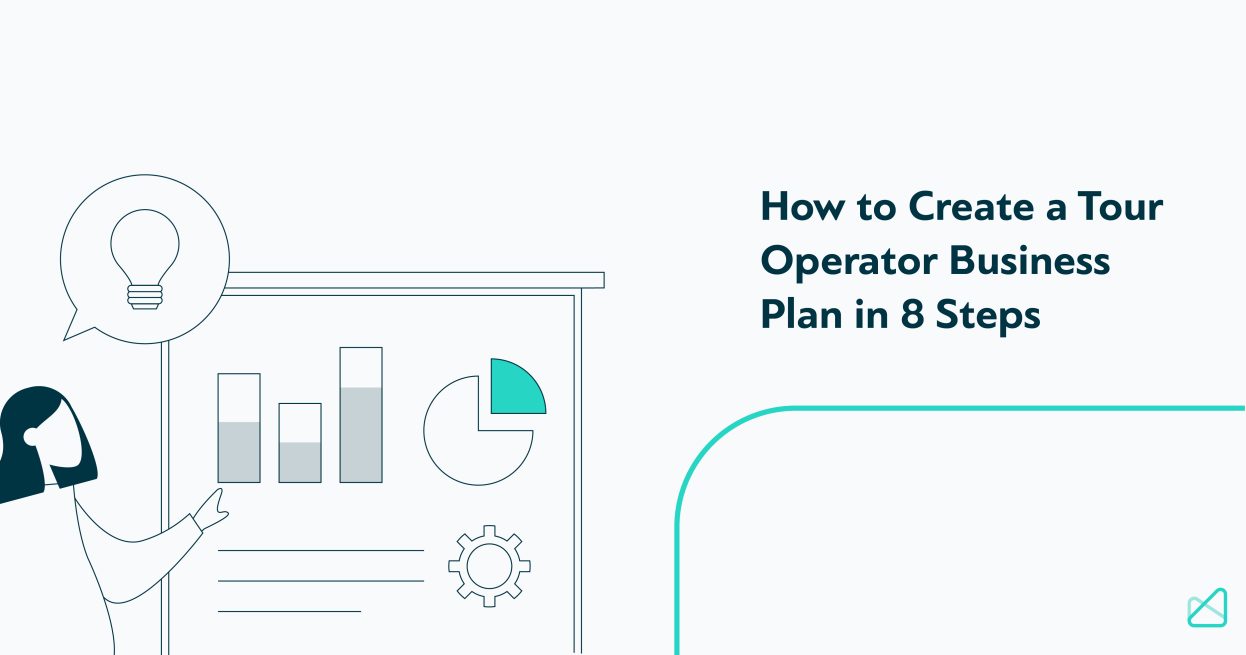
Preparing to Write a Business Plan
Tour operator business plan template, tips and tricks for a strong tour operator business plan.
Wondering how to turn your tour operator idea into a real business? The first step to launching a startup and getting investors onboard is to develop a formal proposal called a business plan . Whether you want to start a travel agency, a walking tour company, or an adventure travel business, you will use a business plan to communicate exactly how you plan to make your idea come to life.
Creating a tourism business plan might sound daunting; in this article, we’ll show you how to do one and offer lots of advice for first-time founders. You’ll be able to use this article as a tour operator business plan template to write your own sample business plan (as an exercise) or to create the real thing.
To more clearly illustrate how to create a tour operator business plan, we’ll use a sample business as we go through each section. Our sample business is a small tour operator startup that specializes in ecotourism in Thailand.
Before you start to create your official business plan, it can be helpful to think through several aspects of your business so that you are fully prepared to address each topic in the business plan template. One excellent preparation exercise is to complete a Business Model Canvas for your company.
The Business Model Canvas encourages you to think critically about your customers, cost structure, revenue streams, marketing strategy, and more. It’s the perfect warm-up for your business plan because you’ll incorporate your Business Model Canvas notes into the actual business plan document. We recommend that you do this exercise with your co-founders, if you have any, and with a whiteboard – you’ll probably make lots of changes as you go!
You can find a printable Business Model Canvas template here .
Your tour operator business plan should contain at least seven sections: an executive summary, a company overview, a description of your services, an analysis of your market, an implementation plan, a team summary, and a financial plan. You might have one or more appendices at the end, if you have additional relevant information to include. The finished product should be formatted nicely and incorporate your company’s logo and branding.
Executive Summary
As the first component of your business plan, the executive summary is arguably the most important section. If you’re pitching your idea to investors, they’re likely very busy people, so you want to grab their attention from the beginning. The executive summary should contain a concise outline of your tour operator company’s objectives and goals, your mission and/or vision statements , your key success factors, and a clear description of your value proposition.
Company Overview
Think of this section as what you would post on the “About” section of your tour operator company’s website. The company overview should explain who your company’s key leaders are, how and when the business started, what the ownership structure looks like (if you have investors, for example), where your office is located, and an outline of your current assets and debts. If you’re in the early stages of your business, this section might be quite short.
Operations Plan
The operations plan is where you describe exactly what your company will offer. What kinds of tours will you sell? Where exactly will you operate? This is the type of information you would list on your website for potential customers or guests to read – but without too much of a sales pitch.
In this section, it can also be helpful to include a description of the full “ life cycle ” of your business. What happens before, during, and after a tour? What steps does the guest complete, and what happens behind the scenes at your company’s office?
Thinking about our Thai ecotourism company, we might illustrate how someone could book a tour perhaps six months in advance on our website. Between booking and arrival, we coordinate accommodation, meals, and transportation with partner providers. When the tour concludes, we offer transportation back to the airport and follow up with a special offer to book another tour with us at a discount.
Market Analysis
This section explores your specific niche within the tourism industry and the geographic location(s) where you plan to operate. Who are your target clients or guests? Who are your main competitors? What trends exist in this facet of the industry? Is the amount of visitors to your location increasing or decreasing?
Try to include statistics from reputable sources whenever you can. Destination marketing organizations, tourism bureaus, and air traffic data, just to name a few, can provide valuable insight and add credibility. This section should leave no stone unturned so that your reader can truly understand your market conditions.
In our ecotourism business in Thailand, for example, we would include information about travel trends in Thailand (like the most popular feeder markets), new air routes, economic trends, the number of new hotels being built, etc. We would also explore the ecotourism market; are more people choosing eco-friendly travel options today compared to five years ago? What companies are the current ecotourism market leaders globally and in Thailand?
Implementation
Now that you’ve explained your business idea and described the market in which you plan to operate, it’s time to outline exactly how you will bring your tour operator business to life. This section should include a SWOT analysis , details about your marketing and pricing strategies, and a sales projection.
In the SWOT analysis , you will explore your company’s strengths, weaknesses, opportunities, and threats. What does your company offer that nobody else in the market does? What are some potential challenges that you will need to face? Using our ecotourism company example, a threat could be natural disasters – if there are floods or mudslides, our business cannot operate. On the other hand, an opportunity is that more people are interested in eco-friendly travel options.
Your marketing and pricing strategies should be very specific. How will customers find your company? Which online channels will you use? Will you work through travel agents or directly with your customers?
Your pricing strategy should include the exact rates you plan to charge for at least a year in advance. For example, our ecotourism company in Thailand might charge $699 for a package during low season, $899 during high season, and $999 over holiday periods, with rates increasing 5% each year.
We might also offer a 10% discount for advance purchase bookings made at least 6 months in advance and charge a 50% cancellation fee for any reservations cancelled within 3 months of the tour departure date. Based on your pricing strategy, you can create a sales projection that will estimate your company’s sales performance, preferably over the next three years.
Team Summary
After your reader understands what your tour operator business will do, they’ll wonder who is going to make it happen. And if you’re planning to launch a full-fledged tour operator business, you’re probably not going at it alone. The Team Summary section should include a thorough plan for your company’s organizational structure, key leaders, employees, and training processes.
Do you already have a management team in place, or will you need to hire additional leaders? How many employees will you need, and how much will you pay them? And how will you train and develop your employees? The Team Summary should answer all of these questions and provide enough information for potential investors to understand exactly how you plan to staff your business, pay your employees, and ensure all team members are trained properly.
Financial Plan
The financial plan is extremely important to potential investors because they will want to maximize the return on their investment. Your financial plan is essentially a projection of your revenue streams and cost structure for your company’s first five or so years of operation. It will include not only revenue from ticket sales and costs from employee salaries, but also details like tour-operator software costs, insurance, taxes, marketing spend, depreciation of assets, interest on loans, and more.
If you don’t have a finance background yourself, it may be helpful to seek assistance from an accountant or someone who knows the ins and outs of financial modeling.
Additional Information
In an appendix, you can include supporting information or statistics that may be helpful for potential investors, but not essential to your business plan. For instance, you could include a full report on air traffic trends that you used in your Market Analysis section.
Download Your Tour Operator Business Plan Template
Now that you know what a Tour Operator Business Plan should include, below we provide the one we have specially created for you.
Writing a business plan is certainly not an easy task. It’s time consuming and requires a lot of thought, but a well written business plan can lead to significant growth for your company. As you complete your business plan, keep these pieces of advice in mind:
- Conduct thorough research on your market . When you pitch your company to investors, you want to be seen as an expert, so learn as much as you can about your competitors and market trends.
- Simplify your words and descriptions whenever possible . A business plan is not the place to wow your reader with flowery language – instead, you want your reader to easily grasp your value proposition. Think about writing so that a fifth-grader can understand it. The last thing you want is for your reader to be confused about what your company actually does.
- Don’t be afraid to make changes . As you work on your business plan, you might discover that some aspects of your business need to be adjusted for the greater good of the company. After all, the companies that are the most adaptable are the ones that survive!
- Get a second opinion (or a third or a fourth). A good test of your business plan’s readability and clarity is to let someone outside your industry read it, like a family member or friend. If they have a lot of questions, you might need to adjust your descriptions or more clearly explain your plans.
- Proofread ! Your business plan is a reflection of your company’s values. If your formatting is sloppy and your text is full of typos, your reader might question whether you have the attention to detail necessary to run a successful business.
Now that you have all the tools to create a great tour operator business plan, it’s time to get to work!
Subscribe to our newsletter
Yay you are now subscribed to our newsletter.
Adrienne Fors is the founder of Strategic Stays, a consultancy specializing in tech solutions and copywriting for short-term rental businesses and boutique hotels. She was previously a Market Manager at Expedia, and she graduated from the School of Hotel Administration at Cornell University. Adrienne is originally from Minneapolis, Minnesota and enjoys traveling and playing tennis.
Mize is the leading hotel booking optimization solution in the world. With over 170 partners using our fintech products, Mize creates new extra profit for the hotel booking industry using its fully automated proprietary technology and has generated hundreds of millions of dollars in revenue across its suite of products for its partners. Mize was founded in 2016 with its headquarters in Tel Aviv and offices worldwide.
Related Posts

3 Reasons Why Tour Operators are Essential in the Industry
7 min. Today, tour operators are key to the success of the travel industry. Tourists rely on them to turn their dream vacations into a reality. And, as we know, one of the most common interactions between tour operators and travelers is the booking of a tour that allows them to explore different parts of […]
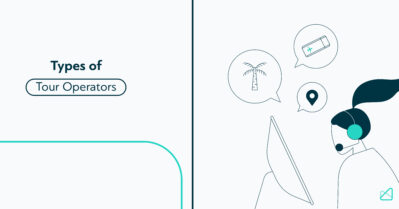
The 16 Types of Tour Operators That Keep Curated Travel Alive
29 min. Tour operators act as creators of unique and unforgettable travel experiences. They use their expertise and connections to arrange the best and most affordable transportation, accommodation, and activities. Today’s travelers are lucky to have them, and so is the industry as a whole. If you are in the travel business and you’re trying […]
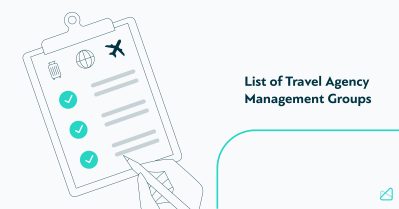
List of 32 travel agency management groups
6 min. Whether you are thinking of moving into the travel industry or you already own a business in this sector, the concept of travel agency management groups is a task worthy of analysis and study. Defining an effective business model for your retail travel agency is one of the key factors in optimizing sales […]

How to Create a Business Plan for Your Tour or Travel Company

Do you have the next great tour business or travel company idea, but don’t know how to turn it into reality? You’ve found your niche and even come up with the best tour company name ever, but who do you tell and how do you get started?
Table of Contents
Why your tour company needs a business plan.
We’ve previously covered topics on how to build your business, but one beneficial, even crucial, practice before you start is to write up a small business plan, one that compiles all the important aspects of your brand in a single 15-20 page document. Having a simple tourism business plan will help you plan for the future and even discover new things about your brand.
Whether you’re a young entrepreneur building a tour startup in search of investors, or you’re an established tour operator looking to better understand your business and take it to the next level, a tour operator business plan can help guide you in the right direction.
The Benefits of a Business Plan
As mentioned above, a tour company business plan is a document that outlines all the important aspects of your tour business. From your company goals and objectives, to your team members, and even your financial statements, a business plan is an effective tool for analyzing the ins and outs of your business.

It is the ultimate document used to convince investors and lenders to support your tour company. If you’re not looking for investors, writing a simple business plan for your tour business is still useful practice to align the leaders in your company, discover any shortcomings you might have missed, and plan for future growth.
How to Create a Tourism Business Plan
Now that you understand why having a small business plan is important, you’re probably wondering how to write one. You can use a business plan template, but it’s good to know why you’re including the information it asks for. It’s also acceptable to cater the content of your business plan to suit your unique company, but there are certain sections that investors expect to see, making them beneficial for you to include.
Here is what you need to include in your company’s business plan:
Executive Summary
One of the most important sections of your business plan will be your executive summary, which serves as a high-level overview of your business, providing highlights of the fundamentals of your brand.
You’ll notice that most, if not all, of the topics covered within your executive summary will have their own dedicated section later on in your business plan. Because the executive summary is typically limited to a single page, leave the nitty-gritty details for their respective sections and use the executive summary as a way to simply introduce the topics to your reader.
Executive summary topics:
- What is your business and what does it do? Do you host walking tours or provide bicycle rentals? Are you a tour guide or do you run a themed hotel experience? Give the reader a clear understanding of your business concept.
- What are your business goals and where do you envision your company in the future? How do you want to see your business grow?
- What makes your business different from your competitors? Whether you’re renting out a specific product like Segways or providing a service like guided tours, discuss what sets you apart from (and makes you better than) similar businesses in your industry.
- Who is your target audience? Who are you selling to and why are they interested?
- What is your marketing strategy? How do you plan to connect with and convert your customers?
- What is your current financial state? What is your projected financial state?
- What is the purpose of your business plan? Are you looking to secure investors and/or lenders? If so, how much are you asking for? You won’t need to discuss this if your business plan is strictly for your own planning purposes.
- Who is on your team, what are their job titles, and what do they do?
Again, like your business plan as a whole, not all of the topics listed above may be applicable to your business or your specific needs, so include only what you see fit.
Company Overview
Your company overview should give your reader a detailed understanding of who you are and what you do. This includes technical topics like your business description, structure, and model, but should also cover the heart and soul of your company. That is, not only what you do, but why you do it. Developing your brand story is an important step to branding in the travel and tourism industry .

What is it about running a bungee jumping business, wine tasting tour, or spelunking course that inspires you? What is your company’s mission, vision, purpose, and USP (unique selling proposition)? What are your business goals and objectives, both short-term and long-term? Defining these aspects of your business helps readers, whether investors or your own employees, connect with your business at a deeper level.
Market Analysis
Another important section to include in your business plan for your tour company is a detailed market analysis. Even if you’re creating your business plan for internal use only, conducting market analysis and research is an excellent way to gauge your position within your industry, identify areas of concern, and create an effective marketing strategy using the 7 Ps of Travel and Tourism Marketing .

Things to consider in your market analysis include your target market and demographic, whether your marketing strategy is aligned with your target market, where you want to position yourself in the industry in relation to your competitors, and where you have room to improve.
Try conducting a SWOT analysis for your tour business to explore your:
- Strengths – what do you do well?
- Weaknesses – what could you do better?
- Opportunities – are there gaps in your industry that you can take advantage of?
- Threats – what external factors affect your chance of success?
Team Summary
Use your team summary section to outline the leaders and key players in your tour company. An organizational chart works well to display this information and will usually explore members of management and other key personnel, their job titles, and their roles and responsibilities. Be sure to address how each person plays/will play an integral role in the success of your tour business or travel company.

Even if your business is very small or you run a sole proprietorship, it’s still worth including a team summary section so that potential investors can get to know who they’re investing in. A team summary adds a human element to your business plan and can help build your readers’ confidence by showing them that they can trust the leaders (even if it’s just you) to bring the company to success.
Financial Plan
Discuss your finances. What is your current financial state, what is your future financial projection, and how do you plan on getting there? If you’re looking for an investment, how much do you need? Include relevant documents, paperwork, statements, calculations, etc. to back up the numbers you’re sharing.
Marketing Plan
Needless to say, tour marketing is one of the most important aspects of your tour business.
Your business plan should have a detailed marketing strategy and promotional tactics, including pricing strategy, advertising channels, and innovative tactics. It should also leverage social media and other tourism-related technology to reach your target market effectively.

Your Business Plan Can Set You Up For Success
Investing the time up front to create a simple business plan for your tour company is worth the effort, and is crucial to becoming a successful tour operator. Going into anything without a plan can be risky, and starting a tour business is no different.
Once you know how to write a business plan and understand the main components that make one effective, you’ll have an invaluable tool for securing investors and planning your company’s growth in the competitive tourism and travel industry. There’s really no better time than now, so go out there, write a killer business plan, and start the tour business of your dreams .

Written By | Edward Nieh
Edward Nieh is a freelance writer and copy editor working across multiple mediums for clients from various industries. He has a degree in creative writing with a focus on screenwriting for feature films.
Previous Article How Tourism's Recovery is Empowering Women Worldwide
Next Article 8 Revenue-Generating Tourism Rental Ideas for 2024 (Updated)
Related Posts

Articles , Increase Online Bookings , Tourism Trends
17 innovative tourism business ideas and trends for 2024.
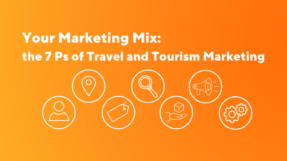
Articles , Increase Online Bookings , Marketing Strategies
Your marketing mix: the 7 ps of travel and tourism marketing.
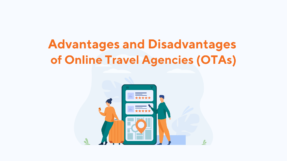
Articles , Increase Online Bookings , Tourism Best Practices
Advantages and disadvantages of online travel agencies (otas), search the blog.
- All Categories
- Tourism Best Practices
Most Popular Articles
- 17 Innovative Tourism Business Ideas and Trends for 2024 90 views
- Advantages and Disadvantages of Online Travel Agencies (OTAs) 58 views
- Your Marketing Mix: the 7 Ps of Travel and Tourism Marketing 46 views
- How to Create and Promote Amazing Tour Packages 6 views
- How to Create a Business Plan for Your Tour or Travel Company 6 views
I have read and agree to the Rezgo Privacy Policy
GET STARTED
Sign-up for a free demo.
Lorem ipsum dolor sit amet, consectetur adipiscing elit, sed do eiusmo tempor incididunt ut labore et dolore magna aliqua.
Schedule A Demo
Step-by-step guide to creating a tour operator business plan [template included]

By Kevin Tjoe — 13 Jan 2022
Business plan Business set-up
Updated July 2023 – Ready to take the plunge and launch that tour company or adventure travel business you’ve been envisioning? Before you start welcoming guests, the best first step is always to build a detailed business plan.
A tour operator business plan is more than just a formality; it is the compass that will navigate your business’s journey. A well-structured business plan for a tour operator provides the framework for transforming your vision into a thriving and sustainable business. It will help you clarify your goals, streamline your operations, and make informed decisions.
Let’s explore the immense value of a clear tour operator business plan as well as the most important elements to consider in this comprehensive document.
Why create a business plan?
Crafting a business plan allows you to lay the groundwork for your tour operator business effectively. Whether you plan to help travelers make travel plans or to provide amazing tourism experiences, your business plan will serve a couple of key purposes:
- You can hit the ground running with a plan in place, and goals to work towards in the long term.
- You’ll have a quality business case to use if you’re applying for loans or grants.
- You can point your start-up resources, such as cash flow and staff, where they’ll provide the most benefit. This is particularly important if you’re starting with a tight budget.
- You’ll also have a ‘roadmap’ to help you navigate through the inevitable challenges, obstacles, and surprises in business!
Key elements of a tour operator business plan
In order to understand how to set up a tour operator business, you’ll first need to learn the key elements of a tour operator business plan.

1. Business overview
This section of your tour operator/ tour agency business plan provides a holistic snapshot of your company, offering readers a clear understanding of your business’s identity. Ideally, it should include the following:
- Business Name: Your business name should resonate with your target audience, conveying the essence of your offerings and the unique experiences you promise to deliver. Ensure it is memorable, evocative, and future-proof.
- Location: Detail the physical location of your tour operator business. Your location can influence your target market and the types of tours you can offer. Be specific about your base of operations and, if applicable, mention any satellite offices or future expansion plans.
- History: Describe the story behind your tour company’s inception. Share the passion and inspiration that sparked your journey into the travel and tourism industry, and ensure that it aligns with your brand values.
- Ownership Structure: Clarify the legal structure of your tour operator business. Are you a sole proprietorship, a partnership, a limited liability company, or a corporation? Describe the ownership arrangement and highlight the key stakeholders involved in the venture.
- Assets and Debts: Provide an overview of your company’s assets and debts. This includes tangible assets such as vehicles, equipment, and office space, as well as intangible assets like intellectual property and brand equity. If applicable, disclose any outstanding debts or financial obligations that may impact your business’s financial health and ability to grow.
2. Market analysis
Start by defining your target market. Are you catering to adventure-seeking travelers, history enthusiasts, or nature lovers? Consider their demographics, interests, and spending behavior. Research industry trends and analyze competitors to gain insights into their strengths and weaknesses. This will help you identify opportunities and potential gaps in the market that your business can fill.
In addition, study the external factors that could impact your business, such as seasonal fluctuations, economic conditions, and any regulatory requirements specific to the tourism industry.
3. Tour offerings
Crafting compelling and diverse tour offerings is at the heart of your tour operator business. Consider the unique experiences and attractions your target market seeks. Develop a range of tour packages that cater to different preferences and budget levels.

Your tours should not only showcase the best of the destination but also provide memorable and immersive experiences. Whether it’s organizing guided city tours, thrilling adventure expeditions, or cultural explorations, your offerings should reflect your passion for travel and your commitment to creating unforgettable memories for your customers.
Use your tour operator/ tour agency business plan to emphasize what sets your tours apart from the competition. Whether it’s exclusive access to hidden gems, knowledgeable guides, or sustainable practices, highlight the value that customers will gain from choosing your services.
4. Marketing strategy
Successful businesses have strong brands, so your business plan should set out branding guidelines . Consider the following key elements when coming up with a strategy that will guide how you should start marketing your tour business:
- Branding Guidelines: Outline your branding guidelines, including your brand’s visual identity, mission statement, core values, and brand voice. Emphasize consistency across all touchpoints, from your website and social media platforms to your tour brochures and customer interactions.
- Advertising Channels: Identify the advertising channels that best align with your target audience and budget. Consider a mix of online and offline channels to reach potential customers effectively. Online channels may include pay-per-click (PPC) advertising, display ads, and sponsored content on travel websites. Offline channels could involve partnering with local travel agencies, and tourism boards, or participating in travel trade shows and events.
- Social Media Channels: Social media is a powerful tool for connecting with travelers and building a loyal community around your brand. Engage users with captivating visual content, compelling storytelling, and interactive posts that evoke a sense of wanderlust. Utilize platforms like Instagram, Facebook, Twitter, and YouTube to share breathtaking photos, behind-the-scenes glimpses, and testimonials from satisfied customers.
- Customer Reviews and Testimonials: Encourage satisfied customers to share their stories and feedback on platforms like Google Reviews, TripAdvisor, and your website. Positive reviews build credibility and serve as powerful social proof, enticing potential travelers to choose your tours with confidence. Respond promptly and graciously to all reviews, demonstrating your commitment to customer satisfaction.

- Content Marketing: Create valuable and informative content that educates travelers about your destination, highlights unique aspects of your tours, and offers travel tips and insights. Utilize blog posts, videos, podcasts, and downloadable guides to establish your tour operator business as a trusted authority in the travel industry.
- Partnerships and Collaborations: Consider strategic partnerships with complementary businesses in the travel and hospitality industry. Collaborate with local hotels, restaurants, and activity providers to create enticing package deals that appeal to travelers seeking a holistic experience. This is especially important if you are considering creating an international travel agency business plan, as collaborations can help broaden your reach.
5. Operations and management
The operations and management section of your tour operator business plan delves into the practical aspects that keep your business running smoothly and efficiently. This nitty-gritty exploration ensures that every aspect of your tour company is well-organized, legally compliant, and focused on delivering exceptional experiences to your customers.
Here are the key components to include in this section:
- Business and Legal Structure: Clearly outline your chosen business and legal structure. Whether you are operating as a sole proprietorship, a partnership, a limited liability company (LLC), or a corporation, this information provides a framework for your business’s governance and responsibilities.
- Risk Management and Workplace Health & Safety Plans: As a tour operator, the safety and well-being of your guests are paramount. Detail your risk management procedures and workplace health & safety plans to mitigate potential hazards and ensure a secure experience for travelers. Assess the risks associated with different tours and activities, develop contingency plans, and implement safety protocols that align with industry best practices.
- Terms and Conditions: Craft comprehensive and transparent terms and conditions for your tour offerings. Clearly communicate cancellation policies, refund procedures, and any limitations or requirements for participants.
- Staff Scheduling and Training: Outline your staff scheduling procedures to ensure smooth operations and optimal customer service. Consider investing in staff training programs that equip your team with the knowledge and skills to offer insightful commentary, excellent customer care, and handle unforeseen situations professionally. Furthermore, you can optimize the utilization of Full-Time Equivalent (FTE) tool to help you gauge the potential productivity of your staff and business.
- Reservation System: In the digital age, a robust and secure reservation system like Rezdy is vital for streamlining your booking process for both you and your customers. Invest in a reliable booking software that allows real-time availability updates, secure payment processing, and automated customer confirmations.

- Distribution Channels and Partnerships: Consider the distribution channels that will help grow your bookings and expand your market reach. Will you collaborate with online travel agencies (OTAs) or travel agents to promote your tours? Explore partnerships with local businesses, such as hotels and restaurants, to create enticing package deals.
- Customer Relationship Management (CRM): A well-organized CRM system enables you to build lasting relationships with your customers. Implement CRM software to keep track of customer interactions, preferences, and feedback. Personalize your marketing efforts and start building customer loyalty through targeted promotions and personalized offers.
6. Financial plan
The financial plan is a key component of your tour operator business plan. It outlines your revenue streams, costs, and projected financial performance over time. A well-structured financial plan demonstrates the viability of your business and helps you secure funding if needed.
Start by estimating your startup costs, including equipment, licenses, marketing, and initial staff training. Calculate the expected cash flow, factoring in the seasonality of the tourism industry. Identify the pricing strategy for your tours, ensuring that it covers your expenses while remaining competitive in the market.
Create financial projections for at least the first three to five years, considering both conservative and optimistic scenarios. This will enable you to anticipate potential challenges and make informed decisions that will help you with growing your tour business.
Remember to regularly review and update your financial plan as your business progresses. Monitoring actual financial performance against projections will help you make timely adjustments and stay on track towards achieving your business goals.
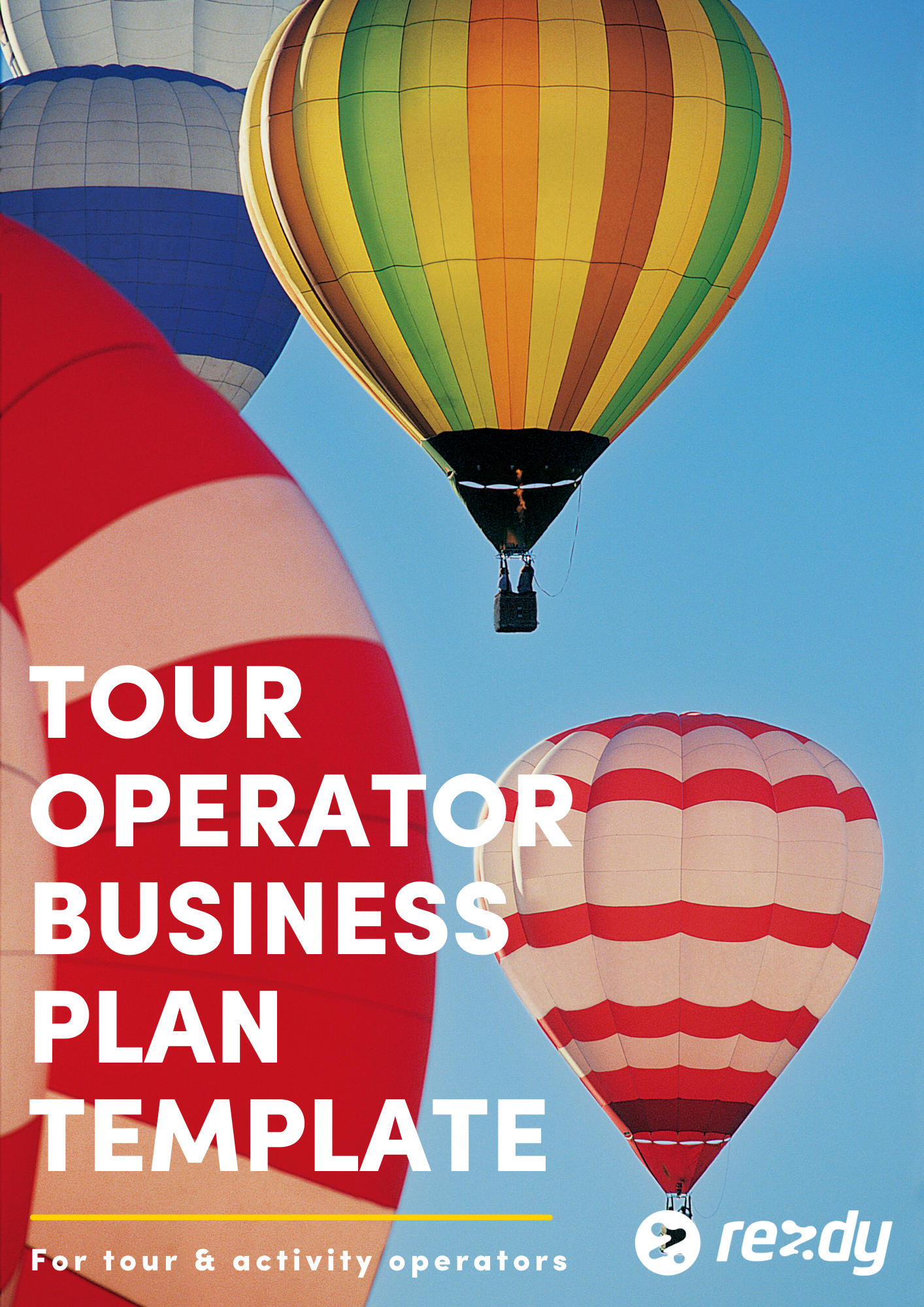
Ready to start building your business plan as a tour operator?
Download the free all-in-one checklist for easy reference.
Getting your tour business off the ground
Now that you have an effective business plan in place, it’s important to ensure your business has the right software.
Online booking software for tour operators like Rezdy is designed to equip your business for success. It includes multiple features integrated into the system, which allows you to reduce your overall admin duties. Some of these tools include real-time availability to avoid double bookings, automatic customer updates and reminders, and secure payment processes.
Furthermore, Rezdy also offers a channel manager platform that connects your business to thousands of resellers instantly. Joining Rezdy Marketplace is as simple as listing your products and setting your commission rates. From there, you can let resellers on the platform promote and sell your services to their customers.
Set your business up for success with Rezdy
Set your business up for success with a FREE 21-day trial or alternatively, book a demo to learn more about Rezdy and our products!
If you enjoyed this article then make sure to follow the Rezdy blog . There are a lot of marketing tools and tour operator tips designed with businesses like yours in mind.
Enjoy a 21-day free trial to take a look around and see if we are a good fit for your business.
No obligations, no catches, no limits, nada
Business Operations

The benefits of cultivating a remarkable online reputation in the tourism industry

How to create a Google Business Profile for tour operators
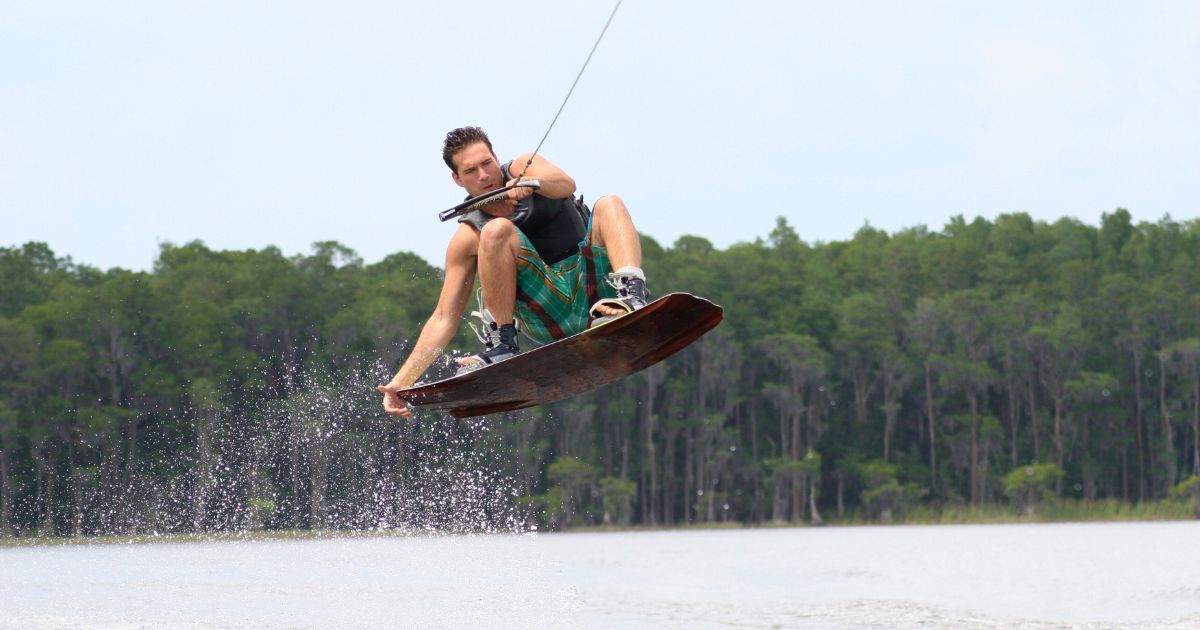
How to set up an online booking system for tour businesses
Your Passport to Success: A Comprehensive Guide to Launching a Tourism Business
- Published: July 13, 2023
- By: Yellowbrick
Spotting the Opportunity
Carving your unique niche, constructing a comprehensive business plan, arranging the financial framework, jumping through legal hoops, crafting a magnetic brand, building a strong online presence, launching and marketing your venture, splash your unique colors onto the vast canvas of the tourism industry.
Enter your email to learn more and get a full course catalog!
- Hidden hide names
- Hidden First Name
- Hidden Last Name
More from Yellowbrick

Top 5 Video Streaming Challenges: How to Overcome Them
Explore video streaming challenges and strategies to overcome them, from bandwidth limitations to DRM issues. Dive into the dynamism of the video streaming industry.

10 Steps to Launch Your News Producer Career Successfully
Discover the key steps to launch a successful news producer career. Explore skills acquisition, degree relevance, internships, networking, and staying updated.

Mastering the Art of Tour Coordination: Skills, Duties & Path to Success
Discover the steps to kick-start your career as a Tour Coordinator. Learn about the key responsibilities, required skills, and necessary steps to excel in this role.
ABOUT YELLOWBRICK
- Work at Yellowbrick
- Privacy Policy
- Terms of Use
STUDENT RESOURCES
- Scholarships
- Student Login
- Beauty Business Essentials
- Beauty Industry Essentials
- Ecommerce Essentials
- Fashion Business Essentials
- Fashion Industry Essentials
- Footwear Business Essentials
- Gaming & Esports Industry Essentials
- Global Sports Management
- Hospitality Industry Essentials
- Music Industry Essentials
- Performing Arts Industry Essentials
- Product Design Essentials
- Sneaker Essentials
- Streetwear Essentials
- TV/Film Industry Essentials
- UX Design Essentials

Parsons faculty, together with design experts from leading organizations, help you build knowledge and skills, explore key trends shaping the future of product design, and gain an understanding of how design, manufacturing, and marketing components work together within the product creation process.
Enter your email to get a free sneak peek, course catalog, and career guide.
Brittany Markle Choreographer/Mentor/Dancer I think my most rewarding experiences have included the success of former students. I take pride in making sure they have the necessary tools to move forward with a career in the entertainment industry and I hope to help them bridge that gap from amateur to professional.

Briah Fowler Marketing and Sales Specialist, New York Giants What's success if you can't share your winnings? As a marketing specialist for the New York Giants, I learned the key to success is giving back. If you can utilize your skill set and talent to help give back to your community, it's one of the most rewarding accomplishments.

Bill Carroll Production Director, Centennial Broadcasting I'm most proud of taking the courage to start a music foundation and help musicians with any kind of disability and who are on the spectrum. It's something close to me and very important to nourish.
Bethany caldwell custom stylist & merchandiser - sales, threadwell clothiers, under armour inc. i am a custom clothier who helps people create custom clothing to look & feel their best -- i like to create quality clothes with meaning -- and i pride myself in making the "experience" part of the process..

Becca Brown NFTs & Collectibles Project Manager, Warner Bros Discovery I'm honored to work with an innovative team where I'm involved in bringing world-renowned brands like DC and Harry Potter to life through cutting-edge collectibles. Seeing our fans engage with our products is incredibly fulfilling and fuels my excitement to continue driving innovation and growth in the licensing space.

B. Danielle Watkins Chief Programmer, iElevate Media Group Writing is my passion, creating is my heart, and telling stories gives me an escape I've never found anywhere else, so to be doing that for the masses is what success looks like for me.

Anissa Lee Product Marketing Manager, Google I’m most proud of launching the 10th annual Google Economic Impact Report and leading its entire end-to-end production... The most meaningful part of this experience was getting the chance to highlight the stories of these incredible and diverse businesses, the majority of which were veteran, female, and BIPOC-run.

Adrian Cantu CEO, CANTUSTUDIO Every day a new proposition arises, as a friend, as a designer, as a co-worker, and as a leader. I like to interpret any challenge as an opportunity that demands better exploration. I personally think you shouldn't live life by treating discouragements and setbacks as a negative force in your way. I think a positive and disciplined mentality helps you find interesting aspects of a "stuck-up" and tackle them as a new adventure.

Fashion Institute of Technology (FIT) faculty, alongside experts from Beauty Inc and leading entrepreneurs and beauty companies, help you learn industry practices on how to successfully take a beauty product to market. Lessons include understanding the beauty business landscape, developing a beauty product, formulation, packaging, and branding principles.
Explore all areas of the hospitality and tourism industry with this new 100% online program from New York University (NYU), featuring leaders from across the hospitality, tourism, and travel world.
Parsons faculty, together with entrepreneurs, industry experts and specialists from Printful and Shopify, uncover how to design a seamless, ecommerce enterprise. Lessons range from creating a marketing strategy, building a digital brand, designing a customer journey, optimizing SEO tools and paid media, utilizing data and KPI reporting, understanding distribution and logistics, and more.
Learn how beauty products are developed, packaged and marketed. Understand what it’s really like to be a boss beauty entrepreneur and how to be a successful beauty influencer through this cutting edge online certificate program from FIT, featuring Allure editors and top beauty professionals from across the globe.
Parsons faculty, together with design experts from Creative Bloq and across the industry, explore the critical stages of the UX journey with lessons covering a range of topics from usability research methods, design concepting, and wireframing, to the latest technologies shaping the future of modern user interface design.
Chanel Benjamin Founder, They Love My Splash LLC and Communications & PR Director, G.R.A.C.E. Inc. I am most proud of being named the Community Hero at Yankee Stadium because it was to highlight the iSmileForAngele Scholarship I created in honor of my late grandmother. It also highlighted my iniative #KickBackAgainstBullying Sneaker Drive and the proceeds go to local shelters.

Leaders from across the gaming and esports world, together with faculty from Fashion Institute of Technology (FIT), will teach you about the key areas, and related career opportunities in the rapidly changing gaming industry.
Explore all areas of the performing arts industry with this new 100% online program from faculty at New York University (NYU), and featuring experts from Backstage and leaders from across the industry.
Fashion Institute of Technology (FIT) faculty, alongside experts from WWD and across the industry, help aspiring fashion stylists learn the skills needed to break into the fashion world.
Fashion Institute of Technology (FIT) faculty, together with insiders and experts from Footwear News and other leading brands, help you learn how to build a successful footwear company.
Fashion Institute of Design & Merchandising (FIDM) faculty, alongside experts from WWD and the fashion industry, help aspiring fashion designers learn the skills needed to begin designing a fashion collection.
Parsons School of Design faculty, together with leaders from across the fashion world, will teach you about the key areas, and related career opportunities in the ever-evolving fashion industry.
New York University (NYU) faculty, alongside leading journalists from Rolling Stone and other news organizations, help you learn the industry practices and fundamental skills needed to produce news stories across audio, visual, and digital mediums.
Explore all areas of the film and television industry with this new 100% online program from faculty at New York University (NYU), and featuring experts from IndieWire and Rolling Stone, and leaders from across the industry.
New York University faculty, together with business leaders from across the sports world, will teach about emerging trends, and related career opportunities in the ever-evolving business of global sports and marketing.
Fashion Institute of Technology faculty, together with leaders from Complex and across the sneaker world, will teach you about the key areas, and related career opportunities in the ever-evolving sneaker industry.
Parsons School of Fashion faculty, together with insiders and experts from leading brands, help you learn the business side of fashion, explore key trends shaping the future of the industry, and gain an understanding of how fashion brands are built and launched.
Explore all aspects of the streetwear industry, discover related careers, and build your skills with this online program from Parsons School of Design and Complex, featuring many recognized leaders from across the streetwear world.
Explore all areas of the music industry with this 100% online program from faculty at New York University’s Clive Davis Institute of Recorded Music, featuring experts from Billboard, and leaders from across the industry.
Casey Butler Creative Activation Manager, Roku The industry is constantly changing and evolving. This is part of the excitement of the job, but it can also be very difficult to navigate. Persistence and dedication are some of the most important traits for success in this industry - you need to want to be there and willing to put in the work.

Daniel Bouwhuis Marketing/Brand Manager, Warner Music I believe that my success is not just about achieving a high-status job title, but rather it's about the impact I can make in the lives of others through music. I want to... continue to contribute to creative projects that raise awareness for important issues such as mental health and women's and LGBTQ+ rights.

Wendy Xie Producer - CN Ad Studio, Conde Nast As a Producer, I aspire to produce slice of life ads to increase visibility for ubiquitous or unsung brands founded by people of color and further overcome the bamboo ceiling that so many Asians continue to face in the creative industry. When there is a day where my original ad ideas are broadcasted in the real world, this is when I believe my voice is heard, my impact is valued and appreciated by peers, and that our society is progressively evolving the advertising, media and tech industry to be a more inclusive space for rising creatives of color.

Mehruba Haque Junior Research Fellow, Estonian Business School Women's insecurities have been used for decades to sell beauty products, which have been linked to eating disorders, anxiety, and depression... I would like to come up with a new way to market beauty products that emphasizes that feeling beautiful doesn't come from comparing yourself to other women. I want to be a key player in making these positive changes happen and making the world a better place for women.

Timothy Clarke Mixshow DJ/Personality, Radio One/Urban One, Sirius XM I want to be able to help upcoming artists be heard and seen on a global level, and be known as one of the biggest DJs turned A&R in hip-hop culture.
Tiana brown director of broadcasting & production, university of pennsylvania game day broadcast staff, philadelphia eagles my biggest advice is that if no one wants to open the door for you, kick it off the hinges. most of the opportunities that i have been afforded thus far have come from creating my own and giving opportunities to other people. creating your own opportunities can take a lot of sacrifice, a lot of lost sleep, a lot of fun missed, but in the end it will all be worth it when you wake up every morning living out your dreams..

Stefani Marie Clare Janelli Founder, The MIC & Artist Development Specialist (13 Seconds Music) Have tough skin, but be open to learning and adapting! This industry is constantly changing overnight, and adapting to however the wind blows is vital. It's also essential to have the willingness to learn. Being open to learning a new way to do something, or to listen to a new idea, even when it's not your own, is advice anyone at any age could benefit from!

Shelby Gussman Senior Director, Social Fisch I define success as achieving my goals, assisting my team with achieving theirs, and then setting the bar higher and accomplishing more than before all while being able to enjoy life! I hope to have the opportunity to work in different global markets, travel, collaborate with new people, and continue to be challenged and learn.

Sharrod Williams Actor, Writer, Producer - Neighbors, Hamilton, Moulin Rouge! The Musical There are no small parts. None. I have been fortunate enough to wear many different hats, big and small, on different projects. But like any machine, organization, or even the human body - each role I take on is in service of the one greater purpose, to tell a story. The hat i've worn the most is "actor". In this role, I am the vessel that conveys the humanity and experience of what each character I play is going through in the story being told. My goal is make the audience feel, relate, and or think about the aspect of life that is being reflected or challenged in the story.

Shady Elsayed Guest Services, ASM Barclays Center Whether it’s through celebrity appearances, brand and apparel collaborations, sponsorships, in-arena entertainment, or business partnerships, being a part of this industry is a rewarding experience. With it’s fast paced nature, and event based daily routine tasks, the sports and entertainment industry is built on networking and creating long lasting relationships.

Sabrina Assistant Project Manager, Dirt Rock Empire For me, success means continuing to learn and grow everyday. Next, I hope to become an even bigger voice in the industry and help encourage positive change.

Rebecca O’Keeffe Content Partnerships Manager, TikTok My role is Content Partnerships Manager for TikTok Ireland. I work with creators, media partners and public figures to enhance the content ecosystem to ensure the best user experience for the people of Ireland. This includes content projects with Ireland's biggest creators and public figures, exciting hyperlocal tentpole projects and events, in-app campaigns for things like Black History Month and Pride.

Rebecca Lu Business Development, Joes Footwear The biggest challenge is you never know when you will be challenged - they just pop out somehow, even you think you are doing the best. So don’t take challenge as monster, always be positive and do whatever you can.

Pavlina Koleva UX/UI Designer, Pixum To be a designer means you give people better experience, you help people and you try to see things through their eyes. Creating flexible products even for people with disabilities is great achievement. Design was and always will be part of people's life.

Natalie Turturro Mettouchi Costume Designer, IATSE Local 829 I am most proud of designing the costumes for a short film that premiered at the Tribeca Film Festival in 2021, called "Esther in Wonderland." I had a shoestring budget and was working on two other pretty huge projects simultaneously, but still managed to design creative outfits that allowed the dancers to move freely and help develop their characters.

Meosha Enslow Seamstress, Cintas uniform company As a designer I pride myself on originality and creativity... The problem comes when I sit down to plan I begin to doubt myself and my capabilities...To avoid the setbacks filled with self doubt I think of the end result and how it always makes me feel so empowered and shuts the weak voice in my head saying I can’t do it.

Matt Popper Music Touring/Business Affairs, United Talent Agency Be relentless - the most difficult part of the job is getting your foot in the door. Once you're in, your good work will speak for itself. Of course, there will be some days where you will feel defeated and want to give up, but if this is what you're meant to do, you'll find a way to make it happen.

Deyonte Fashion Designer, DWC Project Runway Season 16 Contestant Everyone has challenges and obstacles they face in the industry. It's what you do with those minor situations that help you become better if you allow it. You have to fight for your vision and be relentless.

Mathilde Garnier Product Manager Footwear, adidas AG To me, success is passion. I strongly believe you can only be sucessful if you truly love what you are doing. Passion is a magic fuel that can inspire and drive people towards their goals... [but] passion is not enough. Our world needs more than for us to just do what we love. In order to be successful, we need to make a difference. I need to make a difference.

Lindsay Milner Sigmund Vice President of Design, Vida Shoes The highlight of my career was becoming a Vice President of Design at a respected industry company at a young age. It showed how all of the hard work I put into my career- including evolving and continuing my education in the field- really put me ahead of the curve.

Leslie Peterson Coordinator - Center of Excellence, NBCUniversal One of the hardest parts of my journey was moving to New York City from a small town and learning how to navigate the corporate world. Everyday I am learning something new and need to be okay with not knowing everything.

Kyle Rebucci Customs Team Trainer, Puma Fashion is a part of everyday life. You don’t have to like trends, brands, or designers to contribute to the giant that is the fashion industry. You can’t escape from it. My contribution will of course directly relate to fashion, but I hope to be part of some reform in the industry when it comes to sustainability and ethics.

KeNisha Ruff Founder, Marie Hunter Beauty Less than 1% of luxury beauty founders are black. I am laying the groundwork for black founders to enter the prestige sector and using my company to inspire, break the stigma surrounding mental health, and fight climate change.

Joseph Richert Manager - Corporate Development & Strategy, Universal Music Group Success to me is happiness, both professionally and personally. On the professional side, that means having an impact on helping artists and entrepreneurs bring their dreams to life in an industry I'm passionate about; which I'm lucky to say I'm doing now!

John Paul Endab Physical Education Teacher, Joppa High School As an educator, I truly believe that learning is a continuous process. It give us an opportunity to satisfy our curiosity, pursue our interests, or try new things.

Ilana Duboff Associate Media Director, OMG23 While I am proud of all the amazing films I've been fortunate to work on over the years, I am most proud of the growth I've had while working in this industry. I have been promoted three times in the past four years and now manage a team of people, which I never even thought could be possible when I first started working. I feel honored that I have the opportunity to lead a team as well as teach them and work with them.

Haramritjot Singh Founder, Cash Cow NYC I’m a kid from the Bronx, I’m a first generation American, I’m a Sikh, I’m a father in his thirties, and now I’m the owner of a clothing brand. I serve as a prime example to many different people from so many different circumstances that starting a small business and following your dreams is possible.

Giulia Baldini Fashion Journalist/Editor and Academic Researcher, Lehman College I represent the underrepresented with words. I report stories and narratives that center on the fashion industry, specifically when the protagonists are from the African Diaspora, when they are sustainable businesses, and when they are engaged in minorities' activism.

Forbs West Associate Music Curator, SiriusXM/Pandora I think one of the biggest challenges that I've faced in my journey is patience. I think especially being in Generation Z, it is important to slow down and appreciate what we have accomplished so far. I think when you least expect things, it is a surprise yet it is also very rewarding.

Elena Takmakova Manager - International Production, Universal Music Group The thing that keeps me on track is remembering how far I've come. Just that simple feeling of being proud of myself can make miracles.

Dounesha Scott Product Manager, Anna Griffin Inc. Of my career achievements, I am the most proud of being a uniform fit specialist for the Delta Style Project... Delta only redesigns their uniforms every 5-10 years. The uniforms were designed by Zac Posen and manufactured by Lands End... We are in the Delta museum and will be a part of Delta airlines history.

Travel Agency Business Plan Template & Guidebook
How to write a travel agency business plan in 7 steps:, 1. describe the purpose of your travel agency business..
It also helps to include a vision statement so that readers can understand what type of company you want to build.
2. Products & Services Offered by Your Travel Agency Business.
When you think about the products and services that you offer, it's helpful to ask yourself the following questions:
3. Build a Creative Marketing Stratgey.
If you don't have a marketing plan for your travel agency business, it's time to write one. Your marketing plan should be part of your business plan and be a roadmap to your goals.
Target market
Customer base , product or service description, competitive analysis, marketing channels, form an llc in your state, 4. write your operational plan., what equipment, supplies, or permits are needed to run a travel agency business, 5. management & organization of your travel agency business..
The second part of your travel agency business plan is to develop a management and organization section.
6. Travel Agency Business Startup Expenses & Captial Needed.
Startup costs are typically the first expenses you will incur when beginning an enterprise. These include legal fees, accounting expenses, and other costs associated with getting your business off the ground. The amount of money needed to start a travel agency business varies based on many different variables, but below are a few different types of startup costs for a travel agency business.
You should include any costs associated with marketing and sales, such as advertising and promotions, website design or maintenance. Also, consider any additional expenses that may be incurred if you decide to launch a new product or service line. For example, if your travel agency business has an existing website that needs an upgrade in order to sell more products or services, then this should be listed here.
7. Financial Plan & Projections
Here are some steps you can follow to devise a financial plan for your travel agency business plan:
Frequently Asked Questions About Travel Agency Business Plans:
Why do you need a business plan for a travel agency business, who should you ask for help with your travel agency business plan.
You should ask a professional business consultant or accountant for help with your travel agency business plan. They will be able to provide the knowledge and experience necessary to develop a successful plan that meets your goals and objectives.
Can you write a travel agency business plan yourself?
Related business plans, home inventory business plan template & guidebook, home inspection business plan template & guidebook, home decor business plan template & guidebook, health and wellness business plan template & guidebook, hauling business plan template & guidebook, hardware business plan template & guidebook, handyman business plan template & guidebook, hair extension business plan template & guidebook, handbag business plan template & guidebook.
I'm Nick, co-founder of newfoundr.com, dedicated to helping aspiring entrepreneurs succeed. As a small business owner with over five years of experience, I have garnered valuable knowledge and insights across a diverse range of industries. My passion for entrepreneurship drives me to share my expertise with aspiring entrepreneurs, empowering them to turn their business dreams into reality.
Winter is here! Check out the winter wonderlands at these 5 amazing winter destinations in Montana
- Travel Tips
How To Start A Tourism Business
Published: December 12, 2023
Modified: December 28, 2023
by Harlene Byerly
- Plan Your Trip
- Sustainability
Introduction
Welcome to the exciting world of starting a tourism business! Whether you have a passion for adventure, culture, or relaxation, venturing into the tourism industry allows you to share your love for travel with others while creating a profitable business. However, like any entrepreneurial endeavor, starting a tourism business requires careful planning and execution to ensure its success.
In this comprehensive guide, we will walk you through the essential steps involved in starting a tourism business. From conducting thorough research to providing exceptional customer service, we will cover every aspect to help you build a thriving enterprise in the tourism industry.
The tourism industry is flourishing, with millions of people around the world seeking unique travel experiences. By tapping into this demand, you have the opportunity to not only fulfill the desires of adventurous travelers but also contribute to the local economy.
Before diving into the exciting journey of launching your tourism business, it’s important to understand that careful preparation is key to success. With the right strategies and a deep understanding of the industry, you can position yourself as a trusted and sought-after provider of unforgettable travel experiences.
Throughout this guide, we will explore each step in detail, offering valuable insights and tips to help you navigate the challenges and make informed decisions. From researching the tourism industry and defining your niche to securing financing and building a strong team, we will guide you towards establishing a thriving business in the travel industry.
Additionally, we will highlight the critical aspects of developing effective marketing strategies to attract and engage customers, as well as provide insights on providing exceptional customer service to create a loyal client base.
So, if you’re ready to embark on this exciting journey and transform your passion for travel into a successful business, let’s get started with the first step – researching the tourism industry.
Step 1: Researching the Tourism Industry
Before diving headfirst into the world of tourism, it is crucial to conduct thorough research on the industry. Understanding current trends, market demands, and potential challenges will provide you with a solid foundation for building your business.
Begin by analyzing the overall state of the tourism industry, both locally and globally. Look for statistics and reports that provide insights into the number of tourists, popular destinations, and emerging markets. This research will help you identify potential opportunities and gaps in the market that you can capitalize on.
Next, narrow your focus and identify your target audience within the tourism industry. Determine the types of travelers you want to cater to, whether it’s adventure seekers, luxury travelers, budget-conscious backpackers, or eco-conscious tourists. Understanding your target market will enable you to tailor your offerings and marketing strategies to meet their needs and preferences.
Moreover, researching your competition is essential to identify what sets you apart and ensures your unique value proposition. Study other tourism businesses in your area or niche and assess their strengths and weaknesses. This analysis will help you position your business in a way that differentiates you from the competition and attracts your target audience.
When conducting research, don’t forget to consider the current and emerging travel trends. Stay updated on the latest travel patterns, such as eco-tourism, wellness tourism, or experiential travel. Understanding these trends will enable you to align your business offerings with the evolving demands of travelers.
It’s also important to gather information on the legal and regulatory requirements for operating a tourism business. Familiarize yourself with the permits, licenses, and certifications needed to ensure compliance with local and international regulations. This knowledge will save you from potential legal issues and help you establish a trustworthy reputation within the industry.
Finally, consider reaching out to industry experts, local tourism boards, or professional networks for guidance and advice. These resources can provide valuable insights and connect you with key players in the industry.
By investing the time and effort into thorough industry research, you will be equipped with the knowledge needed to make informed decisions and set a strong foundation for your tourism business.
Step 2: Defining Your Niche
Defining your niche is a critical step in starting a successful tourism business. With a multitude of travel options available, identifying and specializing in a specific area will help you stand out from the competition and attract your target audience.
Begin by assessing your own interests and expertise. What aspect of the tourism industry excites you the most? Are you passionate about adventure tourism, cultural immersion, luxury travel, or sustainable eco-tourism? By focusing on an area that aligns with your interests, you are more likely to possess the knowledge and enthusiasm needed to deliver exceptional experiences to your customers.
Next, consider the market demand for your chosen niche. Conduct market research to determine if there is a sufficient number of potential customers interested in the type of travel experiences you plan to offer. Look for gaps or underserved segments within the market that you can target. This way, you can position yourself as a go-to provider for a specific type of travel experience.
It is also crucial to consider your target audience when defining your niche. Who are the individuals or groups most likely to be interested in your offerings? What are their preferences, needs, and budget constraints? By understanding the specific characteristics of your target audience, you can tailor your services and marketing strategies to effectively reach and engage them.
Additionally, consider the geographic scope of your niche. Will you focus on a specific region, country, or even a single destination? By narrowing your geographic focus, you can develop in-depth knowledge about the area, establish strong partnerships with local suppliers, and deliver a more authentic and immersive experience to your customers.
Remember, specializing in a niche doesn’t mean limiting yourself. It simply means becoming an expert in a specific area of the tourism industry. Once you have established a solid foundation and gained recognition in your niche, you can expand your offerings or target additional market segments.
By defining your niche, you will be able to position your tourism business as a unique and specialized provider, standing out from the competition and attracting customers who are specifically seeking the travel experiences you offer.
Step 3: Creating a Business Plan
Creating a comprehensive business plan is essential for the success of your tourism business. A well-crafted business plan serves as a roadmap that outlines your goals, strategies, financial projections, and market analysis.
Start by clarifying the vision and mission of your tourism business. What is the purpose of your business? What unique value will you bring to the market? Clearly defining your mission will guide your decision-making and set the direction for your business.
Next, conduct a thorough market analysis. Identify your target market, assess the competition, and understand the industry trends. Analyze the demand and potential growth opportunities in your niche. This analysis will help you better understand your market position and develop effective strategies to gain a competitive edge.
The financial aspect of your business plan is crucial. Create a detailed budget that includes both startup costs and ongoing expenses. Consider all the necessary investments such as equipment, marketing, staff salaries, and operational costs. Forecast your revenue and profit projections based on market research and realistic assumptions. This financial analysis will help you demonstrate the viability of your business to potential investors or lenders.
Another critical component of your business plan is outlining your marketing and sales strategies. How do you plan to attract and retain customers? Describe your target audience and the specific marketing channels you will use to reach them. Detail your pricing strategies, promotions, and advertising plans. This section should demonstrate your understanding of your target market and showcase how you will position your tourism business in the industry.
Moreover, it’s important to outline your organizational structure and management team. Define the roles and responsibilities of key personnel and highlight their relevant experience and qualifications.
Lastly, create a timeline with specific milestones and goals. Break down your business plan into manageable phases to track your progress and make adjustments if necessary. This timeline will help you stay focused and measure your business’s growth and success.
A well-structured and thought-out business plan is not only essential for your own guidance but also serves as a valuable tool when seeking financing or investors. It demonstrates your professionalism, commitment, and understanding of the tourism industry.
Remember, a business plan is a dynamic document that should evolve as your business grows. Regularly review and update your plan to adapt to market changes and keep your business on track.
Step 4: Securing Financing
Securing the necessary financing is a critical step in turning your tourism business dream into a reality. Starting a tourism business often requires substantial initial investments, and securing funding will enable you to cover startup costs and ensure smooth operations as you establish your presence in the market.
Start by assessing your financial needs. Calculate the estimated costs for equipment, marketing, staff salaries, rent, and other essential expenses. This will give you a clear idea of the amount of financing you require.
Once you have determined how much capital you need, explore the different financing options available to you. Traditional sources of financing include banks, credit unions, and private investors. Prepare a professional and detailed business plan to present to potential lenders or investors, demonstrating the viability and profitability of your tourism business.
If securing a traditional loan is challenging, consider alternative financing methods such as crowdfunding or peer-to-peer lending. These platforms can connect you with individuals or groups interested in supporting your business venture.
Additionally, explore government grants or subsidies that may be available to entrepreneurs in the tourism industry. Many countries and regions offer financial assistance programs specifically designed to support the growth of the tourism sector.
Another option to consider is seeking partnerships or collaborations with existing businesses in the tourism industry. By joining forces with established companies, you can benefit from their expertise, resources, and financial support.
Remember, it’s crucial to present a strong and compelling case to potential financiers. Prepare a detailed financial plan that outlines your projected revenue, expenses, and expected return on investment. Present your business’s unique value proposition, competitive advantage, and growth potential. This will help build confidence and trust with potential investors or lenders.
Lastly, don’t overlook the importance of your personal financial stability. Lenders and investors will often consider your personal credit history and financial situation when evaluating your loan application. Ensure your personal finances are in order and be prepared to provide any necessary documentation.
Securing financing for your tourism business may require persistence and flexibility. Be prepared to explore multiple avenues and adapt your approach as needed. Remember, with the right financing in place, you can focus on growing your business and providing unforgettable travel experiences to your customers.
Step 5: Registering Your Business
Registering your tourism business is a crucial step in establishing its legality and credibility. Proper registration ensures that you comply with local laws and regulations, protects your business name, and allows you to operate with confidence.
The specific registration requirements and process may vary depending on your location and the type of business structure you choose. It is recommended to consult with a legal professional or business advisor familiar with the tourism industry to ensure you complete all necessary steps correctly.
Start by choosing a legal structure for your business. Options may include a sole proprietorship, partnership, limited liability company (LLC), or corporation. Each structure has its advantages and disadvantages, so consider factors such as liability protection, taxation, and ease of operation when making your decision.
Next, choose a name for your business and verify its availability. Conduct a thorough search to ensure that the name you desire is not already in use by another business. Register your chosen business name with the appropriate local or national authorities to secure its exclusive use. This will prevent others from using the same or similar name, protecting your brand identity.
Once you have registered your business name, you may need to obtain certain licenses and permits to legally operate in the tourism industry. The specific requirements vary based on your location and the services you plan to offer. Common permits and licenses in the tourism industry include tourism operator licenses, tour guide certifications, food and beverage permits (if applicable), and transportation permits (if offering transportation services).
In many cases, registering your business also involves obtaining a tax identification number or employer identification number (EIN) from the local tax authorities. This number is necessary for tax purposes and hiring employees, if applicable.
Additionally, it may be beneficial to join local tourism associations or industry organizations. These memberships can provide networking opportunities, access to resources, and credibility to your tourism business.
Remember to keep all registration documents, permits, and licenses in a safe and easily accessible place. Renew any necessary licenses or permits as required to ensure ongoing compliance with regulations.
Registering your tourism business contributes to its professional image, legal compliance, and market credibility. By taking care of these essential steps, you will establish a solid foundation for your business to thrive and gain the trust of your customers.
Step 6: Finding the Right Location
Choosing the right location for your tourism business is crucial, as it directly impacts your success and customer satisfaction. The location should align with your target market, provide easy access to desirable attractions, and offer a suitable environment for your operations.
Start by considering the preferences and interests of your target audience. Are they seeking a bustling city experience, a serene natural setting, or a specific cultural destination? Understanding the desires of your target market will help guide your location decision.
Research popular tourist destinations in your area or niche. Look for places that attract a significant number of travelers, as it indicates a higher demand for tourism services. Additionally, consider the proximity to popular attractions and landmarks that align with your business offerings.
Accessibility is another crucial factor to consider. Choose a location that is easily accessible by both local and international travelers. Proximity to transportation hubs such as airports, train stations, or major highways can greatly enhance the convenience for your customers.
Consider the infrastructure and amenities available in the potential locations. Ensure that there are sufficient accommodations, restaurants, and other services that support tourism activities. Availability of facilities such as parking, public transportation, and medical facilities is also important for ensuring a positive experience for your customers.
Assess the competition in the area you are considering for your tourism business. Look for gaps in the market where you can provide unique offerings or differentiate yourself from the existing businesses. However, also consider the benefits of being located in an area with a concentration of tourism-related businesses, as it can attract a larger pool of potential customers.
Explore the local business environment and regulations in the potential locations. Familiarize yourself with zoning restrictions, taxes, and any other legal considerations that may impact your operations. Additionally, seek feedback from local tourism boards or authorities to gain insights into the support and resources available for tourism businesses in the area.
Budget is a crucial factor when choosing a location. Determine the financial feasibility of different locations based on factors such as rental or purchase costs, utilities, and other associated expenses. Balance your budget with the potential revenue and growth opportunities available in each location.
Finally, think long-term when selecting a location. Consider future growth and expansion plans for your tourism business. Make sure that the location you choose aligns with your long-term vision and allows for scalability as your business flourishes.
Finding the right location for your tourism business requires careful consideration of various factors. By choosing a location that meets the needs and desires of your target market, you will set a strong foundation for your business to thrive and attract satisfied customers.
Step 7: Obtaining Necessary Permits and Licenses
Obtaining the necessary permits and licenses is a critical step in starting a tourism business. This ensures that you comply with legal requirements, operate within the established regulations, and maintain the safety and satisfaction of your customers.
The specific permits and licenses you need may vary depending on the nature of your tourism business and the regulations in your location. It is essential to research and consult with local authorities or a legal professional to understand the specific requirements that apply to your business.
Start by identifying the permits and licenses that are commonly required in the tourism industry. These may include tourism operator licenses, tour guide certifications, food and beverage permits (if applicable), liquor licenses (if offering alcoholic beverages), transportation permits (if providing transportation services), health and safety certifications, and any other permits required by your local government.
Research the application process for each permit or license. This may involve completing specific forms, submitting relevant documentation, and passing any required examinations or inspections. Be prepared to provide details about your business operations, such as the types of services you offer, safety measures in place, and qualifications of your staff.
Ensure that you understand the renewal and compliance requirements for each permit or license. Some permits may need to be renewed annually or have specific training requirements for ongoing compliance. Stay informed about any changes in regulations that may impact your business and update your permits and licenses accordingly.
In addition to local permits and licenses, consider any national or international certifications that may enhance the credibility and trustworthiness of your tourism business. Examples include eco-certifications for sustainable tourism practices, industry accreditation, or memberships in recognized tourism associations. These additional certifications can demonstrate your commitment to high standards and attract environmentally-conscious or quality-focused travelers.
Remember that obtaining necessary permits and licenses is not just a legal obligation but also a way to ensure the safety and satisfaction of your customers. By meeting all regulatory requirements, you establish a reputation for professionalism and trustworthiness within the tourism industry.
Ensure that you keep documentation of all permits and licenses in a safe and easily accessible place. Regularly review and update your permits to remain compliant with any changes in regulations.
By obtaining the necessary permits and licenses, you can run your tourism business with confidence, knowing that you are operating within the legal framework and meeting the industry’s standards.
Step 8: Building a Team
Building a skilled and dedicated team is essential for the success of your tourism business. The right team members will contribute to creating exceptional customer experiences, managing operations efficiently, and representing your business’s values and brand. Follow these steps to build a strong team:
Identify Your Needs: Assess the specific roles and skills required for your tourism business. Consider positions such as tour guides, customer service representatives, marketing specialists, operations managers, and administrative staff.
Recruitment and Hiring: Develop a clear job description for each role and advertise the positions through online job boards, industry-specific platforms, and professional networks. Conduct thorough interviews and assessments to evaluate candidates and select individuals who are passionate, knowledgeable, and aligned with your business’s values.
Training and Development: Once you have assembled your team, provide comprehensive training to ensure they have the necessary knowledge and skills. This includes both industry-specific training (such as local attractions, safety protocols, and customer service techniques) and any specific training required for their roles.
Effective Communication: Foster open and effective communication within your team. Encourage regular feedback and maintain an open-door policy to address any concerns or suggestions. Clear communication channels will improve teamwork, collaboration, and overall efficiency.
Empowerment and Accountability: Delegate responsibilities and empower team members to take ownership of their roles. Establish clear performance expectations and provide regular feedback to ensure accountability and encourage continuous improvement.
Build a Positive Work Culture: Create a positive work environment that promotes teamwork, respect, and a shared vision. Recognize and reward outstanding performance and foster a culture of continuous learning and professional growth.
Team-Building Activities: Organize team-building activities to foster camaraderie and strengthen relationships among team members. Activities such as retreats, team outings, and team-building exercises can promote collaboration and improve employee morale.
Retaining Talent: Implement strategies to retain top talent, such as offering competitive salaries and benefits, providing opportunities for professional growth and advancement, recognizing and rewarding achievements, and creating a positive work-life balance.
Support and Leadership: As the leader of your tourism business, provide guidance, support, and mentorship to your team. Lead by example and inspire your team to deliver exceptional customer service and exceed expectations.
Regular Evaluation: Conduct regular performance evaluations to assess individual and team performance. Use this feedback to identify areas for improvement, provide further training if necessary, and reward outstanding achievements.
Remember, building a team is an ongoing process. Continuously invest in your team’s development, foster a positive work culture, and adapt as your business grows and evolves. With a strong and motivated team by your side, your tourism business will thrive and deliver unforgettable experiences to your customers.
Step 9: Developing Marketing Strategies
Developing effective marketing strategies is essential for promoting your tourism business and attracting customers. A well-crafted marketing plan will help you reach your target audience, build brand awareness, and create opportunities for increased bookings and revenue. Follow these steps to develop your marketing strategies:
Identify Your Target Market: Clearly define your target audience, including their demographics, interests, and travel preferences. Understanding your target market will enable you to tailor your marketing efforts to their specific needs and preferences.
Create a Compelling Brand Identity: Develop a unique brand identity that resonates with your target audience. This includes creating a memorable logo, crafting a compelling brand story, and ensuring consistency in your messaging, visuals, and overall brand experience.
Build a Professional Website: Invest in a well-designed and user-friendly website that showcases your offerings, highlights your unique value proposition, and provides a seamless booking experience. Optimize your website for search engines to improve its visibility and attract organic traffic.
Utilize Social Media: Leverage social media platforms to connect with your target audience, share engaging content, and build an online community. Identify the platforms where your audience is most active and develop a content strategy that aligns with their interests. Utilize enticing visuals, customer testimonials, and user-generated content to showcase the experiences your tourism business offers.
Implement Search Engine Optimization (SEO): Optimize your website and online content for relevant keywords and phrases to improve your search engine rankings. Conduct keyword research to identify the terms that your target audience uses when searching for travel-related information, and incorporate those keywords naturally throughout your website and content.
Content Marketing: Produce valuable and informative content that educates, inspires, and engages your target audience. This can include blog posts, travel guides, videos, and infographics that showcase the unique experiences your tourism business offers. Share your content through your website, social media channels, and email newsletters to attract and retain customers.
Collaborate with Influencers: Partner with social media influencers, travel bloggers, and local influencers who align with your target audience and brand values. Collaborating with influencers can help expand your reach, build credibility, and generate buzz around your tourism business.
Engage with Online Reviews: Encourage satisfied customers to leave positive reviews on websites such as TripAdvisor, Google, or Yelp. Respond promptly and professionally to both positive and negative reviews, addressing any concerns and showcasing your commitment to excellent customer service.
Participate in Trade Shows and Industry Events: Attend travel trade shows and industry events to connect with travel agents, tour operators, and potential customers. Engage in networking opportunities, distribute brochures or promotional materials, and showcase your unique offerings to captivate the attention of potential partners and customers.
Track and Analyze Data: Utilize web analytics tools to measure the performance of your marketing efforts. Track website traffic, conversion rates, and customer behavior to identify areas for improvement and to make data-driven decisions for optimizing your marketing strategies.
Remember, effective marketing is an ongoing effort. Regularly assess the performance of your marketing strategies, adapt to changing trends, and refine your approaches based on the insights gained from analyzing data and customer feedback.
By developing and implementing strong marketing strategies, you’ll be able to raise awareness of your tourism business, attract your target audience, and establish a solid presence in the industry.
Step 10: Setting Up Operations
Setting up efficient and smooth operations is crucial in ensuring the seamless delivery of services and creating memorable experiences for your customers. This step involves establishing operational processes, acquiring necessary resources, and implementing systems to streamline your tourism business. Follow these guidelines to set up operations:
Define Standard Operating Procedures (SOPs): Develop detailed SOPs for each area of your tourism business, including reservations, customer service, tour operations, logistics, and administrative tasks. SOPs provide consistency, ensure quality, and serve as a guide for your staff to follow.
Procure Necessary Resources: Identify and acquire the necessary resources to support your operations. This may include vehicles, equipment, technology systems, safety gear, office supplies, and any other items specific to your tourism offerings. Maintain and regularly update your resources to ensure they are in optimal condition.
Establish Booking and Reservation Systems: Implement a reliable and user-friendly booking and reservation system to streamline the process for your customers. This system should allow for easy online bookings, efficient communication with customers, and accurate tracking of reservations.
Manage Inventory and Suppliers: Establish relationships with reliable suppliers to ensure a consistent supply of necessary items, such as food and beverages, equipment, and other operational supplies. Implement an inventory management system to track inventory levels, monitor stock, and reorder items in a timely manner.
Ensure Safety and Security: Prioritize the safety and security of your customers and staff. Implement strict safety protocols, provide necessary training, and regularly inspect and maintain safety equipment. Stay updated on health and hygiene regulations to provide a safe environment for your customers during their travel experiences.
Train and Develop Staff: Invest in training programs to enhance the knowledge and skills of your staff. Provide comprehensive training on customer service, tour guiding techniques, safety procedures, and any other areas specific to your tourism business. Foster a culture of continuous learning and professional development among your team members.
Implement Quality Control Systems: Establish processes for monitoring and maintaining the quality of services provided by your tourism business. Conduct regular inspections, gather customer feedback, and assess performance metrics to identify areas for improvement and address any issues promptly.
Build Partnerships and Networks: Establish partnerships and collaborations with local suppliers, attractions, and other tourism businesses. These partnerships can offer additional services, create cross-promotional opportunities, and expand your customer base. Engage in networking activities and attend industry events to build relationships and stay connected with the larger tourism community.
Implement Environmental Sustainability Practices: Embrace sustainable tourism practices to minimize your environmental impact. Implement waste management systems, conserve energy and water, encourage responsible travel behavior among customers, and support local conservation initiatives. Communicate your commitment to sustainability to attract environmentally-conscious travelers.
Regularly Review and Improve Operations: Continuously evaluate and refine your operational processes. Seek feedback from customers, monitor performance indicators, and stay abreast of industry trends to innovate and improve the overall efficiency and effectiveness of your operations.
By setting up operations effectively, you lay the foundation for delivering exceptional experiences to your customers. Efficient operations will help you provide seamless services, cultivate customer satisfaction, and position your tourism business for long-term success.
Step 11: Providing Exceptional Customer Service
Providing exceptional customer service is vital for the success of your tourism business. It not only ensures customer satisfaction but also fosters loyalty, positive reviews, and word-of-mouth recommendations. Follow these steps to deliver outstanding customer service:
Train Your Staff: Provide comprehensive training to your staff on delivering exceptional customer service. Teach them effective communication skills, active listening, problem-solving, and conflict resolution techniques. Ensure they understand the importance of personalized and attentive service.
Create a Customer-Centric Culture: Foster a customer-centric culture within your tourism business where everyone understands the significance of exceeding customer expectations. Emphasize the importance of empathy, responsiveness, and going the extra mile to create unforgettable travel experiences.
Personalize Customer Interactions: Treat each customer as an individual and personalize their experience whenever possible. Address them by name, remember their preferences, and anticipate their needs. This level of personalization makes customers feel valued and understood.
Respond Promptly: Aim to respond to customer inquiries, requests, and feedback as quickly as possible. Whether it’s through phone, email, or social media, ensure you have dedicated channels and staff to address customer inquiries promptly.
Handle Complaints with Empathy: Approach customer complaints and concerns with empathy and a desire to resolve the issue. Listen attentively, apologize if necessary, and take swift action to rectify any problems. Turn a negative experience into a positive one by going above and beyond to address any issues.
Create Memorable Experiences: Look for opportunities to surprise and delight your customers. Whether it’s a welcome gift, a personalized itinerary, or a special tour experience, find ways to make their journey memorable and unique.
Solicit and Act on Feedback: Encourage customers to provide feedback and reviews and proactively seek ways to improve your services based on their input. Use feedback to identify areas for improvement and make necessary adjustments to enhance the customer experience.
Train for Cultural Sensitivity: In the diverse landscape of tourism, it’s crucial to train your staff to be culturally sensitive and respectful towards different cultures, customs, and traditions. Understanding and appreciating cultural differences will allow you to provide a welcoming and inclusive environment for all customers.
Anticipate and Address Potential Issues: Identify potential pain points or challenges that customers may face during their travel experience. Take proactive measures to anticipate and address these issues before they become problems. This can include providing detailed pre-travel information, clear instructions, and proactive communication during the trip.
Empower Your Staff: Empower your staff to make decisions and resolve issues on their own. Provide them with the authority and tools they need to address customer needs quickly and efficiently without having to seek constant approval.
Monitor Customer Satisfaction: Regularly assess customer satisfaction levels to gauge the success of your customer service efforts. Utilize surveys, feedback forms, and online reviews to gather insights and make data-driven improvements to your services.
Remember, exceptional customer service is an ongoing commitment. Continuously monitor and improve your service quality, adapt to changing customer needs, and strive to exceed expectations. By providing exceptional customer service, you will build a loyal customer base and establish a strong reputation for your tourism business.
Step 12: Evaluating and Adjusting Your Business Model
Evaluating and adjusting your business model is a crucial step in the ongoing success and growth of your tourism business. Regular assessment of your business model allows you to identify strengths, weaknesses, and opportunities for improvement. Follow these steps to effectively evaluate and adjust your business model:
Set Key Performance Indicators (KPIs): Define measurable KPIs that align with your business goals and objectives. These may include revenue targets, customer satisfaction ratings, website traffic, repeat bookings, or any other metrics specific to your tourism business. Establish benchmarks for each KPI to monitor performance and progress.
Collect and Analyze Data: Gather relevant data on your business performance, customer feedback, market trends, and industry benchmarks. Utilize analytics tools, customer surveys, financial reports, and website metrics to gain insights into the effectiveness of your business model.
Identify Strengths and Weaknesses: Evaluate the strengths and weaknesses of your current business model. Identify areas where you excel and where improvements are needed. Assess your competitive advantage and identify opportunities to differentiate your tourism business from competitors.
Stay Updated on Industry Trends: Continuously monitor the tourism industry for emerging trends, technological advancements, and changing customer preferences. Keep abreast of the latest developments to ensure your business model remains relevant and competitive in the evolving market.
Seek Customer Feedback: Actively seek customer feedback through surveys, reviews, and direct communication. Understand their needs, preferences, and expectations. Use feedback to identify areas for improvement and make necessary adjustments to better cater to your customers.
Review Financial Performance: Regularly review your financial performance to assess the profitability and sustainability of your business model. Analyze revenue streams, expenses, and profit margins. Identify opportunities to optimize costs, increase revenue, and improve financial performance.
Experiment and Innovate: Embrace a culture of experimentation and continuous improvement. Encourage your team to generate innovative ideas and test new strategies. Pilot new initiatives, products, or services to evaluate their viability and impact on your business model.
Adapt to Market Changes: Adaptability is key in the tourism industry. Monitor market changes, such as shifts in customer behavior, regulatory updates, or economic factors, and be prepared to adjust your business model accordingly. Stay proactive and agile to capitalize on emerging opportunities and mitigate potential risks.
Implement Adjustments: Based on the insights gathered from evaluation and analysis, make the necessary adjustments to your business model. This may involve refining target markets, modifying products or services, adjusting pricing strategies, optimizing distribution channels, or revamping your marketing approach.
Monitor and Measure Results: Continuously monitor the impact of the adjustments made to your business model. Assess the effectiveness of the changes against the established KPIs. Track customer response, revenue growth, and overall business performance to determine the success of the adjustments.
Iterate and Repeat: The evaluation and adjustment of your business model should be an ongoing process. Regularly revisit and reassess your strategies, seeking ways to innovate and improve. Embrace a mindset of continuous growth and evolution to stay ahead in the dynamic tourism industry.
By regularly evaluating and adjusting your business model, you can ensure that your tourism business remains relevant, competitive, and responsive to the needs of your target market. This continuous improvement will set the stage for sustained success and growth in the ever-evolving tourism landscape.
Congratulations on reaching the end of this comprehensive guide to starting a tourism business. By following the steps outlined in this guide, you are well on your way to building a successful venture in the exciting world of travel and tourism.
We have covered a wide range of topics, from researching the tourism industry and defining your niche to securing financing, registering your business, and developing effective marketing strategies. We have also emphasized the importance of providing exceptional customer service and continuously evaluating and adjusting your business model to stay competitive.
Remember, starting a tourism business requires careful planning, dedication, and a deep understanding of your target market. Take the time to conduct thorough research, identify unique opportunities, and build a strong team to support your vision.
As you embark on this journey, embrace creativity, innovation, and a strong customer-centric approach. Stay informed about industry trends, monitor customer feedback, and adapt to market changes to ensure your business remains relevant and continues to exceed customer expectations.
Success in the tourism industry relies on providing unforgettable experiences that captivate travelers and create lasting memories. Embrace the diversity and beauty of the destinations you serve, and always strive to deliver excellence in every aspect of your tourism business.
We hope this guide has provided valuable insights and guidance to help you establish a thriving tourism business. Remember, the journey may have its challenges, but with passion, perseverance, and a well-executed plan, you have the opportunity to create an unforgettable and successful tourism venture.
Wishing you the best of luck in your journey to success!

- Privacy Overview
- Strictly Necessary Cookies
This website uses cookies so that we can provide you with the best user experience possible. Cookie information is stored in your browser and performs functions such as recognising you when you return to our website and helping our team to understand which sections of the website you find most interesting and useful.
Strictly Necessary Cookie should be enabled at all times so that we can save your preferences for cookie settings.
If you disable this cookie, we will not be able to save your preferences. This means that every time you visit this website you will need to enable or disable cookies again.

Item added to your cart
Here is a free business plan sample for a travel agency.
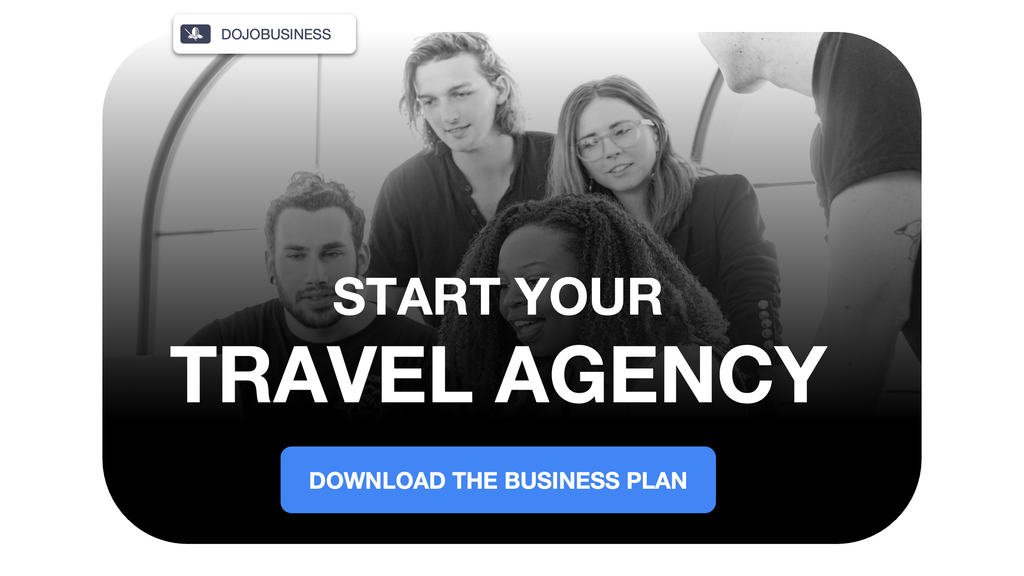
Have you ever envisioned launching your own travel agency but feel overwhelmed about where to start? You've landed in the perfect spot.
In the following paragraphs, we will guide you through a comprehensive sample business plan tailored for a travel agency.
As an aspiring entrepreneur, you're likely aware that a meticulously developed business plan is crucial for achieving success. It serves as a roadmap, outlining your vision, objectives, and strategies for your venture.
To craft an effective plan swiftly and with ease, you can utilize our travel agency business plan template. Additionally, our specialists are on hand to provide a free review and refinement of your plan.

How to draft a great business plan for your travel agency?
A good business plan for a travel agency must reflect the unique aspects of the travel industry.
To start, it is crucial to provide a comprehensive overview of the travel market. This includes up-to-date statistics and identifying emerging trends in travel, as illustrated in our travel agency business plan template .
Your business plan should then articulate your vision clearly. Define your target market (such as adventure travelers, luxury vacationers, corporate clients, or budget backpackers), and establish your travel agency's unique value proposition (specialized tours, personalized itineraries, eco-friendly travel, etc.).
Market analysis is the next important section. This requires a thorough understanding of the competitive landscape, travel trends, and consumer behavior.
For a travel agency, it is essential to detail the services you plan to offer. Describe your range of travel products - package tours, custom itineraries, travel insurance, booking services - and explain how they cater to the preferences and requirements of your target customers.
The operational plan is also vital. It should outline the location of your agency, the structure of your customer service and booking system, partnerships with travel providers, and the logistics of trip planning.
For a travel agency, it is important to highlight your expertise in destination knowledge, customer service excellence, and the ability to handle travel disruptions.
Then, delve into your marketing and sales strategy. How will you attract and retain clients? Consider promotional tactics, customer loyalty programs, and cross-selling opportunities (such as travel insurance or add-on excursions).
Embracing digital strategies, like maintaining a robust website or an active social media presence, is also critical in the digital age.
The financial plan is another crucial component. This should include your startup costs, revenue projections, operating expenses, and the point at which you will break even.
In a travel agency, margins can vary widely depending on the type of service, so precise financial planning and a solid understanding of your profit centers are essential. For assistance, refer to our financial forecast for a travel agency .
Compared to other business plans, a travel agency's plan must pay special attention to global travel trends, currency fluctuations, and the impact of international events on travel.
A well-crafted business plan will not only help you clarify your strategy and vision but also attract investors or secure loans.
Lenders and investors are looking for comprehensive market research, realistic financial projections, and a clear operational strategy for managing a travel agency.
By presenting a thorough and substantiated plan, you showcase your professionalism and dedication to the success of your travel agency.
To achieve these goals while saving time, you can complete our travel agency business plan template .

A free example of business plan for a travel agency
Here, we will provide a concise and illustrative example of a business plan for a specific project.
This example aims to provide an overview of the essential components of a business plan. It is important to note that this version is only a summary. As it stands, this business plan is not sufficiently developed to support a profitability strategy or convince a bank to provide financing.
To be effective, the business plan should be significantly more detailed, including up-to-date market data, more persuasive arguments, a thorough market study, a three-year action plan, as well as detailed financial tables such as a projected income statement, projected balance sheet, cash flow budget, and break-even analysis.
All these elements have been thoroughly included by our experts in the business plan template they have designed for a travel agency .
Here, we will follow the same structure as in our business plan template.

Market Opportunity
Market data and figures.
The travel industry is a dynamic and lucrative sector with significant growth potential.
Before the pandemic, the global travel and tourism market was valued at approximately 9.25 trillion U.S. dollars. While the industry faced a downturn due to COVID-19, it is expected to recover and grow in the coming years, driven by pent-up demand and increased consumer confidence.
In the United States alone, the travel and tourism industry contributes substantially to the economy, with millions of international and domestic travelers spending billions annually.
These figures underscore the travel industry's resilience and its critical role in global economic development.
The travel industry is experiencing a transformation, with current trends shaping the future of how people explore the world.
Sustainable travel is becoming increasingly important, with travelers seeking eco-friendly options and destinations that prioritize conservation and community impact.
Personalization and unique experiences are also in high demand, as travelers look for tailor-made itineraries and off-the-beaten-path adventures.
Technology plays a pivotal role, with virtual reality previews, mobile booking, and AI-powered personal assistants enhancing the travel experience.
Health and wellness tourism is on the rise, with destinations offering retreats and activities focused on physical and mental well-being.
Lastly, the demand for flexible booking options and comprehensive travel insurance has grown, as travelers seek security in uncertain times.
These trends highlight the evolving preferences of modern travelers and the need for travel agencies to adapt and innovate.
Success Factors
The success of a travel agency hinges on several critical factors.
Exceptional customer service is paramount, as personalized attention and expert advice can differentiate an agency in a crowded market.
Offering a diverse range of high-quality travel packages and services that cater to various preferences and budgets is also essential.
A strong online presence, with an intuitive booking platform and engaging content, can attract and retain customers in the digital age.
Strategic partnerships with reputable service providers, such as hotels and airlines, can enhance the value proposition and provide competitive pricing.
Lastly, the ability to adapt to industry changes and embrace new trends, such as sustainable travel and wellness tourism, is crucial for long-term success.
The Project
Project presentation.
Our travel agency project is designed to cater to the needs of modern travelers who seek unique and personalized travel experiences. Situated in a convenient location with a strong online presence, our agency will specialize in crafting tailor-made itineraries for individuals, families, and groups. We will focus on providing exceptional travel packages that include gluten-free dining options, ensuring that travelers with dietary restrictions can enjoy their journeys without compromise.
We aim to offer a seamless travel experience, from the planning stage to the return home, with an emphasis on customer satisfaction and attention to detail.
Our travel agency is set to become a go-to resource for those who value health-conscious travel options, as well as for adventurers looking to explore the world with the assurance of their dietary needs being met.
Value Proposition
The value proposition of our travel agency is centered around delivering personalized and health-conscious travel experiences. We understand the challenges faced by travelers with dietary restrictions and are dedicated to providing gluten-free solutions as part of our travel packages.
Our commitment to customization, combined with our expertise in identifying gluten-free friendly accommodations and restaurants, offers peace of mind and an enjoyable travel experience to our clients.
We are dedicated to creating travel itineraries that not only meet the dietary needs of our customers but also enrich their lives through cultural immersion and adventure.
Our agency strives to be a leader in the niche market of health-conscious travel, offering innovative solutions and educational resources that empower our clients to travel freely and safely.
Project Owner
The project owner is a seasoned travel professional with a passion for exploring the world and a deep understanding of the challenges faced by travelers with dietary restrictions.
With years of experience in the travel industry and a personal commitment to healthy living, the owner is well-equipped to guide the agency in providing top-notch, gluten-free travel experiences.
Driven by a vision to make travel accessible and enjoyable for all, regardless of dietary needs, the owner is dedicated to building a travel agency that stands out for its personalized service, health-conscious options, and commitment to customer satisfaction.
With a blend of industry knowledge and a personal touch, the project owner is the driving force behind this innovative travel agency, aiming to transform the way people with dietary restrictions experience the world.
The Market Study
Market segments.
The market segments for this travel agency are diverse and cater to various customer needs.
First, there are adventure seekers looking for unique and off-the-beaten-path travel experiences, who value personalized itineraries.
Next, there are luxury travelers who desire premium, all-inclusive vacation packages with high-end accommodations and exclusive services.
The market also includes budget-conscious travelers who seek affordable yet memorable trips, often in groups or as solo travelers.
Finally, corporate clients represent a significant segment, requiring professional travel arrangements for business trips, conferences, and team-building retreats.
SWOT Analysis
A SWOT analysis of this travel agency project highlights several key factors.
Strengths include a knowledgeable team with expertise in travel planning, strong partnerships with service providers, and a commitment to customer satisfaction.
Weaknesses might involve the volatility of the travel industry, dependency on economic factors, and the challenge of maintaining competitive pricing.
Opportunities can be found in the growing trend of experiential travel, the potential for digital marketing to reach a global audience, and the ability to offer niche travel packages.
Threats include unpredictable global events affecting travel, such as pandemics or political instability, and the intense competition from online travel agencies and direct booking platforms.
Competitor Analysis
Competitor analysis in the travel agency sector indicates a highly competitive landscape.
Direct competitors include other local and online travel agencies, as well as larger travel companies with extensive marketing budgets.
These competitors strive to capture the attention of various traveler demographics by offering deals, loyalty programs, and comprehensive travel services.
Potential competitive advantages for our agency include personalized customer service, unique travel packages, expertise in niche markets, and strong relationships with reputable service providers.
Understanding the strengths and weaknesses of competitors is crucial for crafting strategies that emphasize our unique selling propositions and foster customer loyalty.
Competitive Advantages
Our travel agency's competitive edge lies in our personalized approach to crafting travel experiences that resonate with individual client preferences.
We offer tailored travel solutions, from adventure tours to luxury getaways, ensuring that each trip is a perfect fit for our clients' desires and budgets.
Our dedication to customer service excellence allows us to build lasting relationships with our clients, securing repeat business and referrals.
We also pride ourselves on our insider knowledge of destinations, which enables us to provide exclusive experiences not readily available through other channels.
You can also read our articles about: - how to start a travel agency: a complete guide - the customer segments of a travel agency - the competition study for a travel agency
The Strategy
Development plan.
Our three-year development plan for the travel agency is designed to cater to the evolving needs of modern travelers.
In the first year, we will concentrate on building a robust online presence and developing personalized travel packages that cater to niche markets, including eco-tourism and adventure travel.
The second year will focus on establishing partnerships with airlines, hotels, and tour operators to offer exclusive deals and expanding our service offerings to include corporate and group travel.
In the third year, we aim to enhance our customer service with the introduction of a mobile app for itinerary management and real-time travel assistance, as well as exploring the possibility of opening branch offices in key cities.
Throughout this period, we will remain dedicated to providing exceptional travel experiences, maintaining strong customer relationships, and staying ahead of industry trends.
Business Model Canvas
The Business Model Canvas for our travel agency targets a diverse range of customers, from solo travelers and families to corporate clients and adventure seekers.
Our value proposition is centered on delivering tailor-made travel experiences, exceptional customer service, and competitive pricing.
We offer our services through a user-friendly online platform, complemented by personalized consultation from our travel experts.
Key activities include travel planning, booking management, and customer support.
Our revenue streams are generated from service fees, commission from partners, and premium travel package sales, while our costs are associated with marketing, technology infrastructure, and staff salaries.
Find a complete and editable real Business Model Canvas in our business plan template .
Marketing Strategy
Our marketing strategy is built on creating memorable travel experiences and establishing a reputation for reliability and customer satisfaction.
We plan to engage with our target audience through storytelling and sharing travel success stories across various digital platforms.
Partnerships with travel influencers and the use of targeted advertising will help us reach a wider audience.
We will also offer loyalty programs and referral incentives to encourage repeat business and word-of-mouth recommendations.
Lastly, attending travel expos and networking events will allow us to build industry relationships and stay connected with market trends.
Risk Policy
Our risk policy focuses on mitigating risks associated with travel disruptions, customer satisfaction, and industry volatility.
We will offer flexible booking options and comprehensive travel insurance to protect our clients against unforeseen events.
Regular training for staff on the latest travel advisories and safety protocols will ensure informed and safe travel planning.
Prudent financial management and maintaining a diversified portfolio of travel products will help us navigate economic fluctuations.
We will also secure liability insurance to cover any potential travel-related disputes, prioritizing the safety and satisfaction of our clients.
Why Our Project is Viable
We are committed to launching a travel agency that adapts to the dynamic preferences of today's travelers.
With our focus on personalized experiences, customer care, and strategic partnerships, we are poised to capture a significant share of the travel market.
We are enthusiastic about making travel planning seamless and enjoyable, contributing to memorable journeys for our clients while growing a successful business.
We are flexible in our approach and ready to adapt to the ever-changing travel landscape, looking forward to a bright future in the travel industry.
You can also read our articles about: - the Business Model Canvas of a travel agency - the marketing strategy for a travel agency
The Financial Plan
Of course, the text presented below is far from sufficient to serve as a solid and credible financial analysis for a bank or potential investor. They expect specific numbers, financial statements, and charts demonstrating the profitability of your project.
All these elements are available in our business plan template for a travel agency and our financial plan for a travel agency .
Initial expenses for our travel agency include securing a prime location for our office, investing in robust travel booking software, creating an engaging website for online reservations, obtaining the necessary licenses and insurance, training staff on various travel destinations and customer service excellence, as well as costs related to brand creation and launching targeted marketing campaigns to reach our ideal clientele.
Our revenue assumptions are based on a thorough analysis of the travel market, considering trends in tourism, consumer vacation spending habits, and the unique value proposition of our personalized travel planning services.
We anticipate progressively increasing sales, starting modestly and growing as the reputation of our travel agency strengthens and our customer base expands.
The projected income statement indicates expected revenues from our travel booking commissions, service fees, and customized travel packages, minus the costs of operations (staff wages, office rent, marketing, utilities, etc.).
This results in a forecasted net profit essential for assessing the long-term viability of our travel agency.
The projected balance sheet reflects assets specific to our business, such as office equipment, software, and prepaid travel inventory, and liabilities including debts and anticipated operational expenses.
It shows the overall financial health of our travel agency at the end of each fiscal period.
Our projected cash flow budget details incoming and outgoing cash flows, allowing us to anticipate our financial needs at any given time. This will enable us to manage our finances effectively and maintain a healthy cash reserve.
The projected financing plan lists the specific financing sources we plan to use to cover our startup expenses, such as business loans, investor capital, or personal savings.
The working capital requirement for our travel agency will be closely monitored to ensure we have the necessary funds to finance our daily operations, including marketing efforts, office expenses, and staff salaries.
The break-even point specific to our project is the level of sales needed to cover all our costs, including startup expenses, and begin generating a profit.
It will indicate when our business is expected to become financially sustainable.
Performance indicators we will track include the profit margin on our travel packages, the customer satisfaction rate to gauge service quality, the liquidity ratio to assess our ability to cover short-term obligations, and the return on investment to measure the efficiency of our capital invested in the agency.
These indicators will help us evaluate the financial health and overall success of our travel agency.
If you want to know more about the financial analysis of this type of activity, please read our article about the financial plan for a travel agency .
- Choosing a selection results in a full page refresh.
- Opens in a new window.
- Purchase History

Tourism Business Plan Templates

Choose your Tourism business plan template from the list below:
- Hotel Business Plan Template
- Bed and Breakfast Business Plan Template
- Travel Agency Business Plan Template
At Business and Plans, we offer a wide range of Tourism business plan templates to cater to your specific needs. Whether you are starting a Hotel, Bed and Breakfast, or Travel Agency, we’ve got you covered. Our professionally designed templates will save you time and ensure your business is set up for success. Browse through our selection below and choose the perfect template to kickstart your journey in the booming tourism industry.
Welcome to Your Gateway for Success in Tourism Business!
Unlock the Potential of Your Hospitality Venture with Our Expertly Crafted Tourism Business Plan Templates.
Are you ready to elevate your hotel, bed and breakfast, or travel agency to new heights of success? At Business & Plans, we understand the unique challenges and opportunities that the tourism industry presents. That’s why we’ve curated a collection of comprehensive and professionally designed tourism business plan templates to guide you on your journey to prosperity.
Why Invest in a Tourism Business Plan?
1. strategic roadmap:.
Our meticulously crafted templates serve as your strategic roadmap, helping you navigate the competitive landscape of the tourism industry. Whether you’re starting a new venture or looking to revitalize your existing business, a solid business plan is your foundation for success.
2. Investor Confidence:
Attracting investors is a key step in expanding your tourism business. A well-structured business plan not only demonstrates your commitment but also instills confidence in potential investors. Showcase your vision, market analysis, and financial projections with our templates to secure the support you need.
3. Operational Efficiency:
Efficient operations are crucial in the tourism sector. Our business plan templates guide you through operational strategies, from optimizing booking processes to enhancing customer service, ensuring that your business runs smoothly and exceeds customer expectations.
Why Choose Our Templates?
- Expertly Crafted: Our templates are created by industry experts with years of experience in the tourism sector.
- Customizable: Tailor each template to suit the unique aspects of your business, ensuring a personalized approach.
- Comprehensive Guidance: Step-by-step guidance to help you fill in every section of the business plan with confidence.
- Up-to-Date Insights: Benefit from the latest trends and insights in the tourism industry to stay ahead of the competition.
Invest in the success of your tourism business today! Browse our collection of business plan templates and take the first step toward achieving your business goals. At Business & Plans, we’re committed to your success in the dynamic world of tourism.

Beginners Guide to Starting a Tourism Business
Your Beginners Guide to Starting a Tourism Business
Writing for WikiHow, Claire Fess provides eight steps on how to start a tourism business .
Table of Contents
Definition: Tourists are people who travel outside of their home-base environments in order to spend time visiting a different environment in either a business or leisure capacity. Both vacationers and those on business trips are considered tourists, and they may be touring either domestically (within their home country) or internationally. A tourism business is any business that centers on catering to tourists’ needs.

Step 1: Decide on which sector of tourism you would like to focus.
You have several options to choose from when it comes to establishing a business in tourism :
- Transportation service. This sector involves transporting tourists to, from and around the tourist destination.
- Travel agencies. Travel agencies are the 1-stop-shop for everything involved with visiting a place, including transportation, accommodations and attractions.
- Tour Operator. A tour operator typically combines tour and travel components to create a holiday. They prepare an itinerary.
- Destination Management Company . A DMC possesses extensive local knowledge, expertise and resources, specialising in the design and implementation of events, activities, tours, transportation and program logistics.
- Accommodation. These include hotels, guesthouses, bed and breakfasts, hostels, rental houses, lodges and any other place tourists may stay while travelling.
- Guided tours and tourist guide. A guided tour service or professional tourist guide is a tourism business that specializes in providing informative and entertaining tours through an area’s local attractions.
- Hospitality. A hospitality business pertains to any food or beverage establishment that tourists may frequent.
Step 2: Take your geographical location into account.
Your local tourist attractions are good indicators of what would and would not make a successful tourism business venture. For example, if your area is secluded from the populace and dense with wineries, then guided winery tours, local bed and breakfasts, and airport transportation services are all viable business options.
Step 3: Size up the competition.
Thoroughly research the tourism businesses in your area before you decide which business in tourism is right for you. You will want to choose a tourism sector that is not overly congested, and one that you can contribute something unique to.
Step 4: Write a business plan.
Your business plan is the blueprint for your tourism business, and should include the following sections:
- Executive summary. Describe your business’s purpose, name, location, personnel needs, tourism business management staff, market sector, competition, marketing plan and financial projections.
- Tourism business summary. This should detail how the business’s ownership will be distributed and the start up requirements (funding, assets and location).
- Products and/or services. You need to outline the products and/or services your business will be providing for tourists.
- Analysis of the market. Provide information about your target market and your competition. Tourism business strategy. Describe how you plan on running your business, marketing your business and pricing your product or service.
- Financial summary. State your projections for your business’s expenses and income.
Step 5: Procure the necessary funds.
Present your business plan to potential lenders and/or business partners in order to obtain the start up and operating capital you will need to run your business in tourism.
Step 6: Select a business location.
If you plan to operate a walk-in travel agency or an accommodation establishment, there are 3-things to consider. They are location, location, and location!
Step 7: Obtain all applicable business licenses.
Get the necessary business licensing through your local government’s business regulatory agency.
Step 8: Market your tourism business :
- Use social networking sites . Set up accounts/pages on free social networking sites such as Linked In .
- Create a website for your tourism business. Be sure to hire a specialist for search engine optimization (SEO) in order to maximize your site’s online presence. List your business on all applicable online directories and review websites.
- Advertise in print mediums. Take out ad space in newspapers, magazines and trade/lifestyle publications.
Source: www.wikihow.com/Develop-a-Tourism-Business
Read more on this topic:
- 10 Steps To Starting Your Own Tourist Transport Business
- How To Streamline Your Tour Operator Business
- 10 Tips on Selecting Tour Operator Software
- 10 Tips on Tour Quoting
- How to Keep Tour Itineraries Current
- So you want to be a tour operator?
- The Role of Tour Operators in Safari Bookings
- 13 Tips to surviving as a Small Tourism Business
- Effective Sales Secrets For Small Businesses
Tourism Tattler
Related articles.

Western Cape Birding Route upgrade project seeks R1.4m
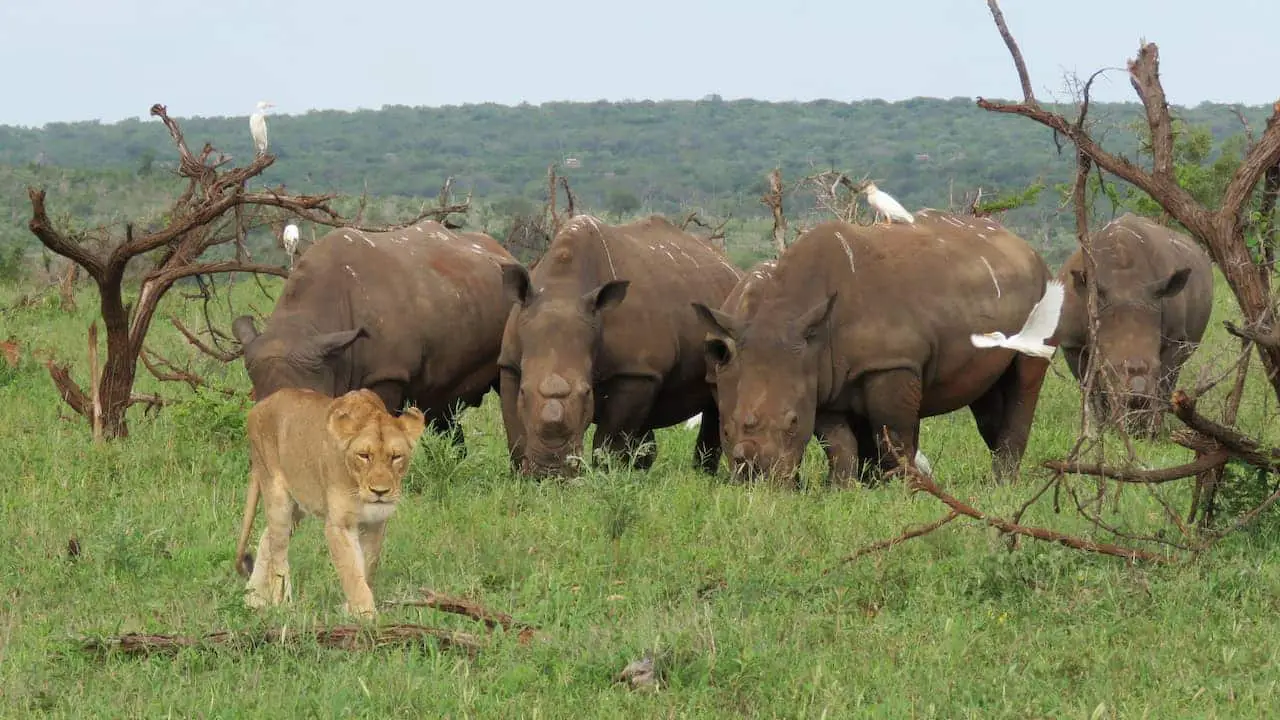
Beyond the Limits of Cash or Credit

Arrivals & Hotel STR Statistics

SATSA MIR August 2016
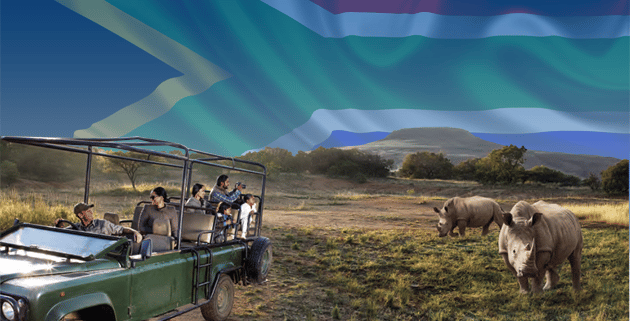
Privacy Overview
| Cookie | Duration | Description |
|---|---|---|
| cookielawinfo-checkbox-analytics | 11 months | This cookie is set by GDPR Cookie Consent plugin. The cookie is used to store the user consent for the cookies in the category "Analytics". |
| cookielawinfo-checkbox-functional | 11 months | The cookie is set by GDPR cookie consent to record the user consent for the cookies in the category "Functional". |
| cookielawinfo-checkbox-necessary | 11 months | This cookie is set by GDPR Cookie Consent plugin. The cookies is used to store the user consent for the cookies in the category "Necessary". |
| cookielawinfo-checkbox-others | 11 months | This cookie is set by GDPR Cookie Consent plugin. The cookie is used to store the user consent for the cookies in the category "Other. |
| cookielawinfo-checkbox-performance | 11 months | This cookie is set by GDPR Cookie Consent plugin. The cookie is used to store the user consent for the cookies in the category "Performance". |
| viewed_cookie_policy | 11 months | The cookie is set by the GDPR Cookie Consent plugin and is used to store whether or not user has consented to the use of cookies. It does not store any personal data. |

- PRO Courses Guides New Tech Help Pro Expert Videos About wikiHow Pro Upgrade Sign In
- EDIT Edit this Article
- EXPLORE Tech Help Pro About Us Random Article Quizzes Request a New Article Community Dashboard This Or That Game Popular Categories Arts and Entertainment Artwork Books Movies Computers and Electronics Computers Phone Skills Technology Hacks Health Men's Health Mental Health Women's Health Relationships Dating Love Relationship Issues Hobbies and Crafts Crafts Drawing Games Education & Communication Communication Skills Personal Development Studying Personal Care and Style Fashion Hair Care Personal Hygiene Youth Personal Care School Stuff Dating All Categories Arts and Entertainment Finance and Business Home and Garden Relationship Quizzes Cars & Other Vehicles Food and Entertaining Personal Care and Style Sports and Fitness Computers and Electronics Health Pets and Animals Travel Education & Communication Hobbies and Crafts Philosophy and Religion Work World Family Life Holidays and Traditions Relationships Youth
- Browse Articles
- Learn Something New
- Quizzes Hot
- This Or That Game
- Train Your Brain
- Explore More
- Support wikiHow
- About wikiHow
- Log in / Sign up
- Finance and Business
- Business by Industry
- Hospitality and Tourism Businesses
How to Develop a Tourism Business
Last Updated: February 16, 2024 Approved
This article was co-authored by Jessica Villegas . Jessica Villegas is a Certified Academic Life Coach and the Founder of Hi-Lite Coaching + Consulting in Winter Garden, Florida. Jessica has over 20 years of leadership experience, and she and her team serve teens and young adults through private coaching, group coaching, workshops, and speaking engagements. She uses workbook exercises, coaching planners, and regular check-ins to support young adults in achieving their academic and personal goals. Jessica received her Bachelor’s in Organizational Communications and Leadership Studies from the University of Central Florida and her Professional Coaching certification through Coach Training EDU, an ICF Accredited Institution, as an Academic Life Coach. wikiHow marks an article as reader-approved once it receives enough positive feedback. This article received 23 testimonials and 100% of readers who voted found it helpful, earning it our reader-approved status. This article has been viewed 356,330 times.
A tourism business is a great way to share your passion with others looking to experience a new location or culture, be it in a business or leisure capacity. To develop a tourism business, you need to first decide on your focus and create a business plan. Afterwards, you can move on to marketing and growing your business.
Selecting Your Businesses Focus

- Don't be afraid to send your customers to other businesses—it shows that you know the area well and are dedicated to ensuring they have the best time possible.
- Use your chosen geographic region to guide your focus. For example, if your location is secluded from the populace and dense with wineries, then guided winery tours, local bed and breakfasts, and airport transportation services are all viable business options.

- Imagine how your hotel would look and how it would stand out.
- Ask local business owners about their experience in the industry to get a feel for their day-to-day activities and how they succeed.

- Book a tour with a local agency and get a feel for what they offer. Take note of their pricing and routes.

- Compare the busiest restaurants to the slowest. Ask yourself what they are doing differently and how they could improve.

- For example, you might find that all hotels offer complimentary breakfast, so be sure to offer this. But if you find that none of them offer complimentary dinner, you can offer this to set yourself apart.
- Pinpoint a tourism sector that is not overly congested, and one that you can contribute something unique to.

- For example, if you want to focus on providing tours, decide on a location that you know well in terms of its history, food, and entertainment. If you think hospitality is your calling, decide on the type of foods and beverages that you want to provide to tourists.
- List the contacts that you have within each niche to get a better idea of which one you have the most connections in.
Setting the Foundation for Your Business

- If you provide tours in natural areas, you will likely need specific permits for each region or park.

- Determine if you must carry disability, unemployment, or other types of insurance for your employees.

- Include an outline of the products and/or services your business will be providing for tourists.
- Provide information about your target market and your competition.
- Describe how you plan on running your business and pricing your product or service

- Employee benefits

- Apply for a small business loan or grant if you find that you're low on funds. Visit Grants.gov ( https://www.grants.gov/ ) for a list of grants available around the world, or visit your bank and inquire about loans.
Marketing Your Tourism Business

- Run local promotions for your peers and their family and friends.

- Take out ad space in newspapers, magazines and lifestyle publications.
- Produce all applicable marketing materials, such as logos, regular newsletters, and business cards.

- Be sure to hire a specialist for search engine optimization (SEO) to maximize your site's online presence.

- Stay connected to local tourism industry councils and relevant media and trade organizations.
Growing Your Business

- Post ads on classified websites. Be sure to indicate the skills and experience you are looking for.
- Select employees that are familiar with your business. Remember that you always want to offer your customers a personalized, engaging experience.
- Plan your staff as far ahead as you possibly can. Be sure to plan extra carefully for busy times of the year.
- To make your business work, you really need to invest in your employees. It starts with the mission, vision, and values of the company and how those are permeated throughout your employees and how you deliver that and how you show up as that.

- Track competitor products, prices, and value regularly.

- Create gift cards, promo codes, and vouchers for your customers.

- Make it your primary goal to deliver on your promises and address every customer issue personally.
- Encourage your customers to leave their feedback on social media services.

- Always tell your customers about other sights in the area and tourism businesses close to yours that they can experience while in the area.
- Tell your customers about package deals, sales, and discounts.
- Send customers a follow-up email to thank them for choosing your business and make them feel welcome to return at any time!

- Plan different packages for different times of the year.
- Consider your audience when creating packages. Offer them things that make the experience more enjoyable and convenient.
- Look at packages from competing businesses and try to offer something that they don't.
Community Q&A
You Might Also Like

- ↑ https://smallbusinessbc.ca/article/strategies-start-grow-tourism-business/
- ↑ https://www.business.qld.gov.au/industries/hospitality-tourism-sport/tourism/starting-up/regulations/licences-permits-legislation
- ↑ https://www.business.qld.gov.au/running-business/employing/taking-on-staff/find/assess
- ↑ https://www.rezdy.com/blog/3-costs-you-need-to-consider-when-pricing-your-tourism-product/
- ↑ https://www.capterra.com/tour-operator-software/
- ↑ https://www.iti.gov.nt.ca/sites/iti/files/ProductPackaging.pdf
About This Article

Developing a tourism business is a great way to make a profit while sharing your love of different cultures with new people. A tourism business is any business that caters to tourists, like hospitality, food, and local tours. You’ll need to choose a lucrative niche with little competition to make sure there's space in the market for your business. Choose a location you know well and an industry you have experience in. Unless you already have funding for your business, you’ll need to secure a small business loan, grant, or private investment. You'll also need to write a business plan to present to investors and help you plan your next steps. For more tips, including how to market your tourism business, read on! Did this summary help you? Yes No
- Send fan mail to authors
Reader Success Stories
LINDA HOPKINS
Jul 16, 2017
Did this article help you?
Sahil Rithwan
Mar 8, 2017
Roslan Ismail
Mar 10, 2017
Zendmene Erdenetsogt
Jul 27, 2016
Shivo Chimbonda
Apr 26, 2017

Featured Articles

Trending Articles

Watch Articles

- Terms of Use
- Privacy Policy
- Do Not Sell or Share My Info
- Not Selling Info
Get all the best how-tos!
Sign up for wikiHow's weekly email newsletter
Become a Member Enquire now
- Stay Ahead of The Industry With Pre-made Templates & Resources
- Business Planning
Business Plan (Template)
A good business plan can help your business secure finance, define the direction of your business, and create strategies to achieve your goals. A thorough and effective tourism business plan will include an executive summary, a business description, short and long term goals, business structure (legal and internal management structure), product or service description, a sales and marketing plan and financials to date. This Business Plan template steps you through the process of creating a solid, well-structured plan tailored to your business.
If you are preparing or updating your business plan for internal uses, the Business Plan template may be more than you require. The four critical documents to review and complete/update are:
Goals and Strategies
SWOT Analysis (Template)
Marketing Plan (Template)
Action Plan (Template)
Join or login for full access to member content
Subscribe to our free newsletter.
Keep up to date with all the latest news from Tourism Council WA.

To learn more about how becoming a Tourism Council WA member can elevate your business, get in touch with our friendly team.
Contact Info
+61 (08) 9416 0700
1 Resort Drive, Burswood, WA 6100
Upcoming events
- Tourism Connect (Kalgoorlie)
- Tourism Connect (Geraldton)
- Tourism Connect (Margaret River)
- 2024 Perth Airport WA Tourism Awards Gala Dinner
- 2025 Perth Airport WA Tourism Conference

Free Download
Travel Tour Agency Business Plan Template
Download this free travel tour agency business plan template, with pre-filled examples, to create your own plan..
Or plan with professional support in LivePlan. Save 50% today
Available formats:
What you get with this template
A complete business plan.
Text and financials are already filled out and ready for you to update.
- SBA-lender approved format
Your plan is formatted the way lenders and investors expect.
Edit to your needs
Download as a Word document and edit your business plan right away.
- Detailed instructions
Features clear and simple instructions from expert business plan writers.
All 100% free. We're here to help you succeed in business, no strings attached.
Get the most out of your business plan example
Follow these tips to quickly develop a working business plan from this sample.
1. Don't worry about finding an exact match
We have over 550 sample business plan templates . So, make sure the plan is a close match, but don't get hung up on the details.
Your business is unique and will differ from any example or template you come across. So, use this example as a starting point and customize it to your needs.
2. Remember it's just an example
Our sample business plans are examples of what one business owner did. That doesn't make them perfect or require you to cram your business idea to fit the plan structure.
Use the information, financials, and formatting for inspiration. It will speed up and guide the plan writing process.
3. Know why you're writing a business plan
To create a plan that fits your needs , you need to know what you intend to do with it.
Are you planning to use your plan to apply for a loan or pitch to investors? Then it's worth following the format from your chosen sample plan to ensure you cover all necessary information.
But, if you don't plan to share your plan with anyone outside of your business—you likely don't need everything.
More business planning resources

How to Create a Business Plan Presentation

Industry Business Planning Guides

How to Write a Business Plan for Investors

10 Qualities of a Good Business Plan

Business Plan Template

How to Start a Business With No Money

How to Write a Business Plan

Simple Business Plan Outline
Download your template now
Need to validate your idea, secure funding, or grow your business this template is for you..
- Fill-in-the-blank simplicity
- Expert tips & tricks
We care about your privacy. See our privacy policy .
Not ready to download right now? We'll email you the link so you can download it whenever you're ready.
Download as Docx
Download as PDF

Finish your business plan with confidence
Step-by-step guidance and world-class support from the #1 business planning software

The quickest way to turn a business idea into a business plan
Fill-in-the-blanks and automatic financials make it easy.
No thanks, I prefer writing 40-page documents.

Discover the world’s #1 plan building software
We've detected unusual activity from your computer network
To continue, please click the box below to let us know you're not a robot.
Why did this happen?
Please make sure your browser supports JavaScript and cookies and that you are not blocking them from loading. For more information you can review our Terms of Service and Cookie Policy .
For inquiries related to this message please contact our support team and provide the reference ID below.
| Advertisement |
Barcelona, Spain, to ban short-term rentals

June 30 (UPI) -- Barcelona, Spain, will ban short-term rentals by 2028, prompted by concerns that locals are being pushed out of the housing markets by companies such as Airbnb and Booking.com. city officials have announced.
"In Barcelona, we prioritize housing," Barcelona Mayor Jaume Collboni said in a video posted to Facebook. Advertisement
"We want to guarantee the right to live in our city and deal effectively with the housing crisis we are suffering. That is why today we have announced important measures: No tourist apartment in Barcelona."
- Colorado introduces new solutions to the housing crisis
- Airbnb unveils new service that allows tenants to sublease apartments for cash
- Airbnb makes temporary party house ban permanent
"With these structural measures, we will expand the residential area and the supply of affordable housing," he said, calling it "essential" to curb the unaffordable price hikes and prevent any Barcelona residents from having to leave the city where they want to live.
The city will stop issuing new licenses to properties in November 2028 and not renew existing permits. That means that from 2029 no homes will have permission to be rented as accommodations for tourists. Advertisement
"This measure will not change the situation from one day to the next," Collboni added. "These problems take time. But with this measure, we are marking a turning point."
Despite the economic benefit that tourism has provided, Collboni argued it has driven up rental costs by 68% in the last decade, and driven down the available supply of apartments and other homes. Data show that housing costs have jumped by 38% over the same period.
Barcelona's short-term rental numbers have remained stagnant for years, though, according to data from Barcelona City Hall , hovering at about 10,000 since 2014, even as housing prices have continued to increase.
Rent prices in Barcelona increased 14 percent over the past year, and are the highest among Spanish cities.
The city's data show around 850,000 homes exist in Barcelona, making the 10,000 or so short-term rentals a fraction of the total housing market.
Cities in other European countries, including London, Dublin, Amsterdam, and Paris have placed some sort of restriction on short-term rentals, including restricting the number of nights an apartment can be rented.
Latest Headlines

Trending Stories

The last time we traveled as a family of 6, we spent $6000. I refuse to make the same mistake this summer.
- I'm a mom of four kids and my family hadn't been on a real vacation for years until last year.
- For a five day vacation, we spent $6,000, and so this year we are staying local.
- I'm finding ways to keep the kids entertained, from picking themes to getting season passes.

Last summer, my family of six went on vacation to a Florida beach . We hadn't been on a "real vacation" since before the pandemic. Despite having free flights by using credit card rewards, between the rental car, food (most of which we prepared and ate at the rental), and condo costs, as well as limiting our vacation to five days instead of a week, we dropped close to $6000.
Summer has barely started, and my social media feed is flooded with friends and family members' vacation pics . Unlike them, we will not be going on vacation this year.
Instead, we've figured out how to vacation from or close to home. Here are my tips for the families, like mine, who can't travel this summer .
Take advantage of local, outdoor fun
Along with your kids, research local nature centers, hiking or biking trails, and cool parks (splash pad, anyone?) in neighboring towns.
Getting out in nature is almost always free, exposes everyone to fresh air and sunshine, and allows for new adventures. Don't have bikes? Rent them. Need binoculars? Borrow them. I know, for example, that our local library offers loanable fishing poles to patrons.
Plan a staycation
What's the closest major city to your family? Find a hotel (with a pool, of course), research restaurants and entertainment spots and you've got a low-budget staycation.
Related stories
One year, we staycationed in St. Louis. We rented a large, historical home (it had a ballroom!) for less than $250 a night. It had a kitchen, so we had breakfast and lunch "at home" every day, and enjoyed dinner out at St. Louis-famous restaurants at night. We took our kids to the ever-popular City Museum. To this day, our kids still say this was their favorite vacation.
Pick a theme
What's something your family enjoys? Mine loves ice cream. A theme can set the mood for the summer, such as finding and trying ice cream shops. Decide how often your crew would like to embark on your themed-adventure and get some dates and places on the calendar.
Other theme ideas include sports, music, animals, movies, or art. Then plan your activities accordingly, out and about or at home.
Put ideas in a bowl and draw a surprise
Have each family member come up with closer-to-home activities. With parent approval, place ideas in a bowl. Once a week, draw an activity and do it. Ideas include seeing a movie, going to brunch, visiting a bookstore, enjoying a walking trail, packing a picnic, volunteering, visiting a family member. This can also be tasks like gathering and donating clothing, toys, and books.
Head to a family or friend's house
You know that one family member who is always telling you to come and stay anytime? Now is the time. Take them up on their offer to house your crew, just don't overstay your welcome. See their local sights and enjoy local restaurants. Clean up after yourselves, offer to buy dinner one night, and take the host a gift that's special to your geographical location: wine from a local winery, for example.
Get season passes
Season passes to a nearby theme park or kid-friendly museum or activity center can save you substantial money. For example, a theme park that is within an hour of our home offers season passes that would be paid for if our family of six visits the park just once during the entire summer (between admission tickets and parking).
Frame your summer fun planning as a positive, not as what you could be doing if you had more money and time. You "get" to do these things, an incredible opportunity. Set the tone for a family-fun summer, enjoying the process while saving money.
Watch: Marriott International's Tina Edmundson tells Insider that the travel mindset has changed since the pandemic
- Main content
- Share full article
Advertisement
Supported by
My First Trip to Norway, With A.I. as a Guide
Can artificial intelligence devise a bucket-list vacation that checks all the boxes: culture, nature, hotels and transportation? Our reporter put three virtual assistants to the test.

By Ceylan Yeğinsu
The assignment was clear: Test how well artificial intelligence could plan a trip to Norway, a place I’d never been. So I did none of my usual obsessive online research and instead asked three A.I. planners to create a four-day itinerary. None of them, alas, mentioned the saunas or the salmon.
Two assistants were, however, eager to learn more about me in order to tailor their initially generic recommendations, which they had spewed out within seconds. Vacay , a personalized travel planning tool, presented me with a list of questions, while Mindtrip , a new A.I. travel assistant, invited me to take a quiz. (ChatGPT, the third assistant, asked nothing.)
Vacay’s and Mindtrip’s questions were similar: Are you traveling solo? What’s your budget? Do you prefer hotels or Airbnbs? Would you rather explore the great outdoors or pursue a cultural experience?
Eventually, my chat sessions yielded what seemed like well-rounded itineraries, starting with one day in Oslo and moving on to the fjord region. Eventually, I locked down a trip that would combine the assistants’ information and go beyond a predictable list of sites.
This time around, my virtual planners were far more sophisticated than the simple ChatGPT interface I used last year on a trip to Milan. Though it offered more detailed suggestions for Norway, I ended up ditching ChatGPT in the travel-planning stage after it repeatedly crashed.
Vacay’s premium service, which starts at $9.99 per month, included in-depth suggestions and booking links, while Mindtrip, which is currently free, provided photos, Google reviews and maps. During the trip itself, each delivered instantaneous information by text and always asked if more specific details were needed. Sadly, only ChatGPT offered a phone app, whose information I found to be outdated (the $20-per-month premium version is more current).
We are having trouble retrieving the article content.
Please enable JavaScript in your browser settings.
Thank you for your patience while we verify access. If you are in Reader mode please exit and log into your Times account, or subscribe for all of The Times.
Thank you for your patience while we verify access.
Already a subscriber? Log in .
Want all of The Times? Subscribe .

IMAGES
VIDEO
COMMENTS
Step 2: Business Description. Provide detailed information about your tourism business. Describe your target market, the types of tours or services you'll offer, and your business structure (e.g., sole proprietorship, partnership, corporation). Also, discuss any partnerships with local businesses or organizations that will enhance your ...
1. Create a plan for your travel business. Make no mistake: No matter what industry you're in, a business plan is essential. You may not need a formal business plan if you're not seeking a loan or investment funding for your business, but don't skip it. Write a one-page business plan instead.
The U.S. travel agency industry is valued at $48.5B with more than 90,600 businesses in operation and over 318,600 employees nationwide. Factors currently driving industry growth include an increase in domestic tourism and travel for overnight trips, vacations, and business purposes.
P25,365. P20,958. P10,959. Cash at End of Period. P25,365. P46,323. P57,282. Download This Plan. Explore a real-world travel tour agency business plan example and download a free template with this information to start writing your own business plan.
Travel Tour Agency Business Plan. Sephats Tours intends to provide individual and group travel to leisure clients. Travel and tourism is a fun and rewarding industry. Starting with a good business plan will help you succeed in this exciting field. To get started, check out a sample business plan for an upscale travel agency, international ...
Writing a tour operator business plan is a crucial step toward the success of your business. Here are the key steps to consider when writing a business plan: 1. Executive Summary. An executive summary is the first section planned to offer an overview of the entire business plan. However, it is written after the entire business plan is ready and ...
How To Start A Tourism Business: Step-By-Step Instructions. 1. Formulate A Plan For Your Business. First, you need to develop a clear business plan. Before setting the entity up, you'll need a concise vision and understanding of what the business will look like and the direction it is going in. Here are some important aspects to cover:
The tourism industry, much like an uncharted terrain, necessitates a thorough exploration. Having a comprehensive game plan will prevent you from losing your bearings amid the wilderness. So, fasten your seatbelts and put on your thinking caps; it's time to traverse the exciting topography of creating a successful tourism business.
Travel Agency Business Plan Template. Written by Dave Lavinsky. Over the past 20+ years, we have helped over 10,000 entrepreneurs and business owners create business plans to start and grow their travel agencies. On this page, we will first give you some background information with regards to the importance of business planning.
In addition, highlight any milestones you have accomplished, such as the number of clients served, positive reviews, new travel agency openings, etc. 4. Conduct an Industry and Market Analysis. An industry and market analysis section is one of the most important ones in your travel agent business plan.
Tour Operator Business Plan Template. Your tour operator business plan should contain at least seven sections: an executive summary, a company overview, a description of your services, an analysis of your market, an implementation plan, a team summary, and a financial plan. You might have one or more appendices at the end, if you have ...
Even if you're creating your business plan for internal use only, conducting market analysis and research is an excellent way to gauge your position within your industry, identify areas of concern, and create an effective marketing strategy using the 7 Ps of Travel and Tourism Marketing. Things to consider in your market analysis include your ...
1. Business overview. This section of your tour operator/ tour agency business plan provides a holistic snapshot of your company, offering readers a clear understanding of your business's identity. Ideally, it should include the following: Business Name: Your business name should resonate with your target audience, conveying the essence of ...
The tourism industry, much like an uncharted terrain, necessitates a thorough exploration. Having a comprehensive game plan will prevent you from losing your bearings amid the wilderness. So, fasten your seatbelts and put on your thinking caps; it's time to traverse the exciting topography of creating a successful tourism business.
Travel Agency Business Plan Template & Guidebook. Whether you are looking to start a travel agency from the ground up or simply update your current business plan, the #1 Travel Agency Business Plan Template & Guidebook provides a comprehensive resource for entrepreneurs. The intuitive step-by-step guidebook walks through the process of creating ...
1.1 Objectives. Adventure Excursions Unlimited's objectives for the first three years of operation include: To create a service-based company whose #1 mission is exceeding customers' expectations. Capturing 25% market share of the high-end hard-adventure travel space. To develop a sustainable, profitable business.
Step 1: Researching the Tourism Industry. Before diving headfirst into the world of tourism, it is crucial to conduct thorough research on the industry. Understanding current trends, market demands, and potential challenges will provide you with a solid foundation for building your business.
A good business plan for a travel agency must reflect the unique aspects of the travel industry. To start, it is crucial to provide a comprehensive overview of the travel market. This includes up-to-date statistics and identifying emerging trends in travel, as illustrated in our travel agency business plan template. Your business plan should ...
At Business and Plans, we offer a wide range of Tourism business plan templates to cater to your specific needs. Whether you are starting a Hotel, Bed and Breakfast, or Travel Agency, we've got you covered. Our professionally designed templates will save you time and ensure your business is set up for success. Browse through our selection ...
Step 4: Write a business plan. Your business plan is the blueprint for your tourism business, and should include the following sections: Executive summary. Describe your business's purpose, name, location, personnel needs, tourism business management staff, market sector, competition, marketing plan and financial projections.
5. Procure the necessary funds. Present your business plan to potential lenders and/or business partners to obtain the startup and operating capital you will need to run your business in tourism. Be sure to tell them your plans for the future and why you think your business is needed.
A good business plan can help your business secure finance, define the direction of your business, and create strategies to achieve your goals. A thorough and effective tourism business plan will include an executive summary, a business description, short and long term goals, business structure (legal and internal management structure), product or service description, a sales and marketing ...
More than one-third of summer vacationers say they are willing to take on debt to pay for travel, according to a Bankrate report.
Follow these tips to quickly develop a working business plan from this sample. 1. Don't worry about finding an exact match. We have over 550 sample business plan templates. So, make sure the plan is a close match, but don't get hung up on the details. Your business is unique and will differ from any example or template you come across.
Barcelona plans to enact a citywide ban on all short-term rentals to address complaints that tourism is to blame for a local housing crisis and soaring rents.
Barcelona, Spain, will ban short-term rentals by 2028, prompted by concerns that locals are being pushed out of the housing markets by companies such as Airbnb and Booking.com. city officials have ...
One year, we staycationed in St. Louis. We rented a large, historical home (it had a ballroom!) for less than $250 a night. It had a kitchen, so we had breakfast and lunch "at home" every day, and ...
Vacay, a personalized travel planning tool, presented me with a list of questions, while Mindtrip, a new A.I. travel assistant, invited me to take a quiz. (ChatGPT, the third assistant, asked ...